Report from W. F. Rhinow to J. A. A. Burnquist, August 5,1920.
Images
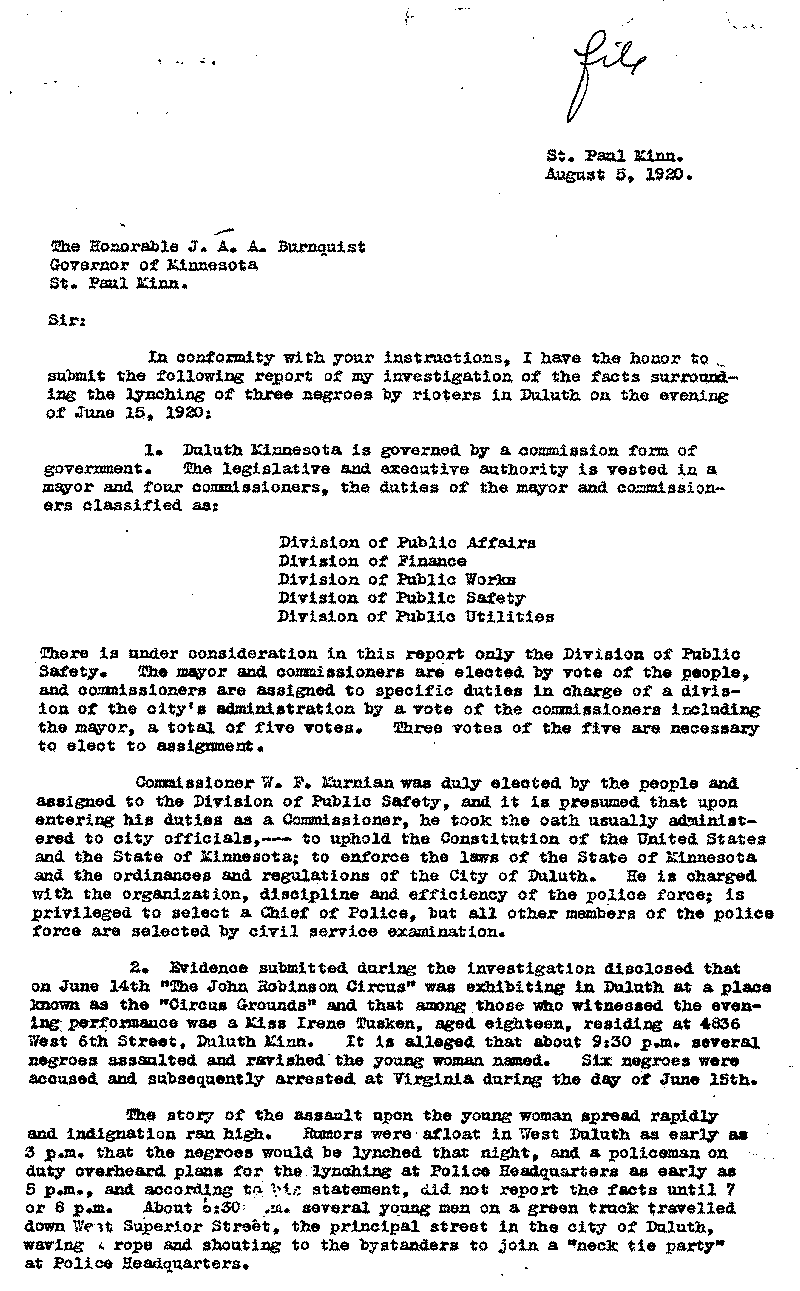
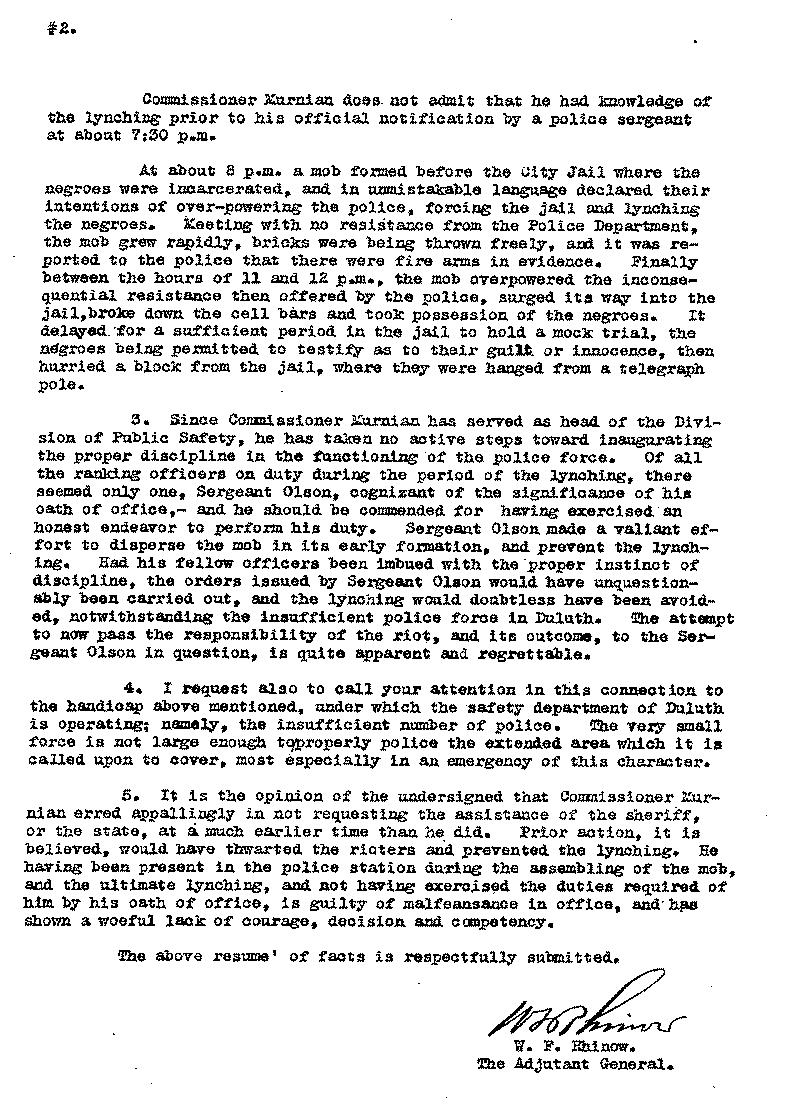
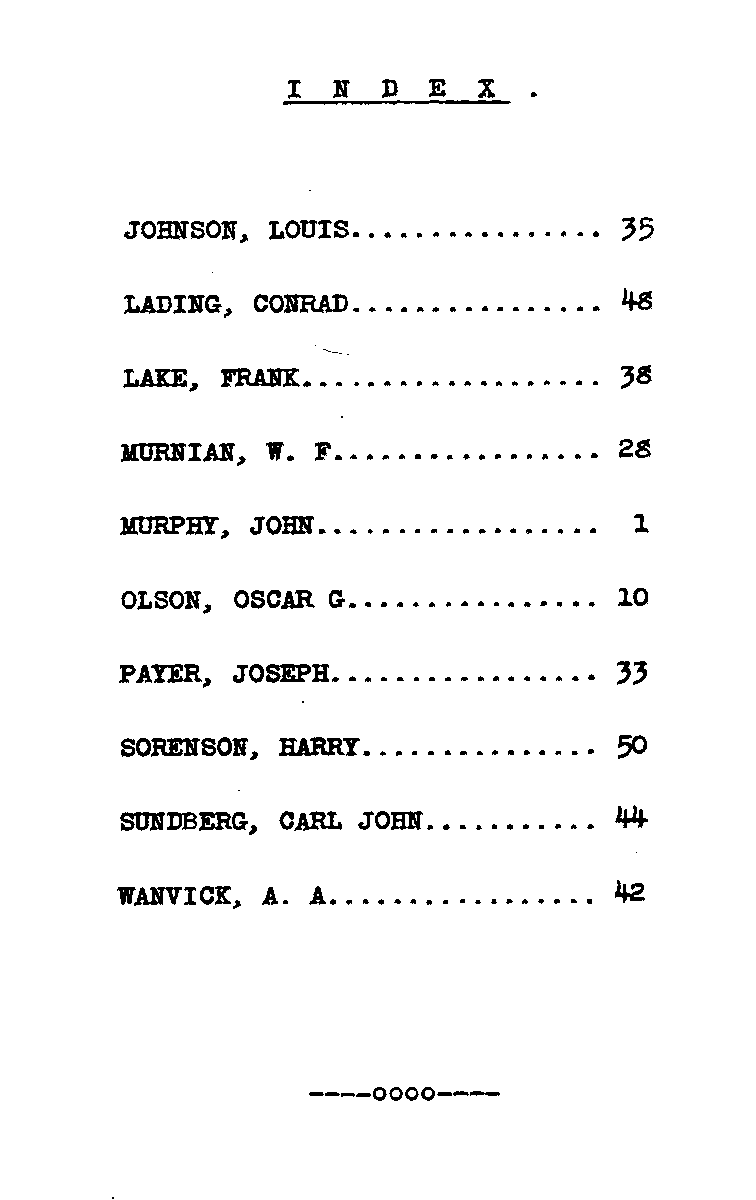
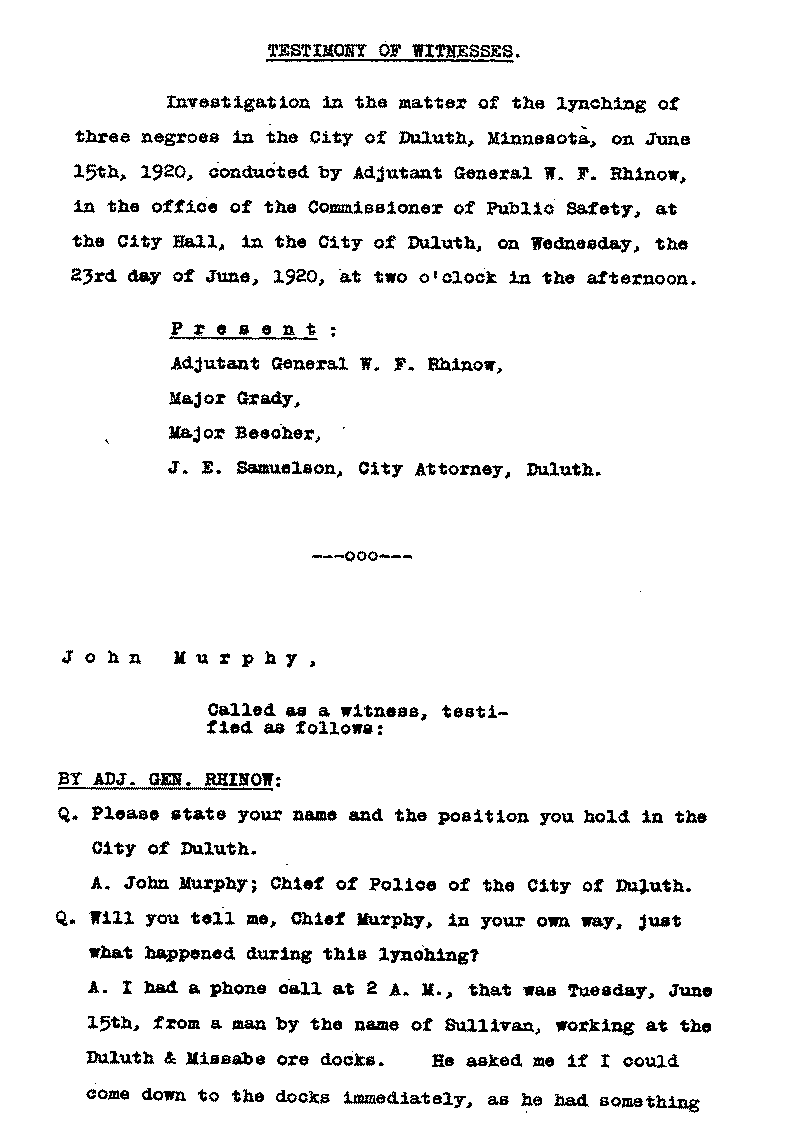
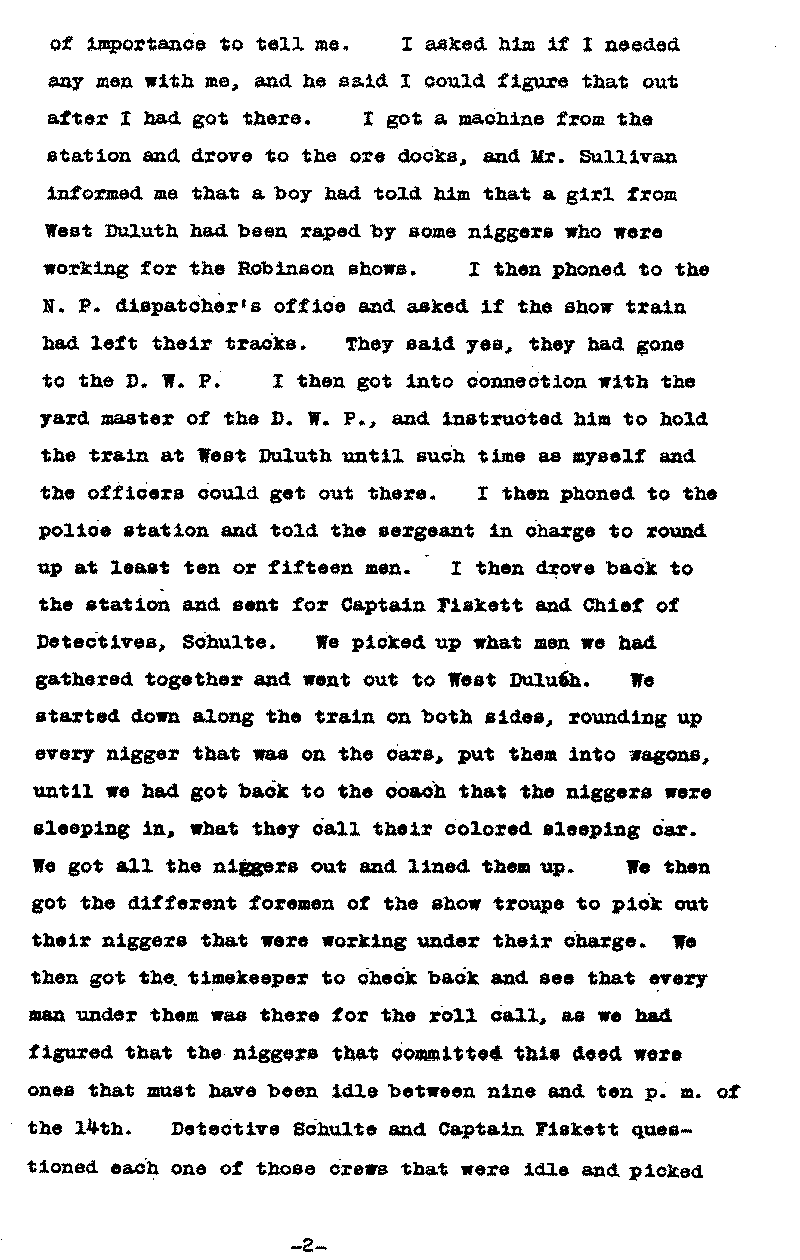
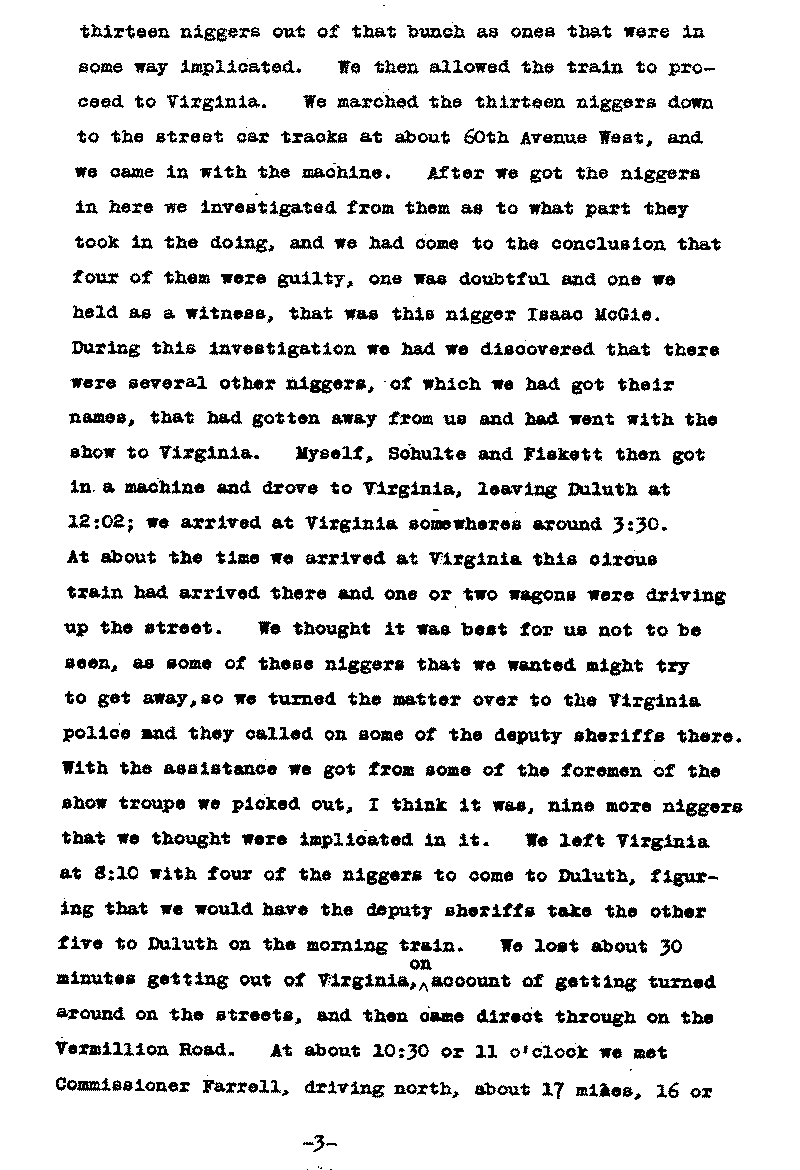
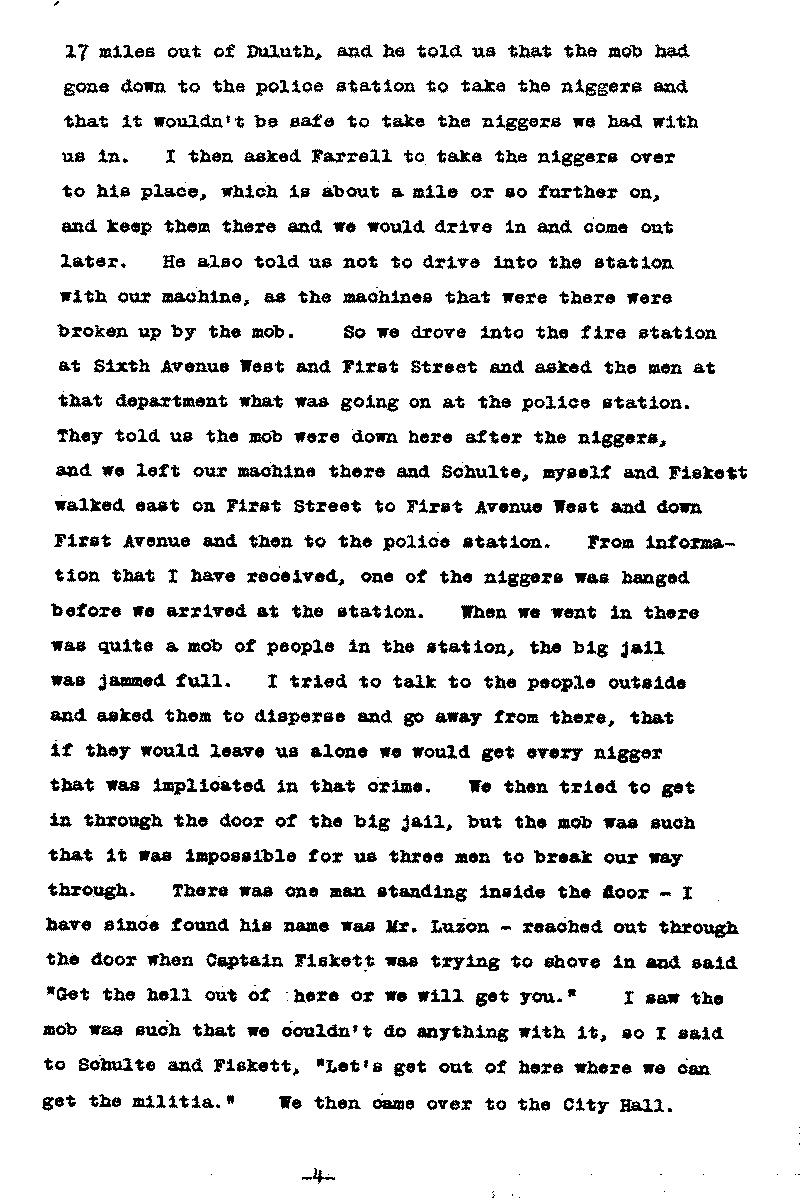
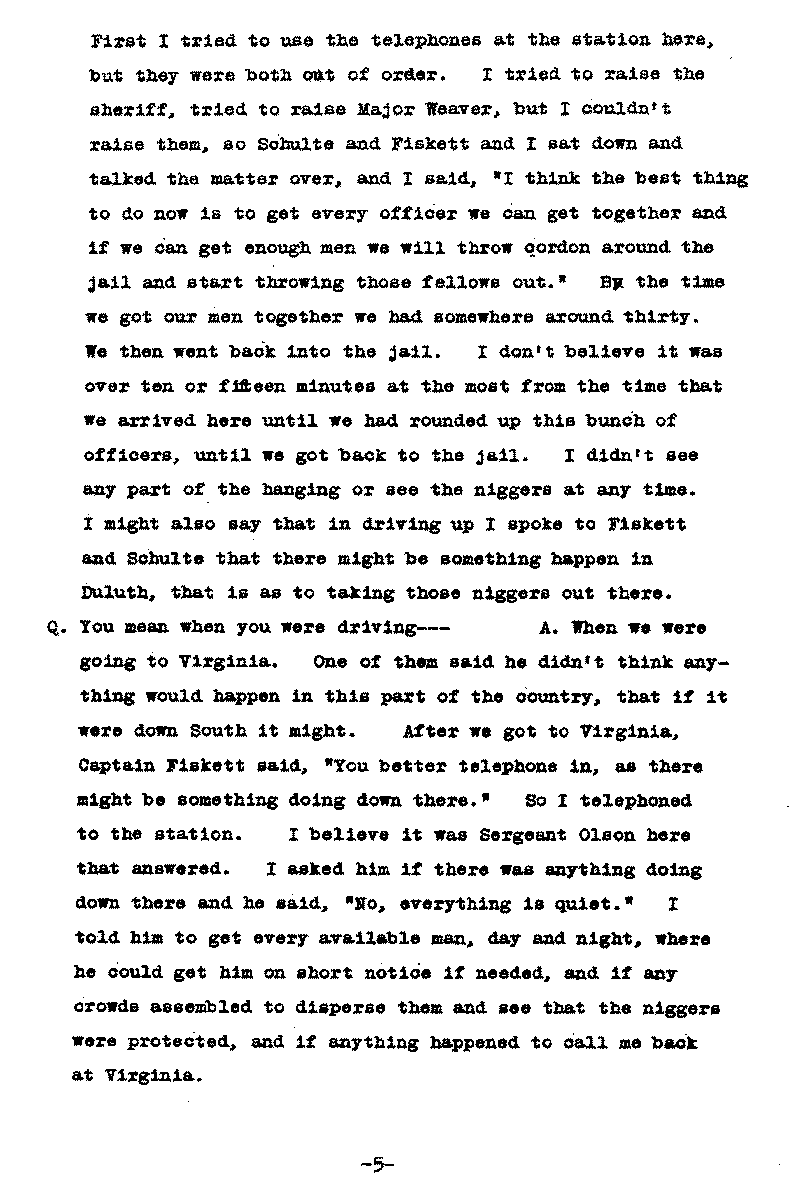
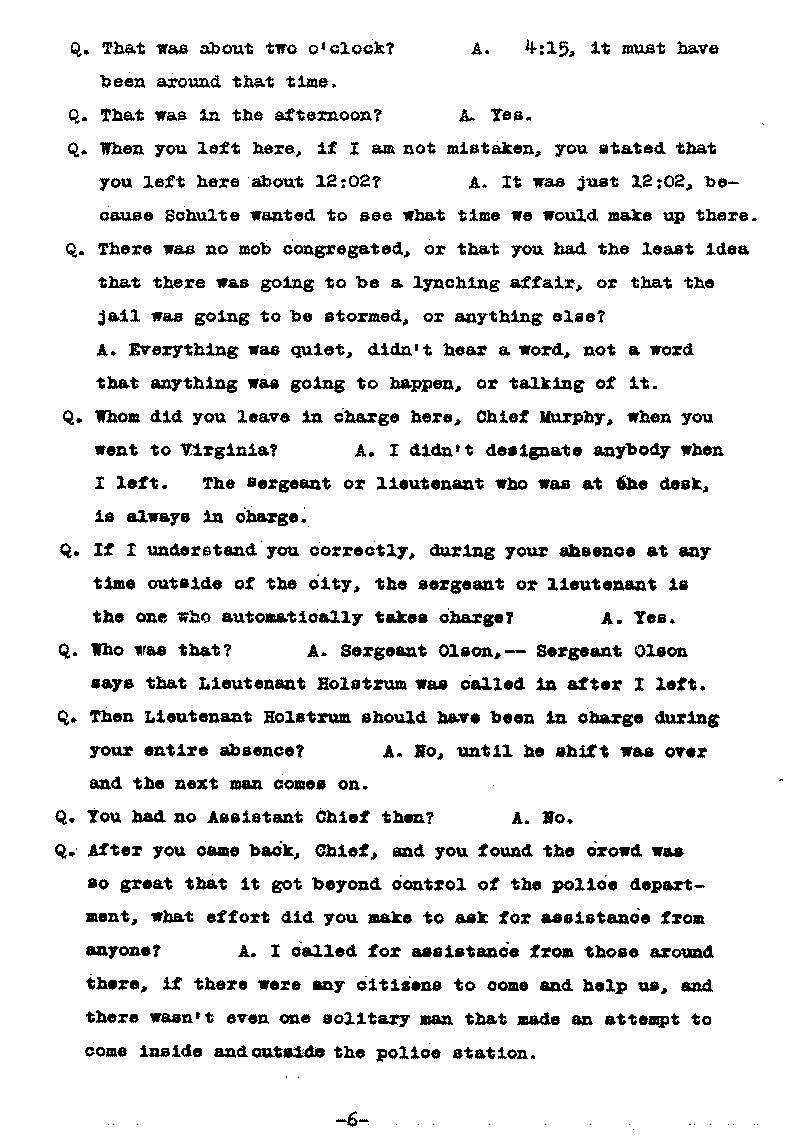
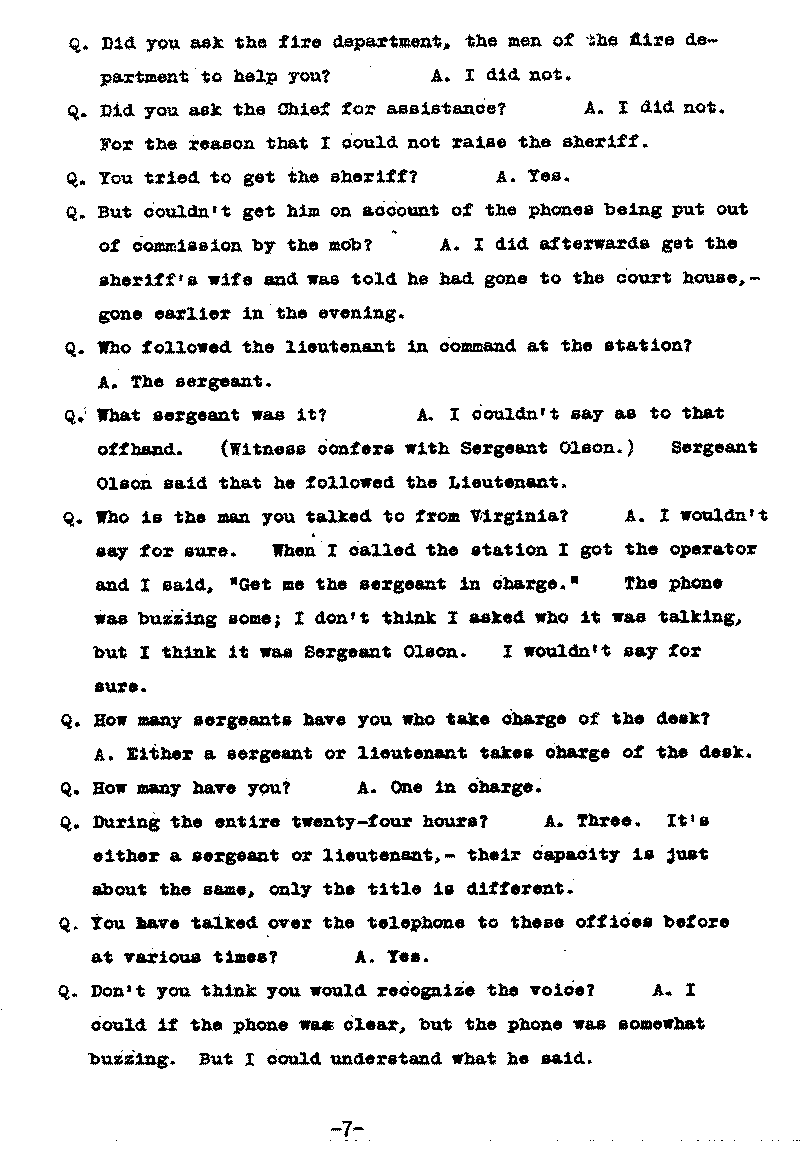
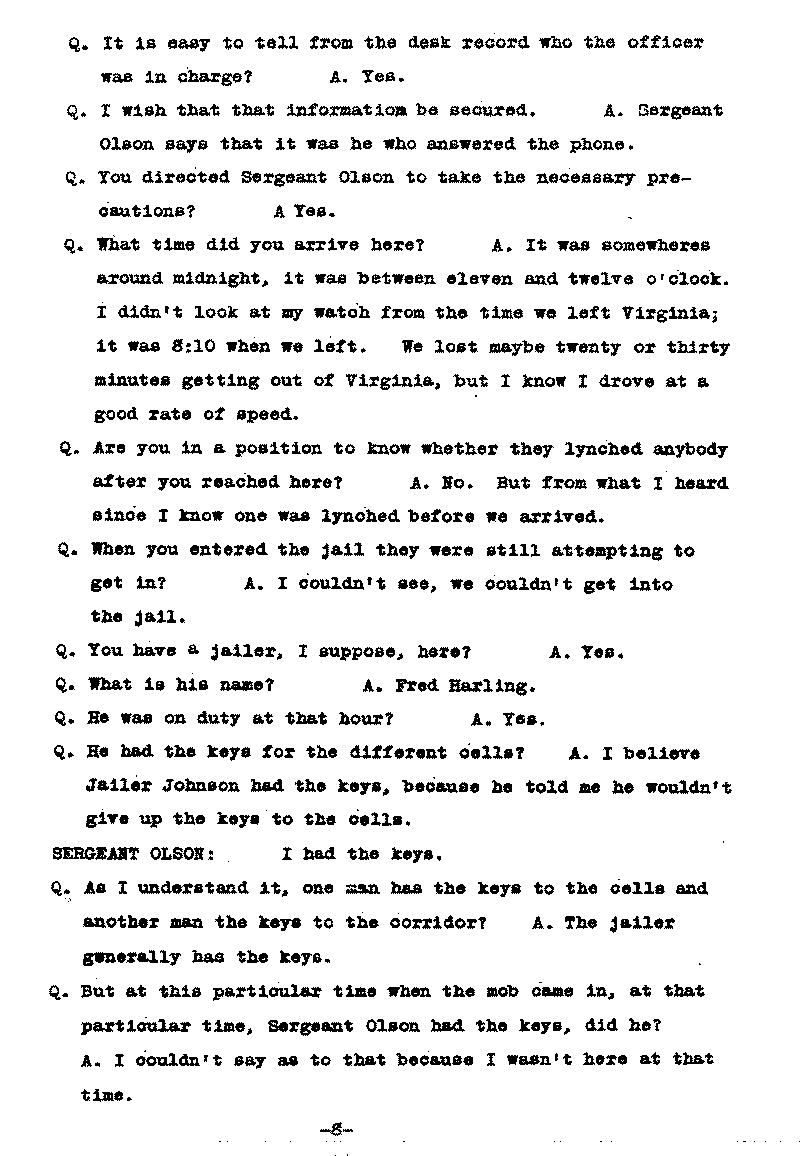
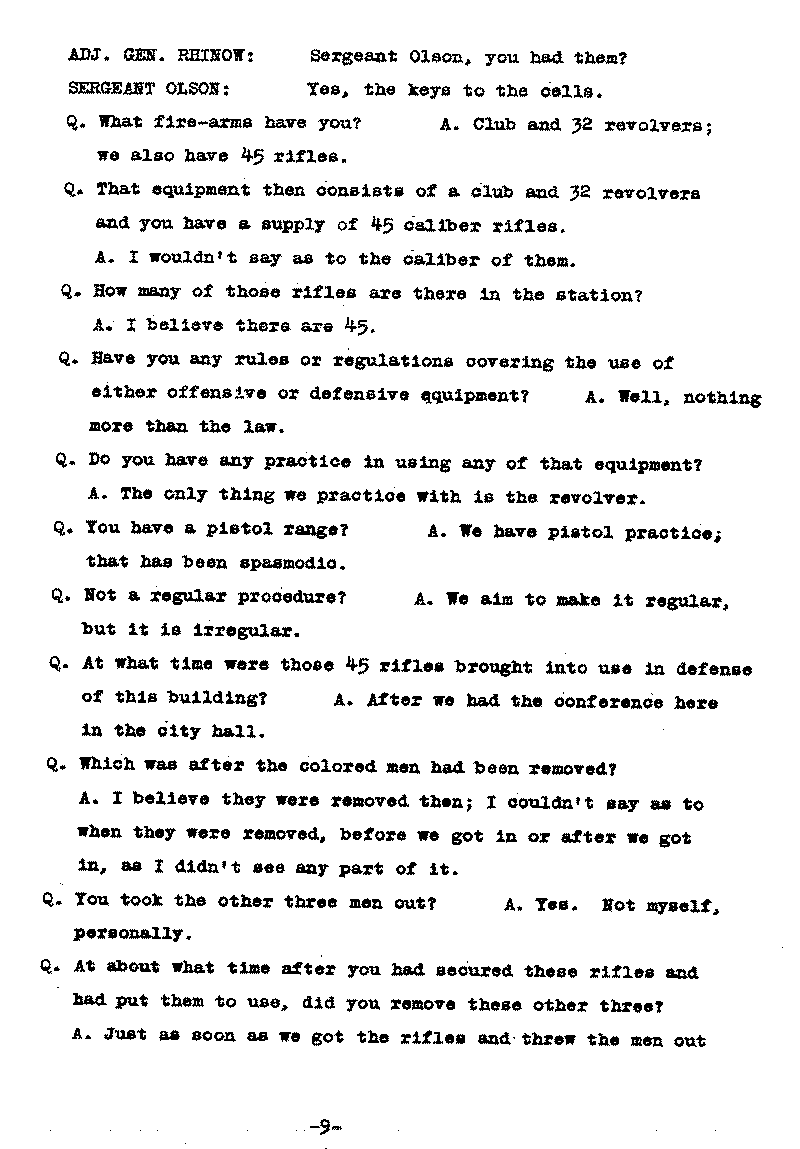
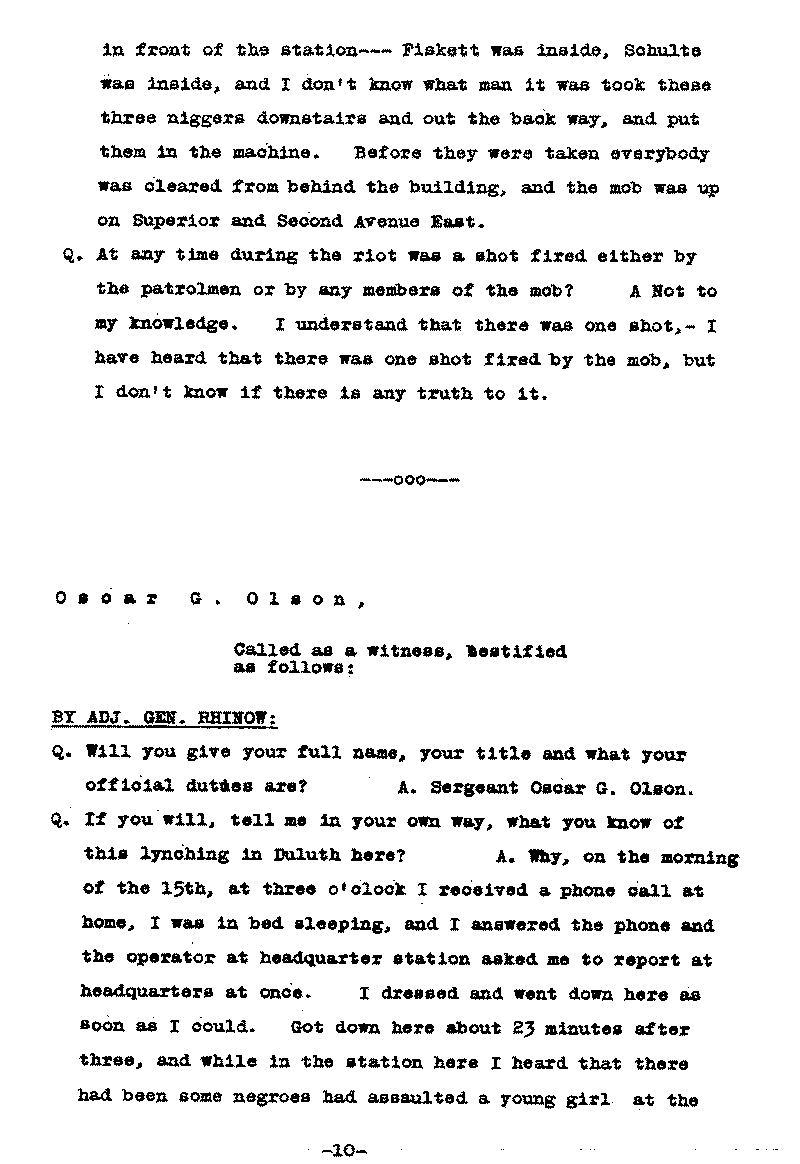
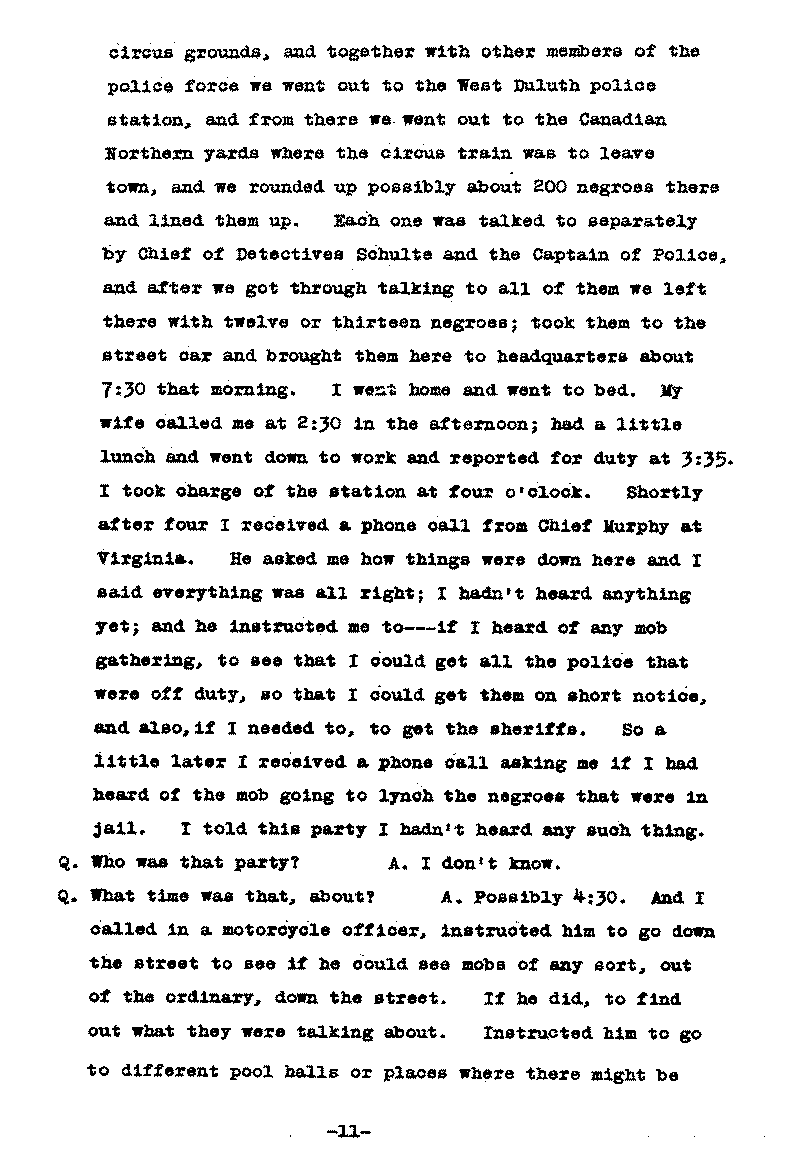
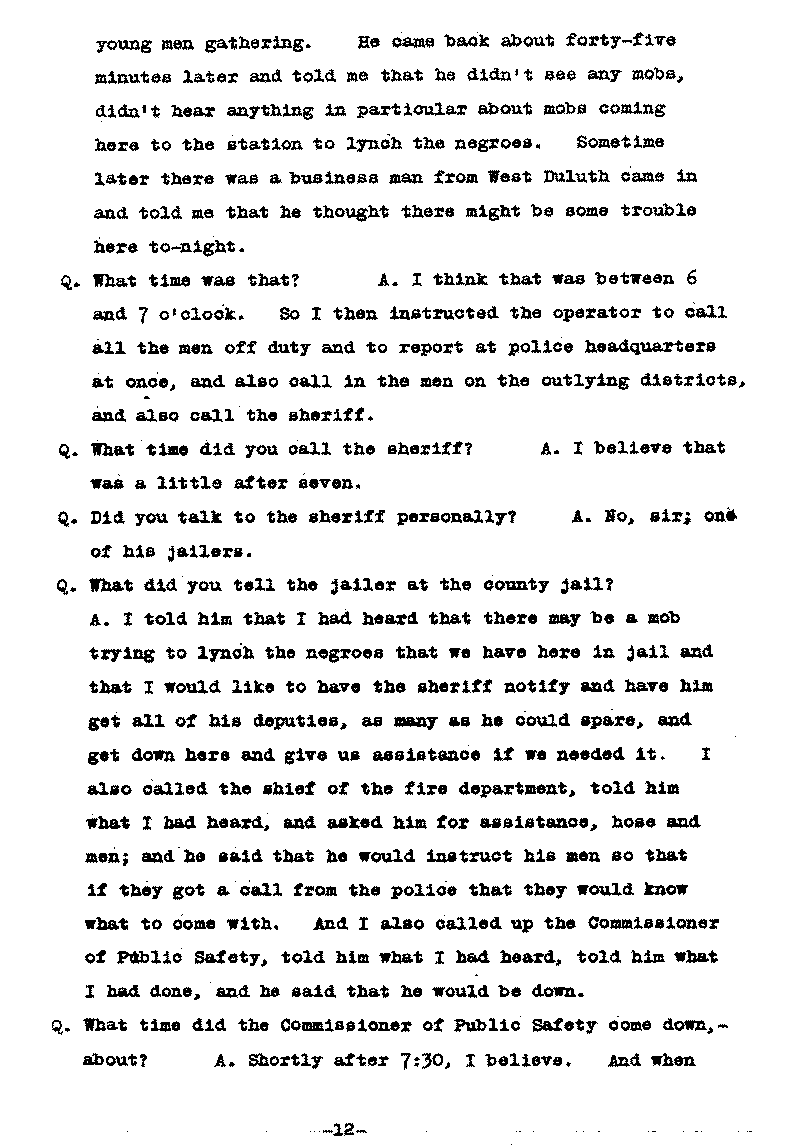
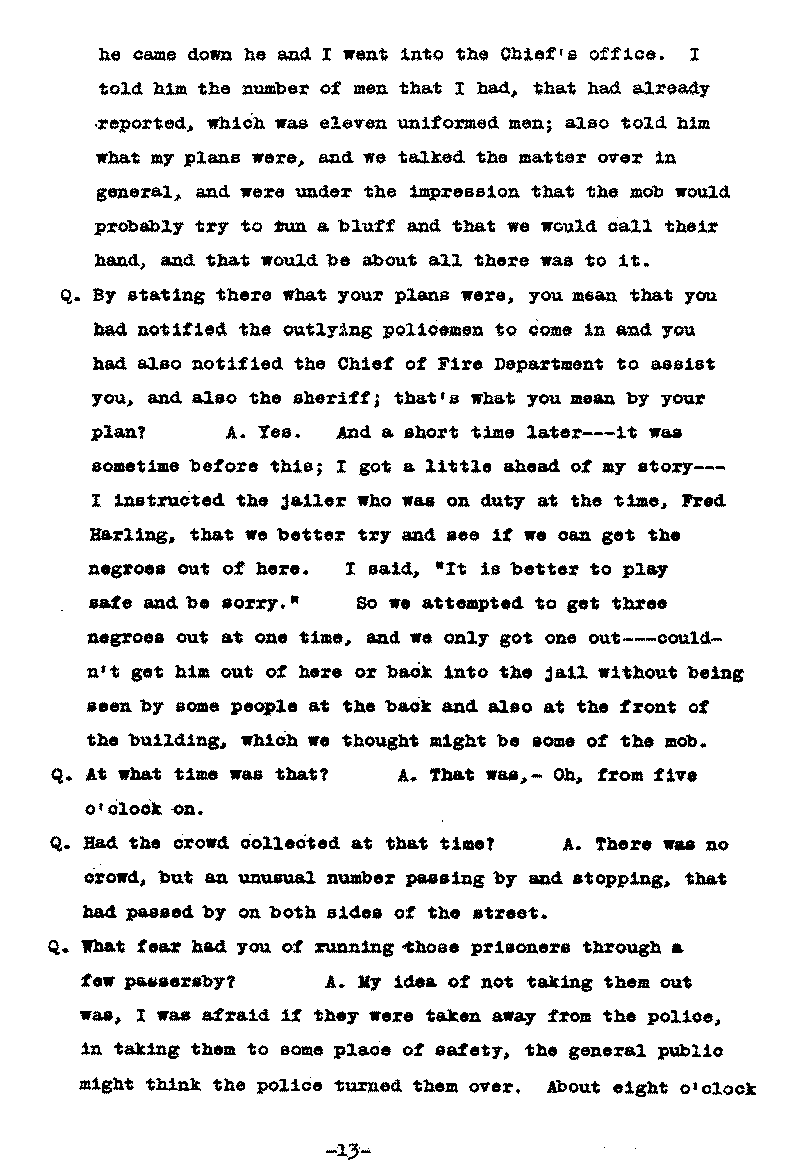
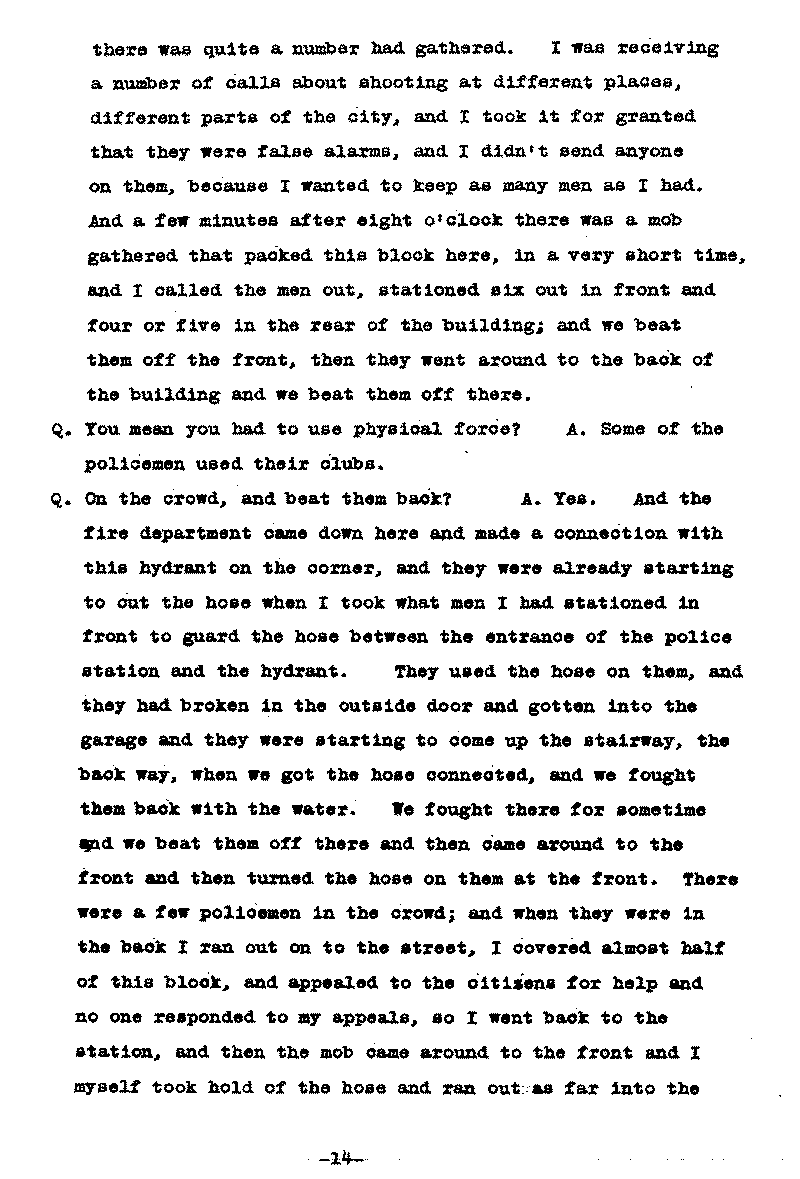
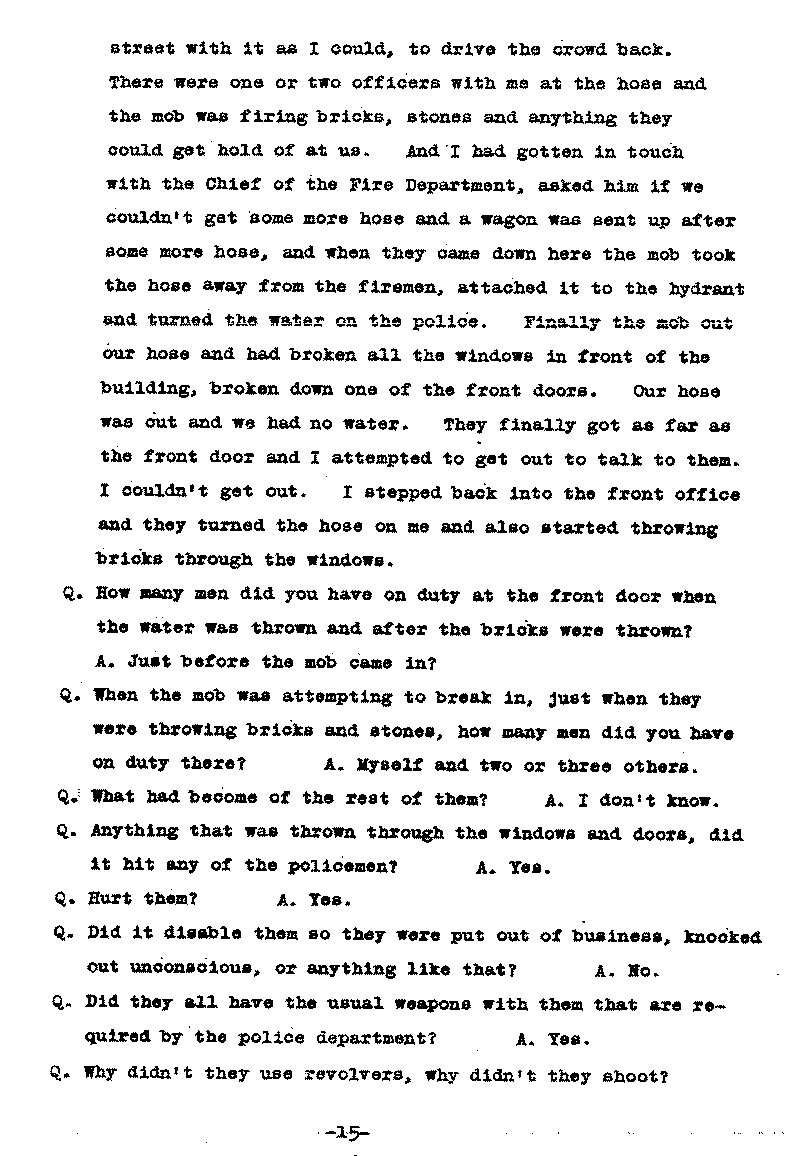
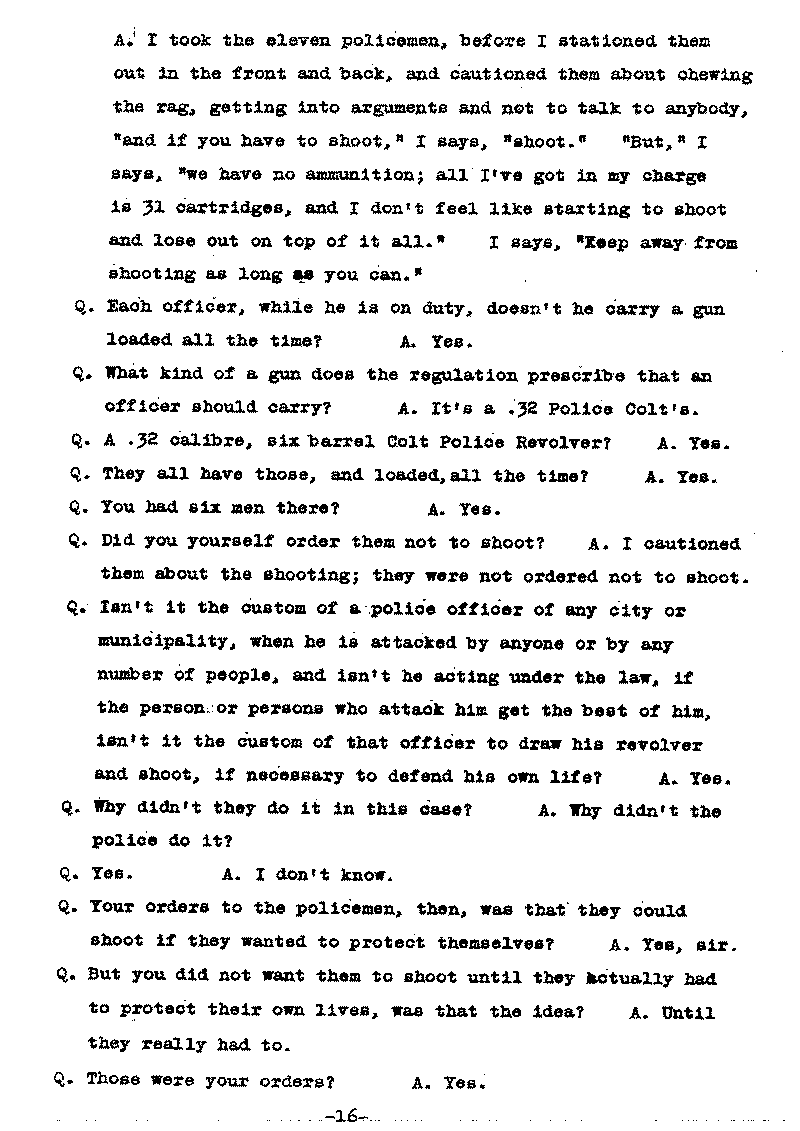
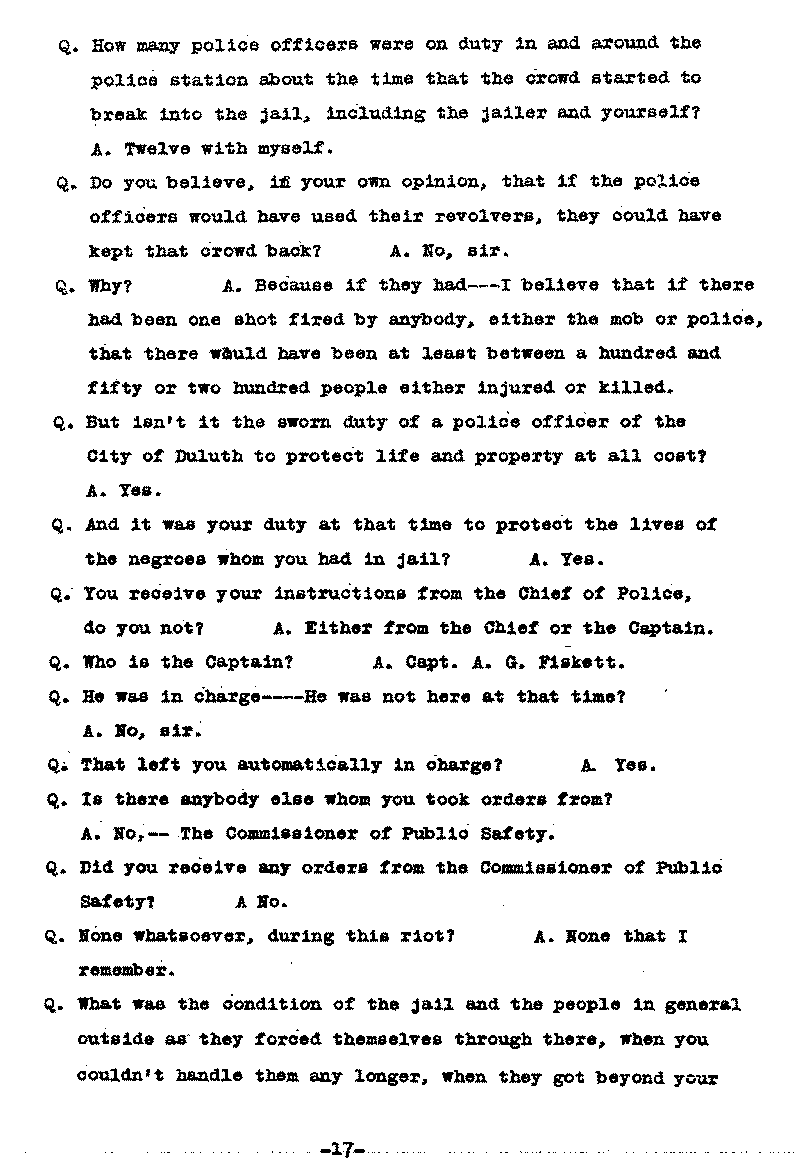
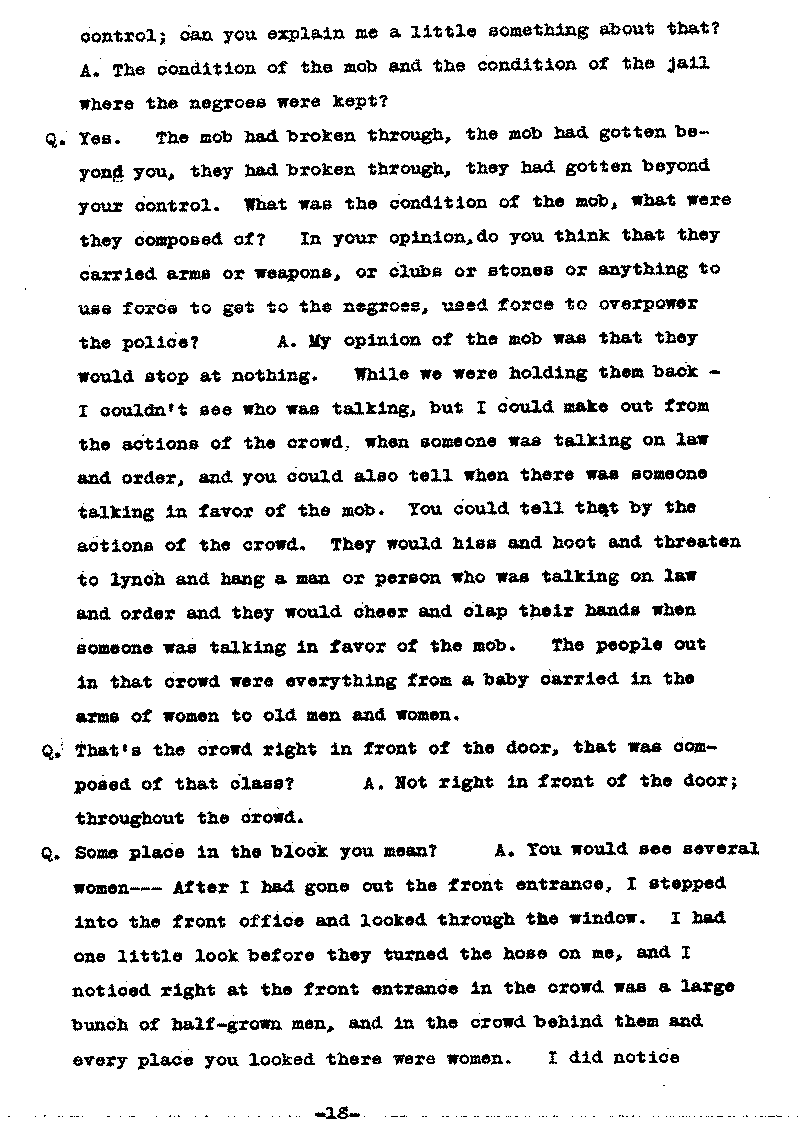
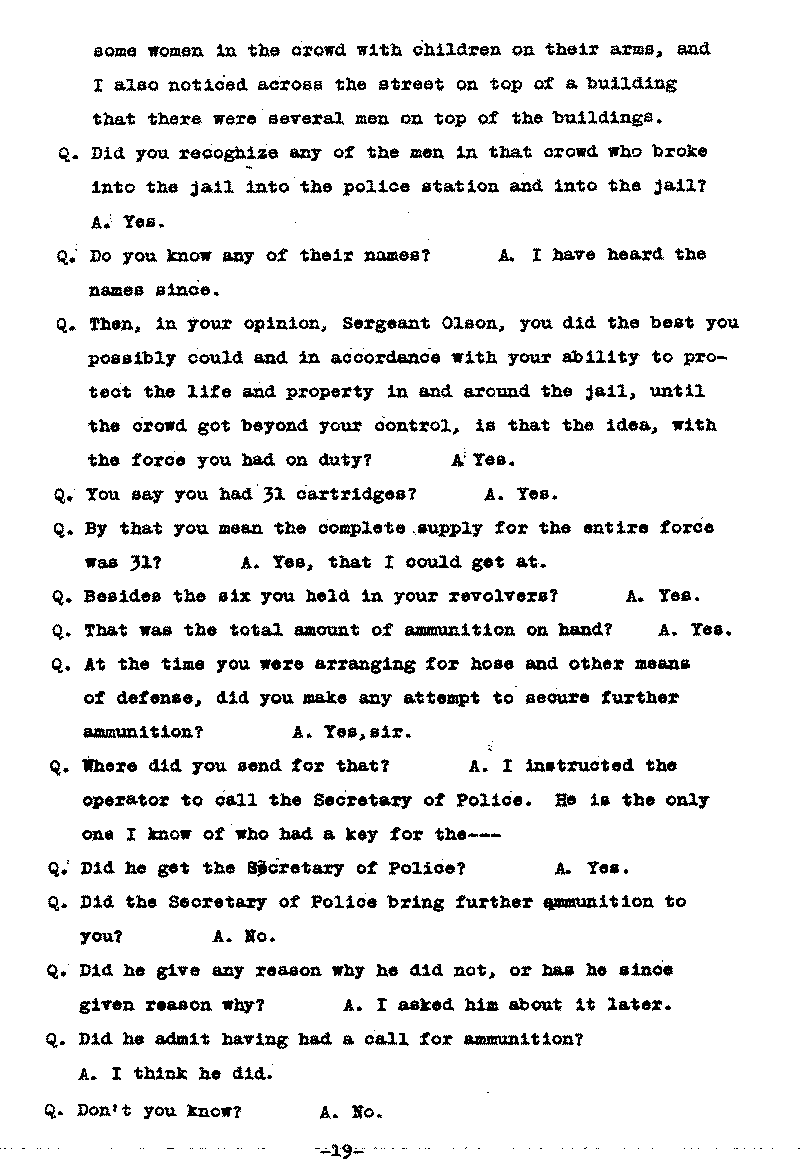
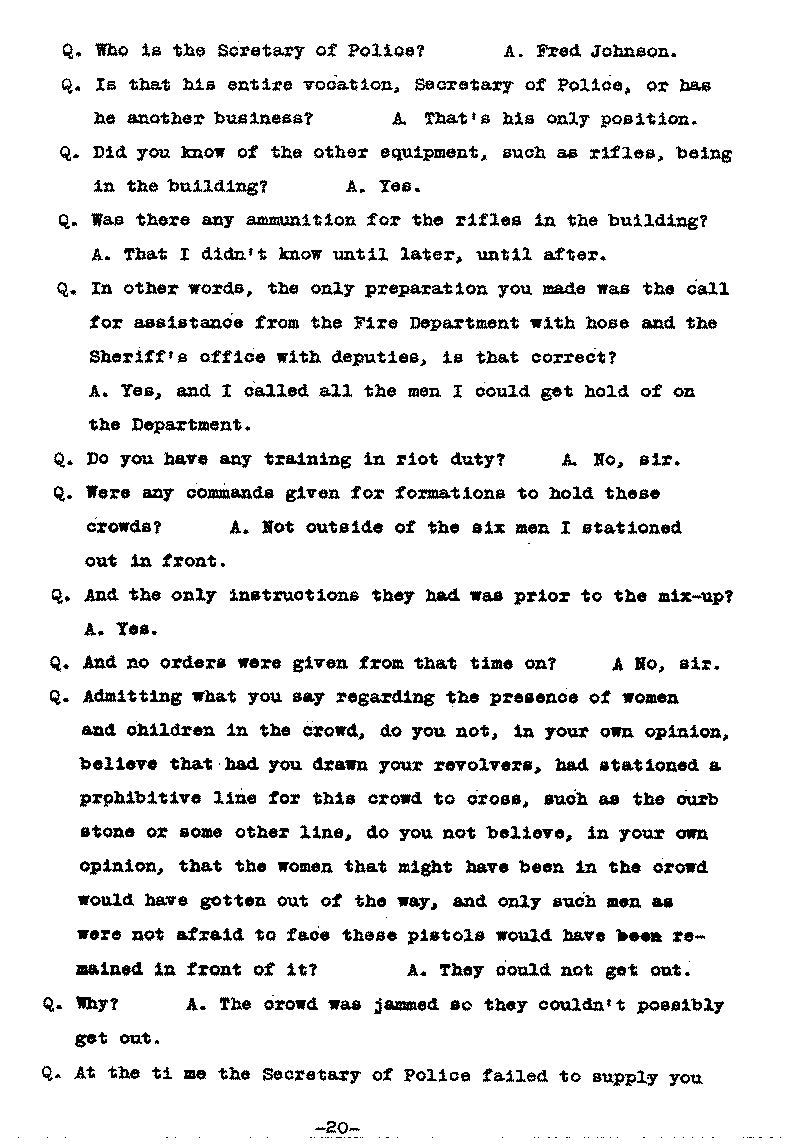
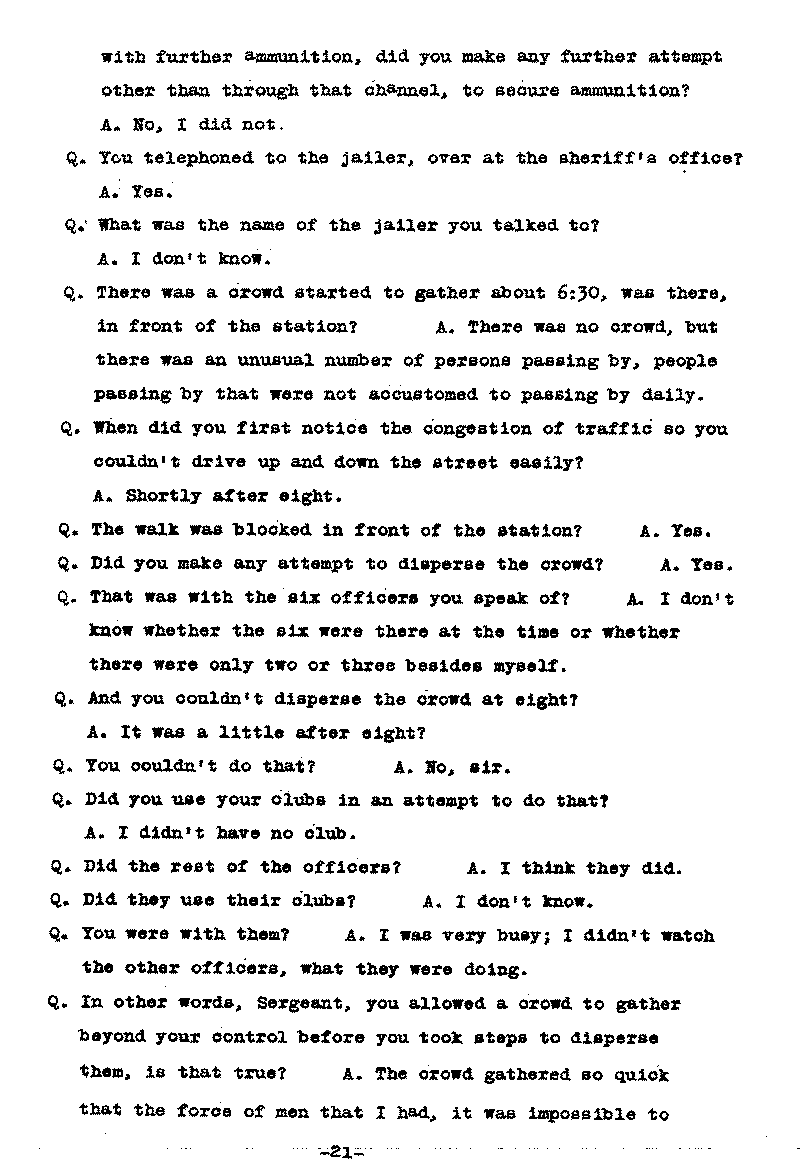
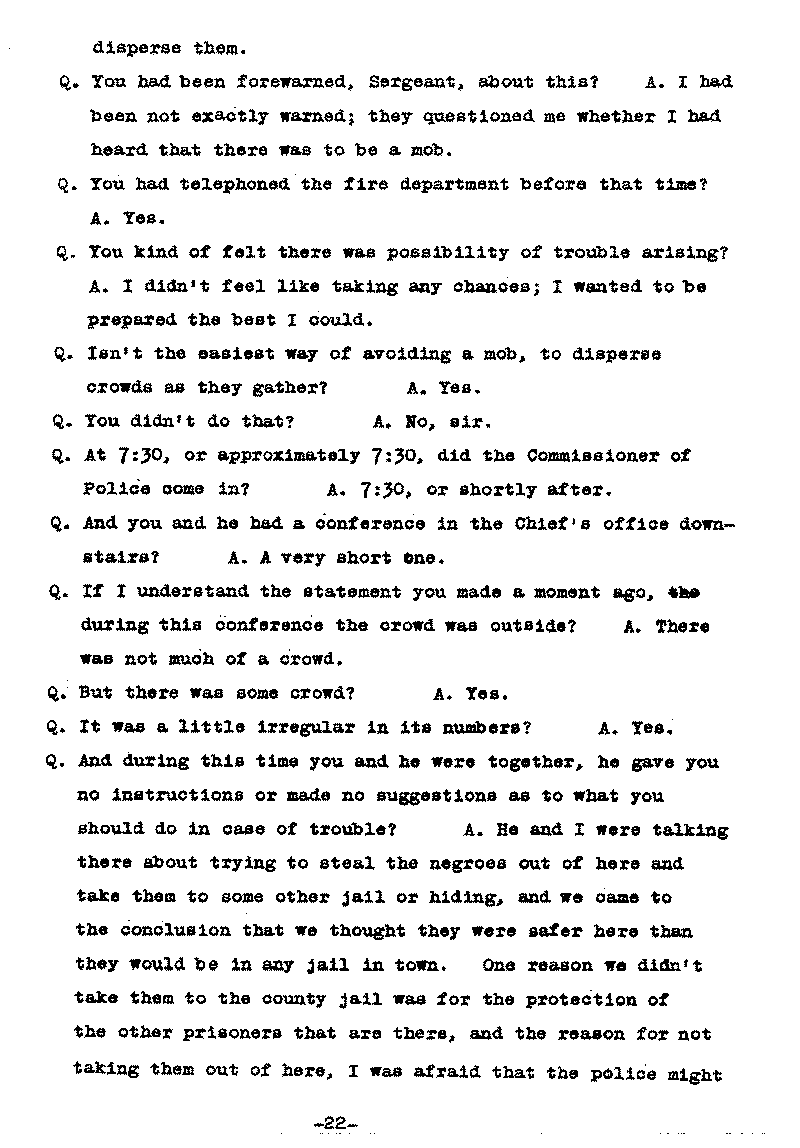
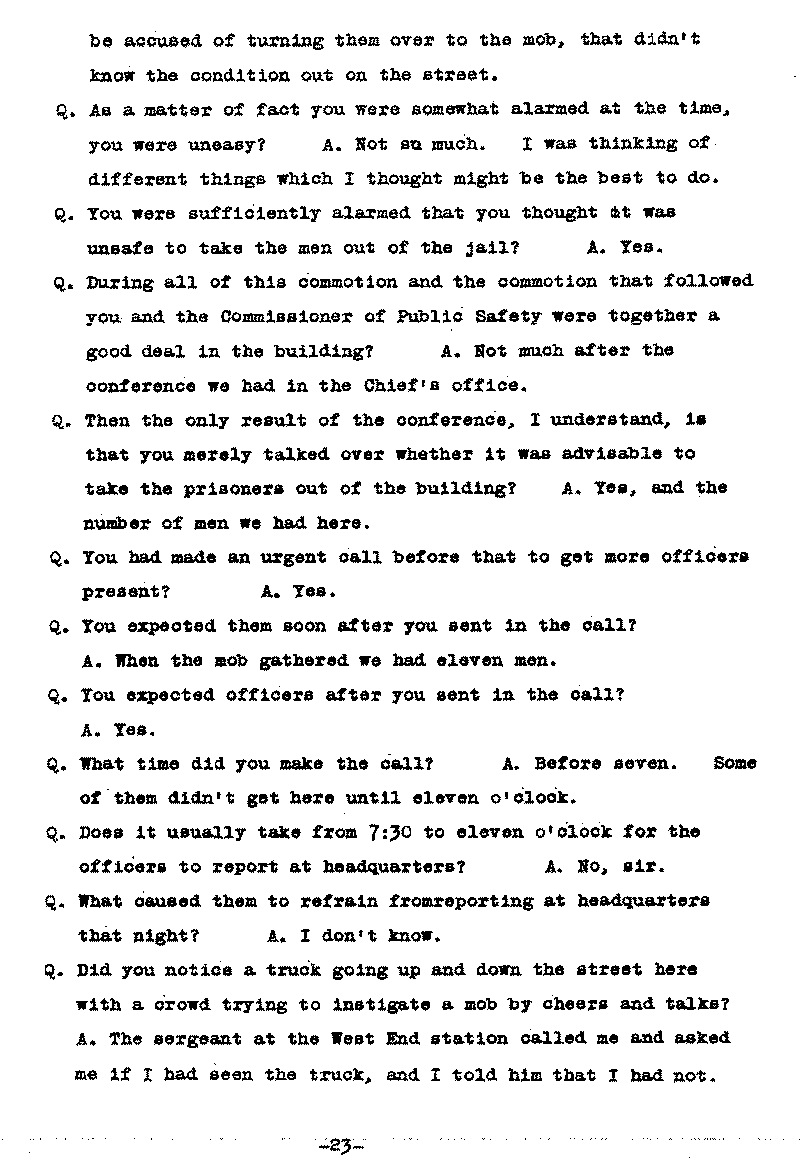
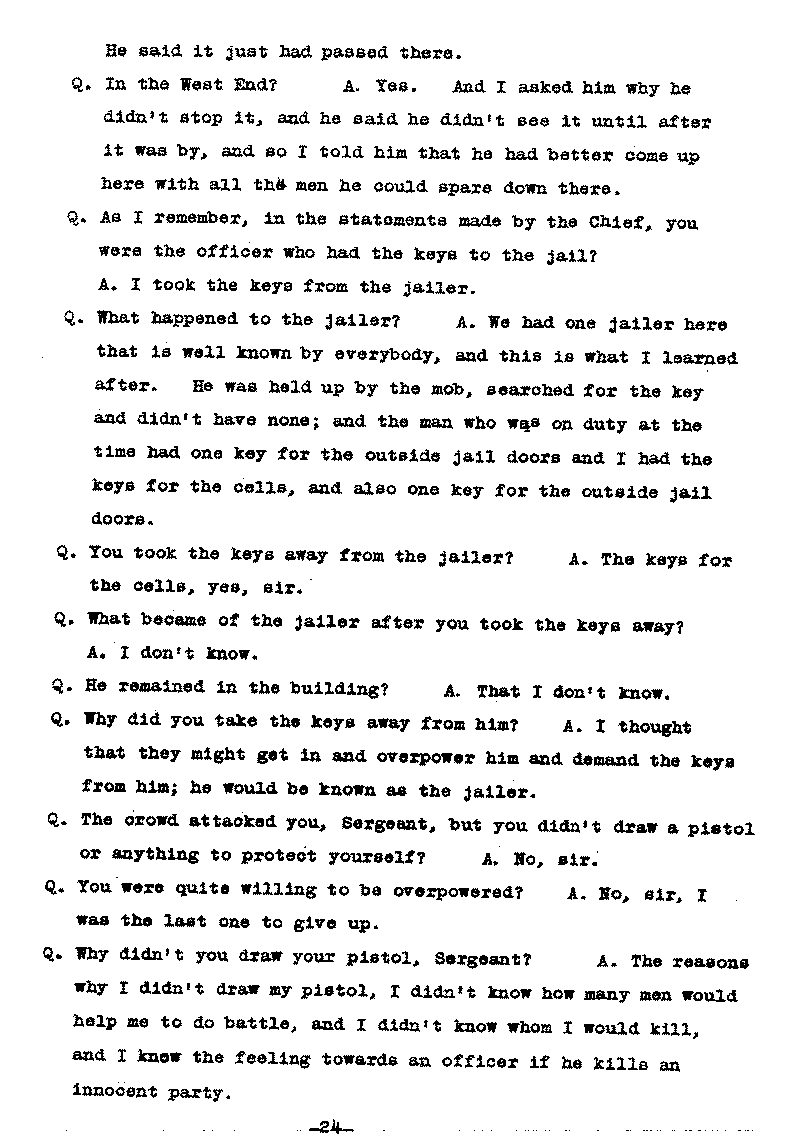
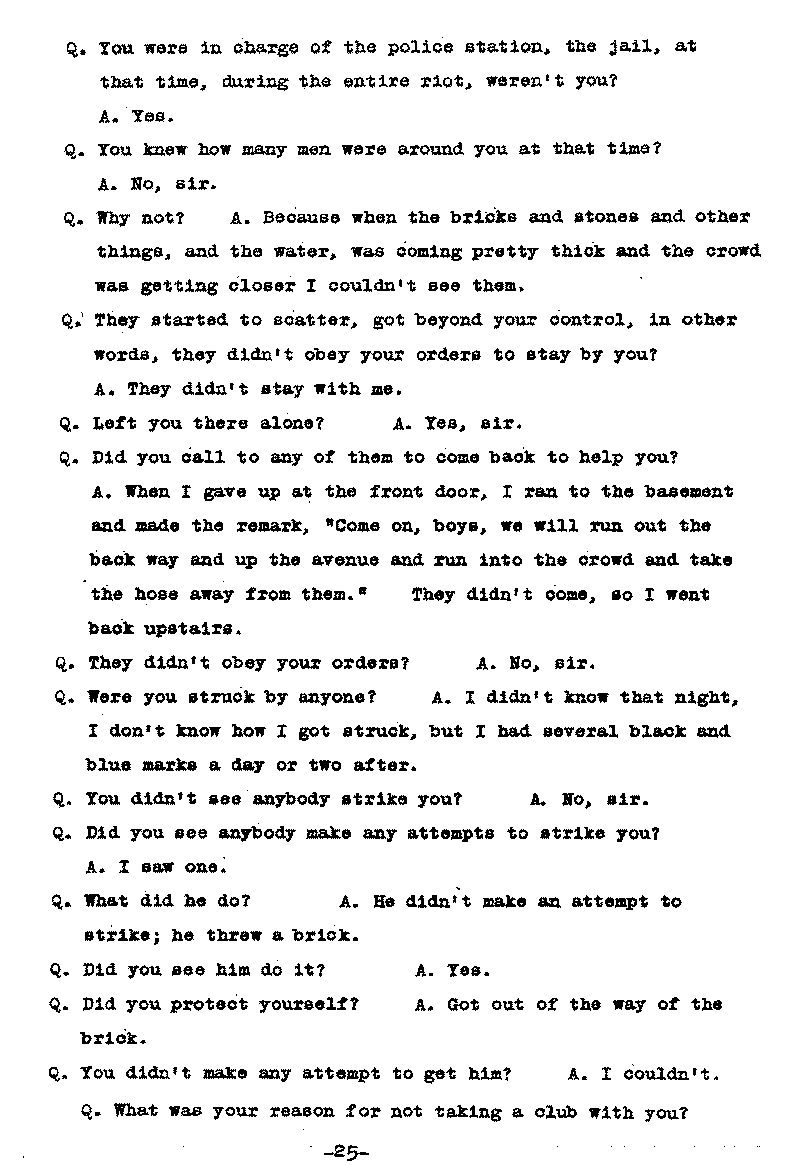
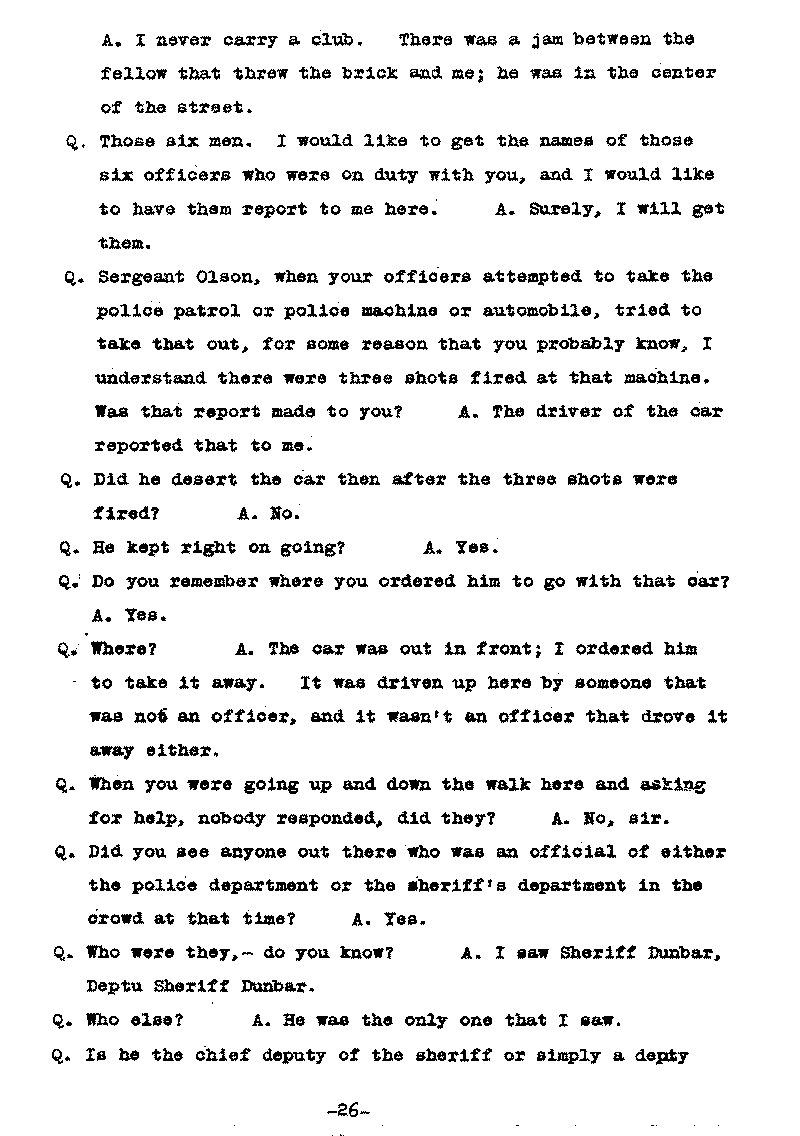
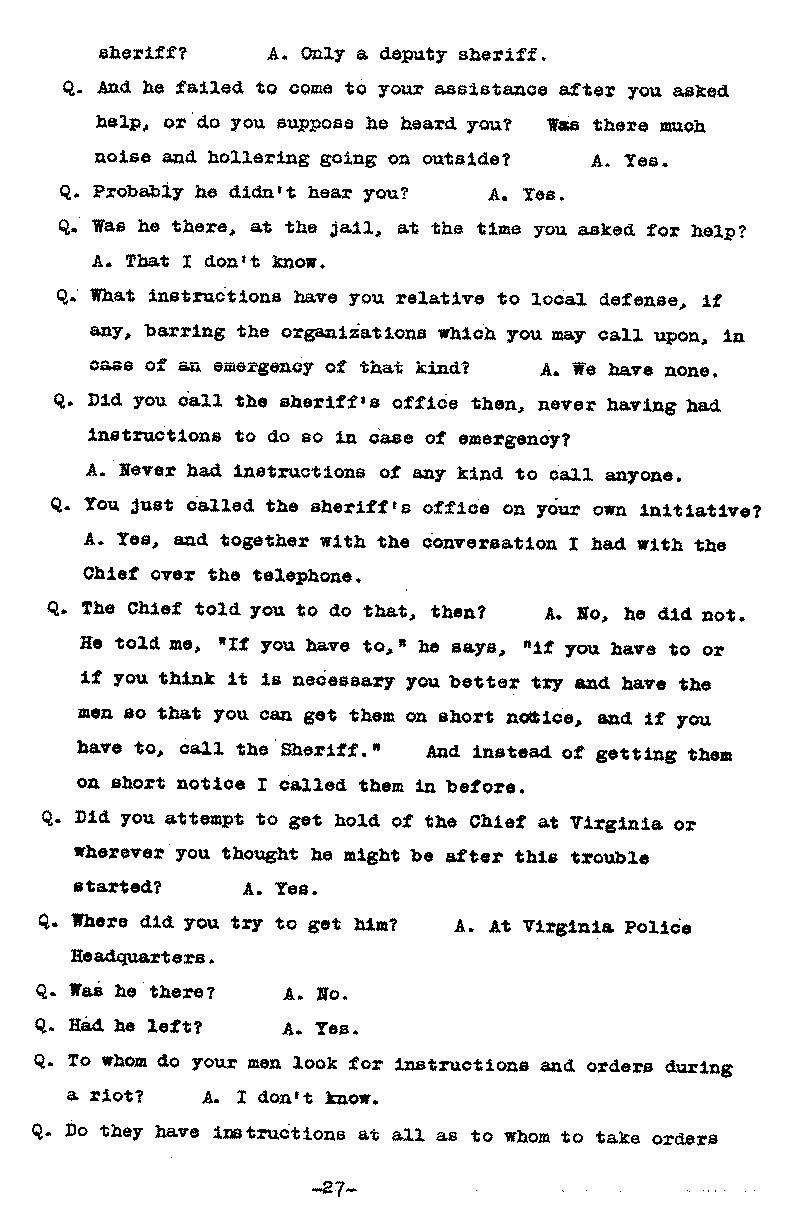
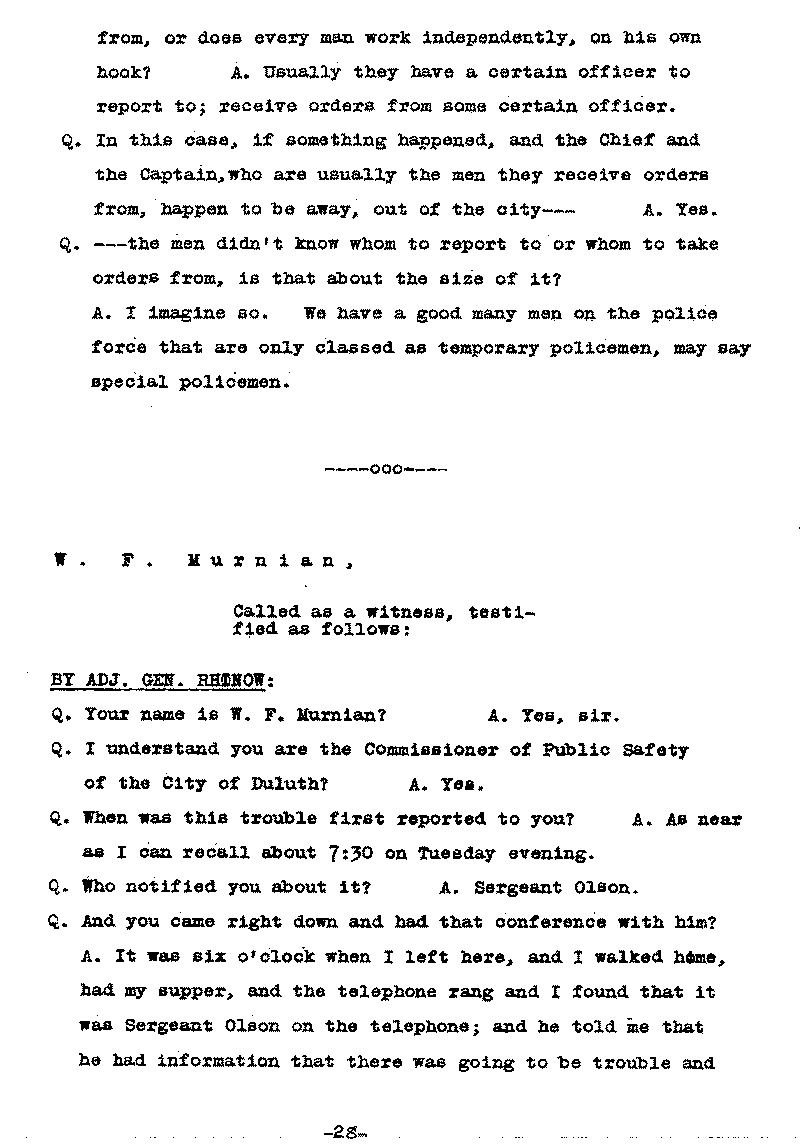
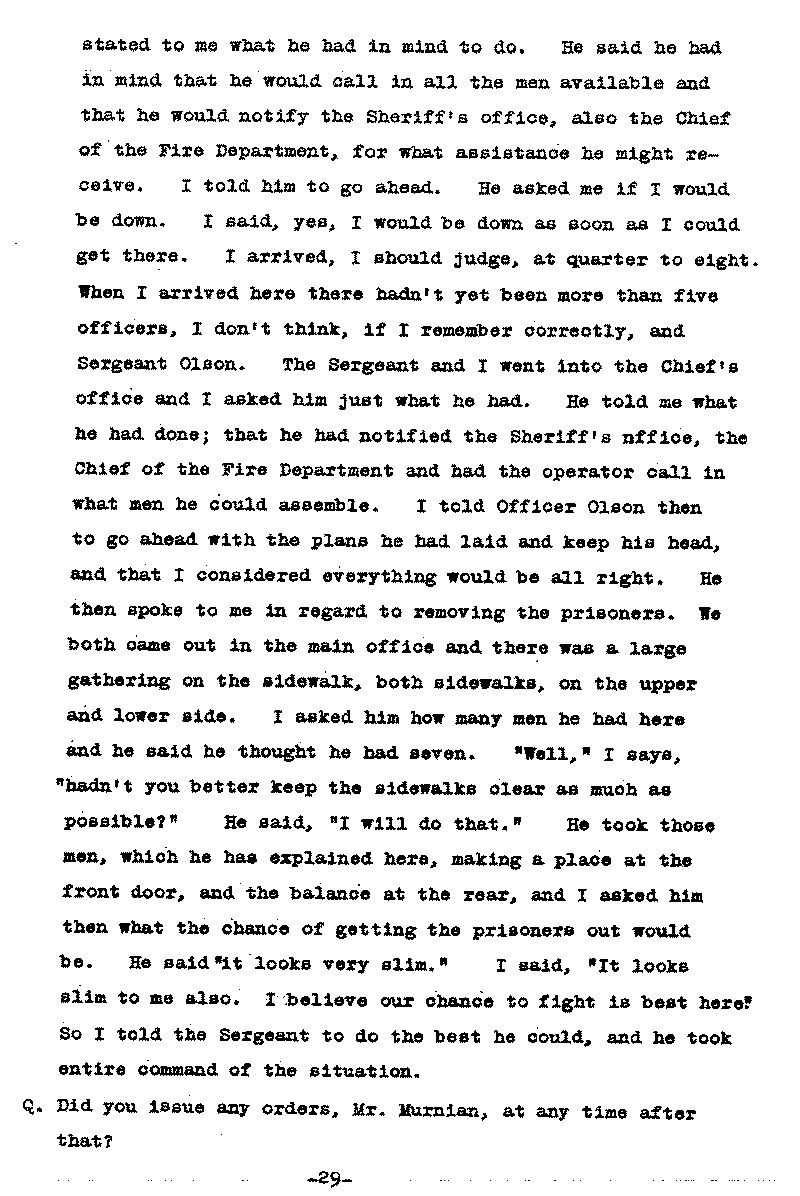
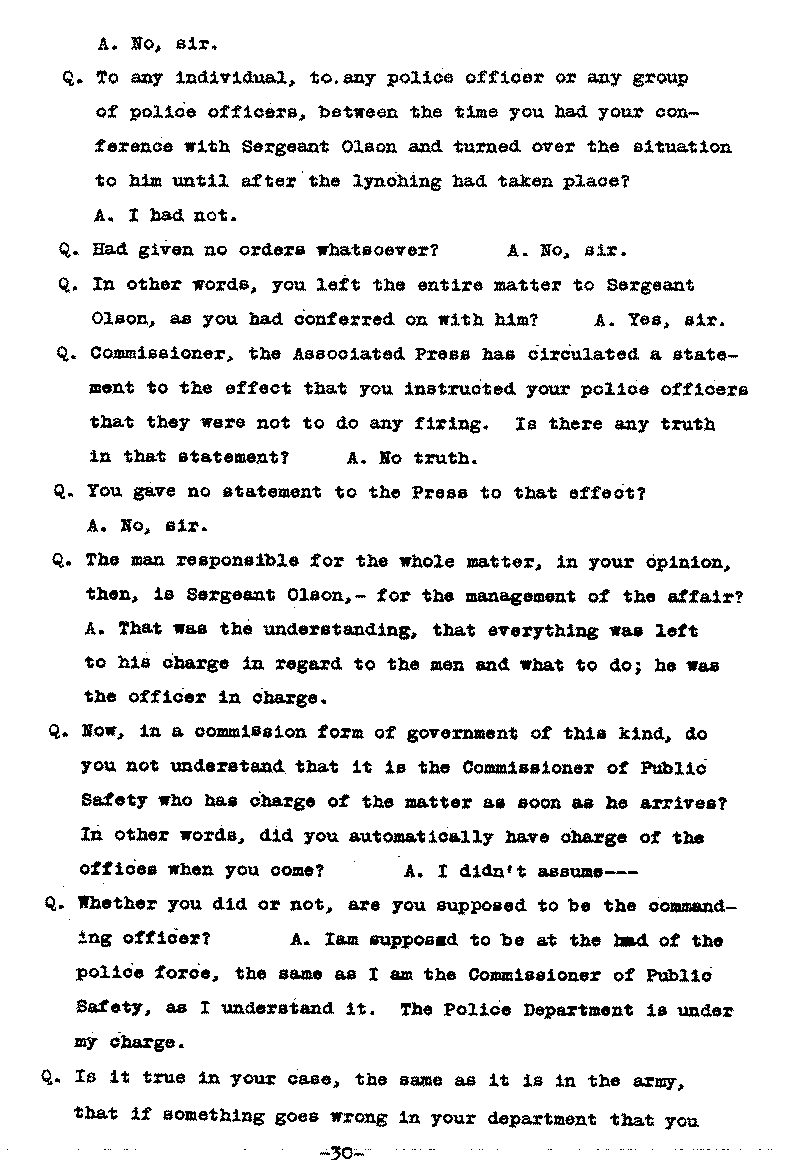
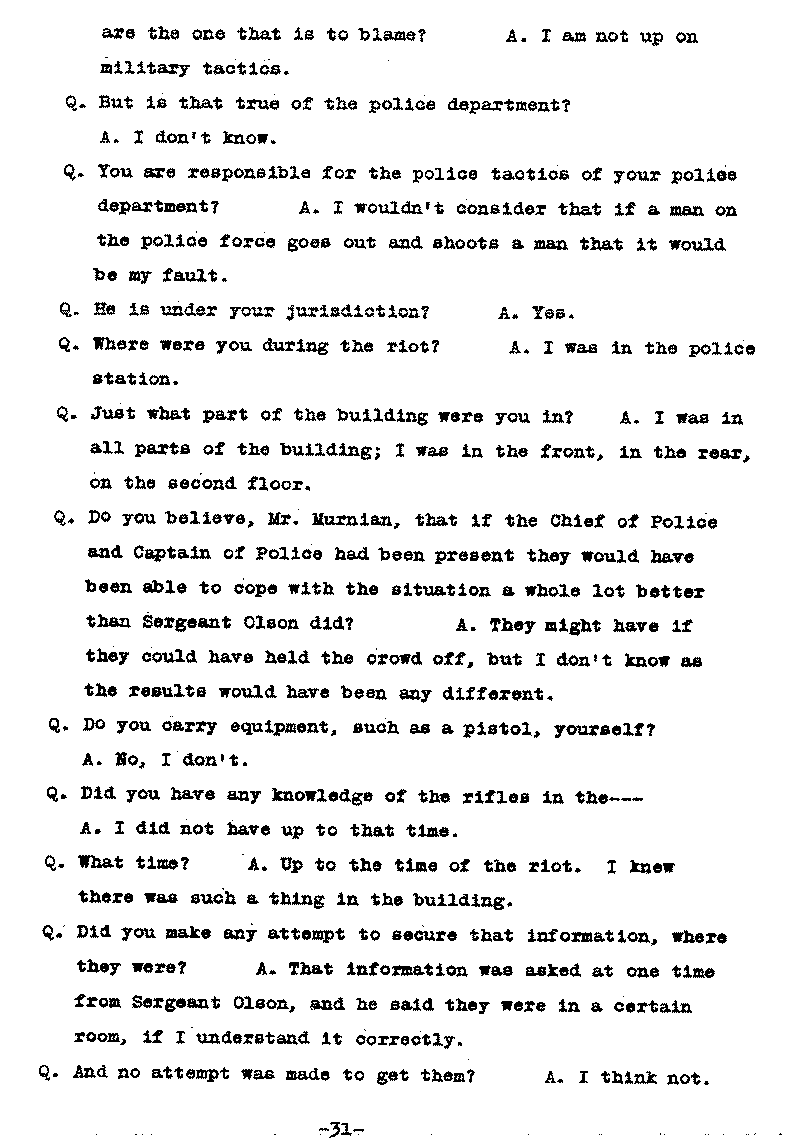
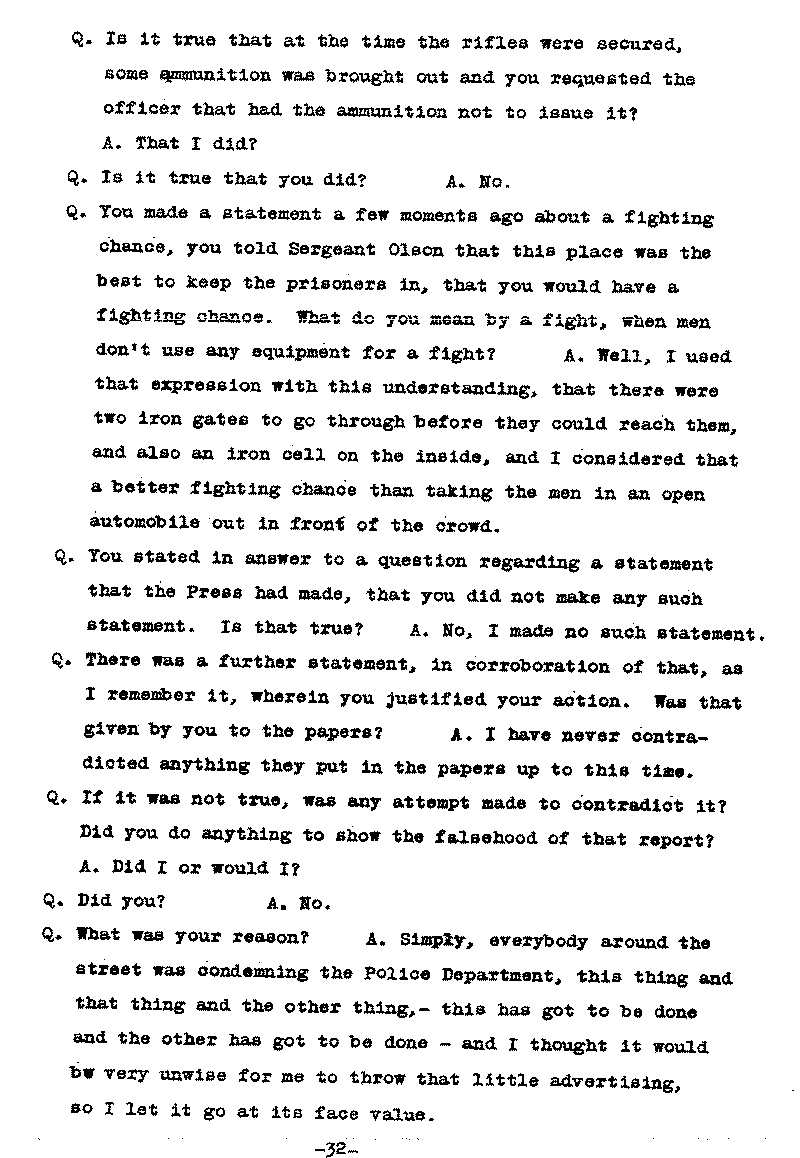
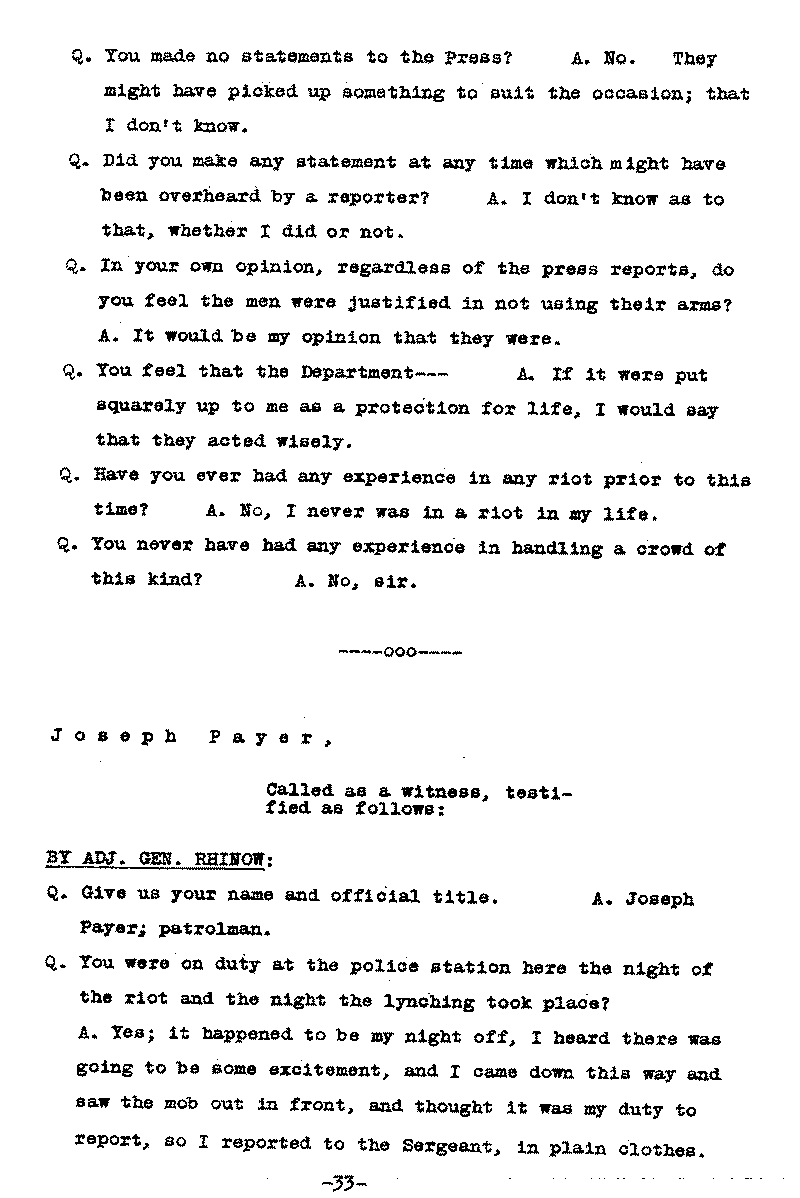
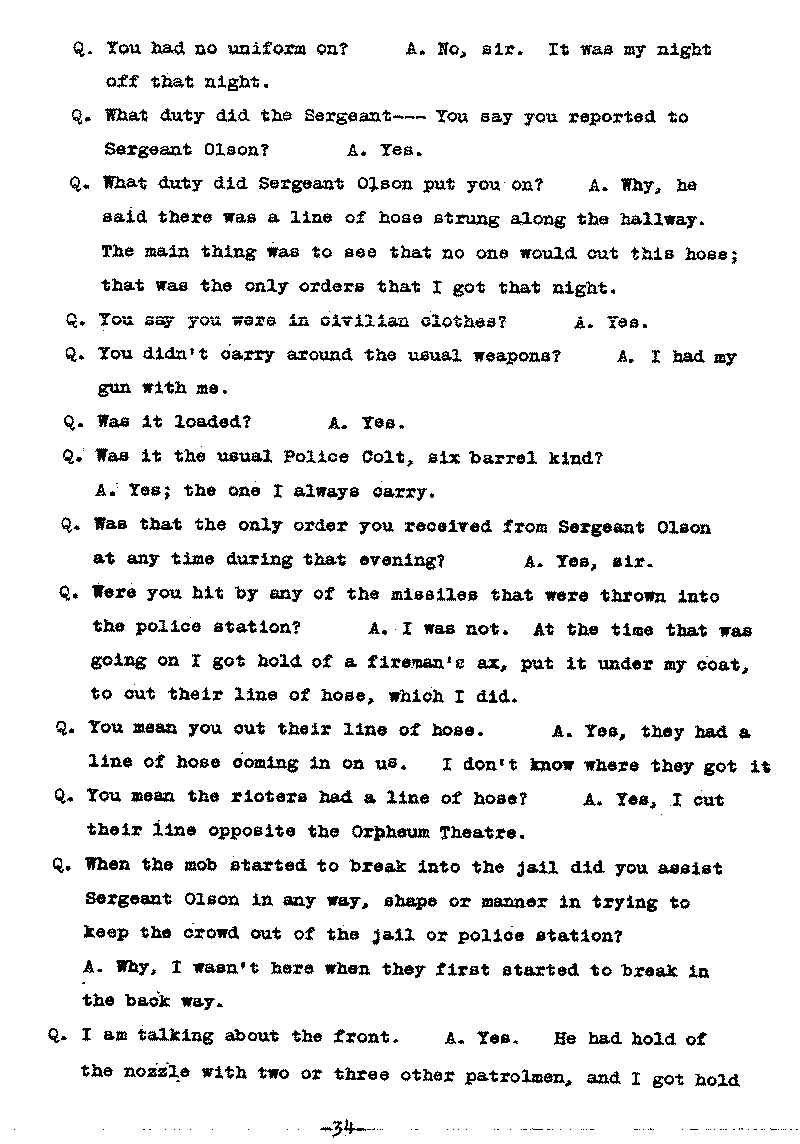
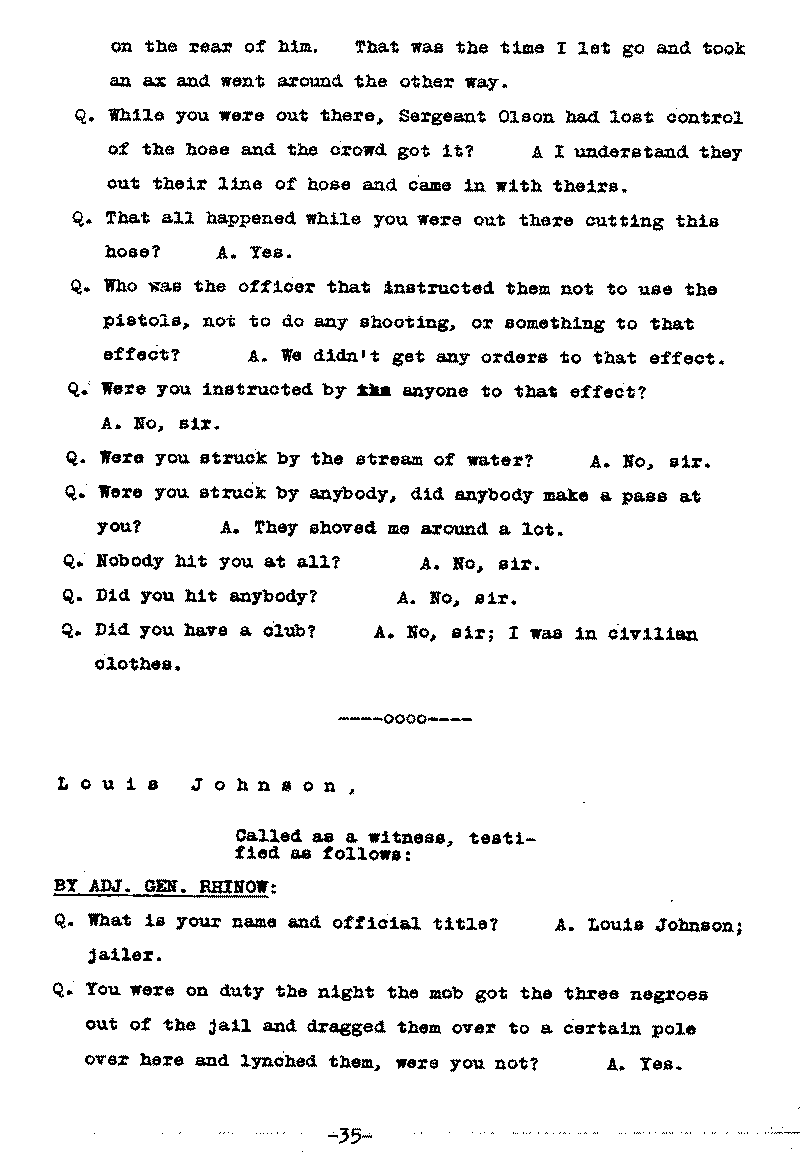
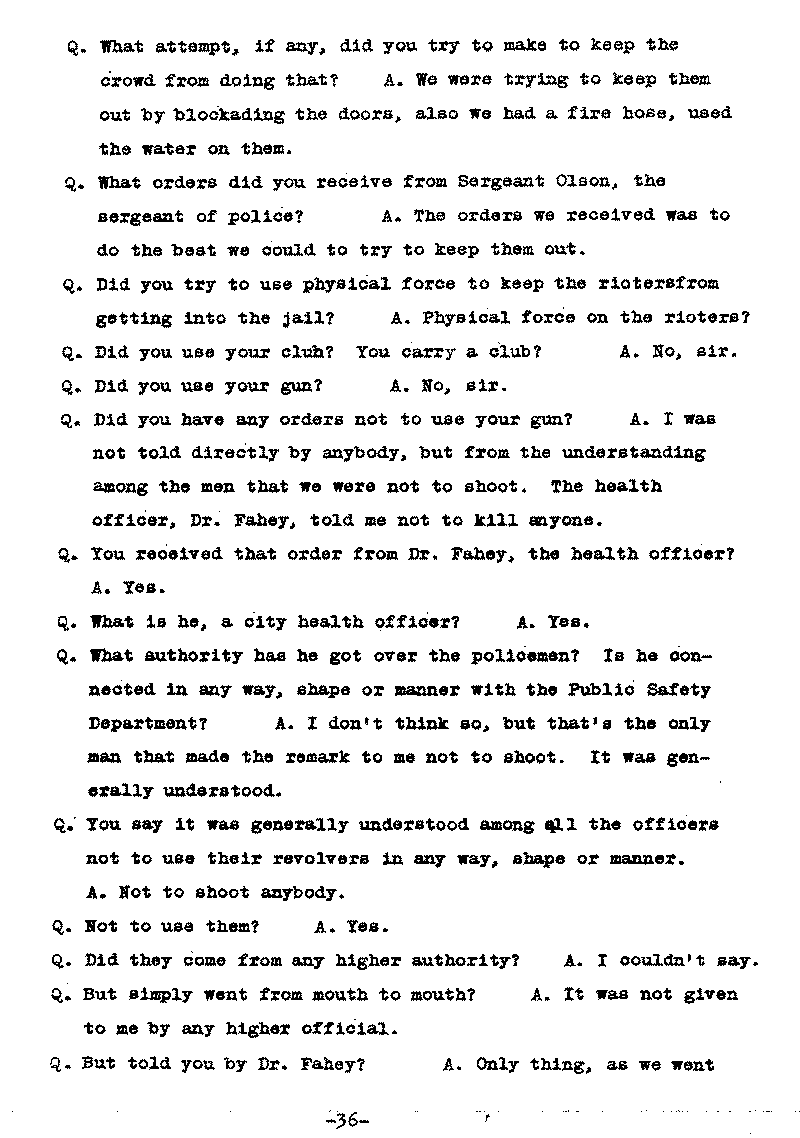
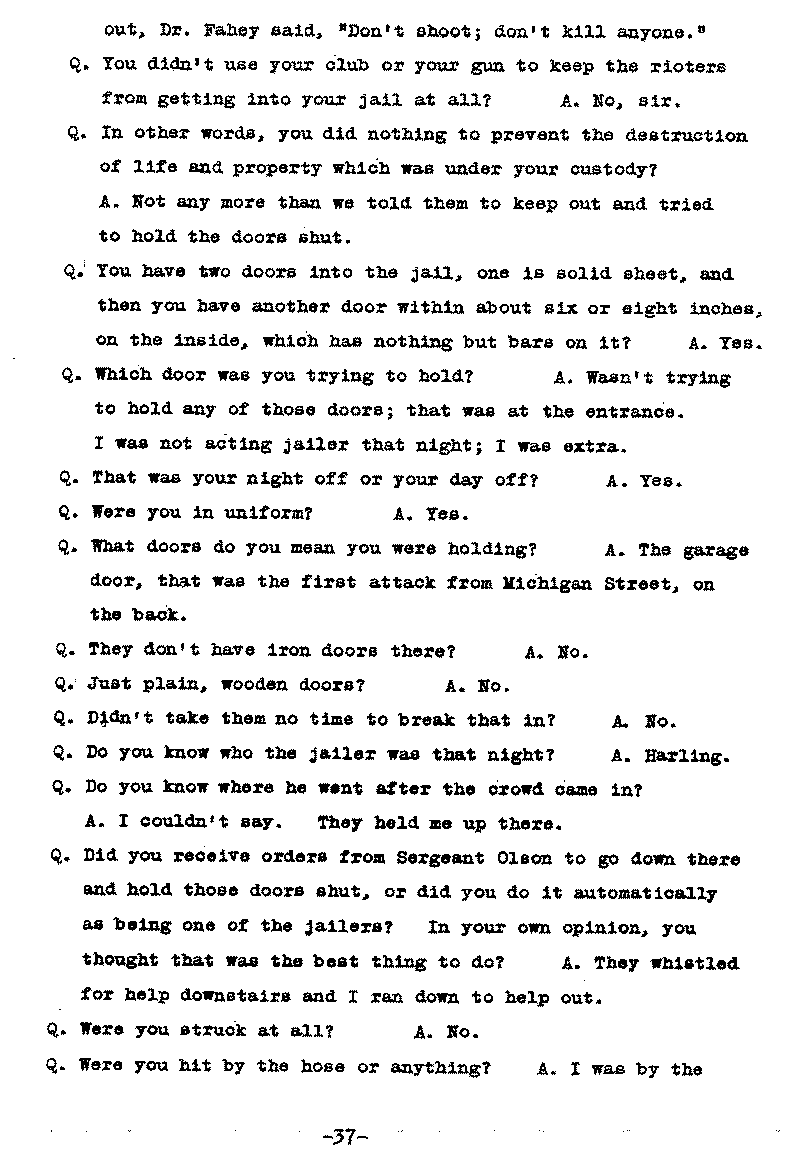
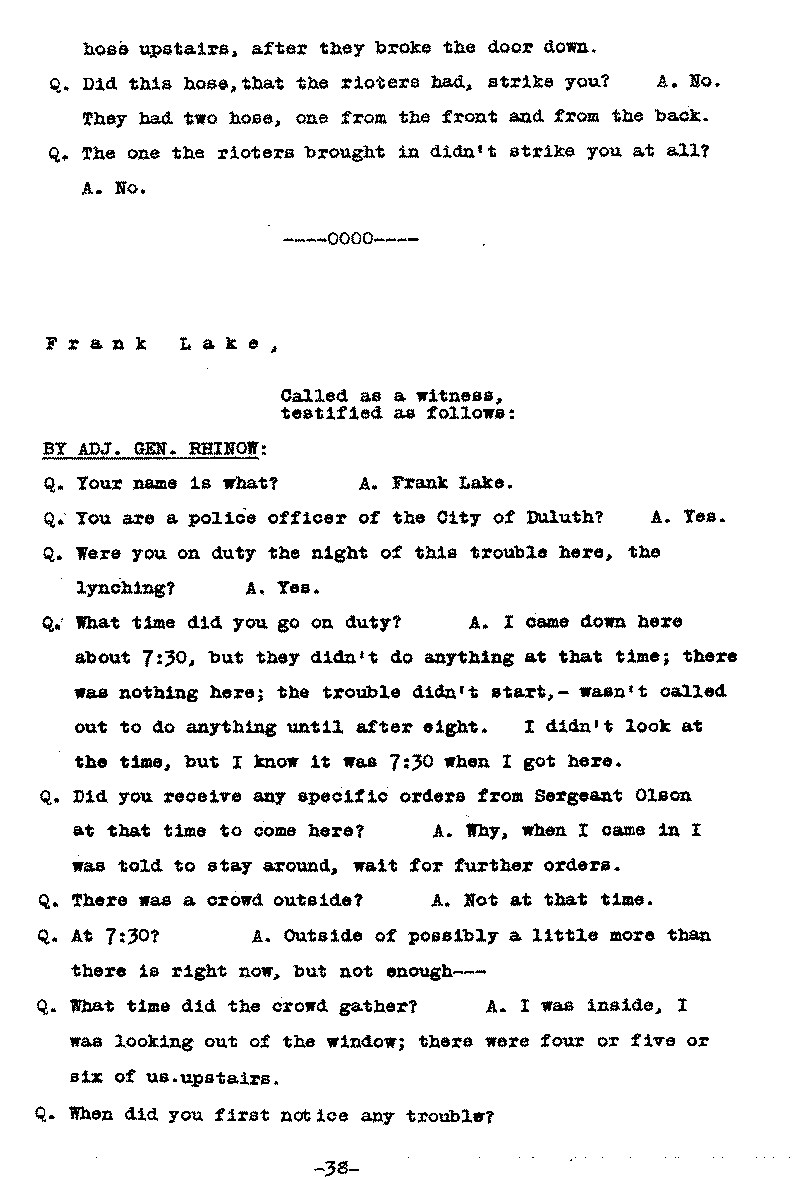
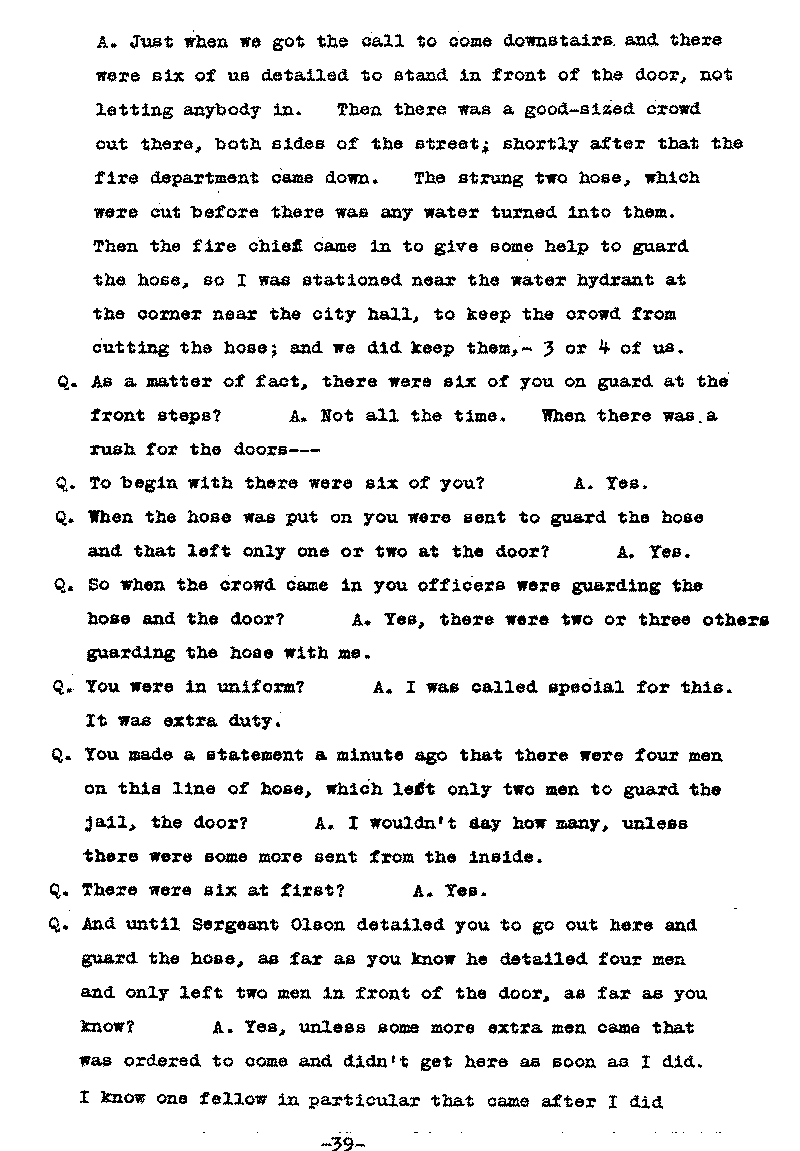
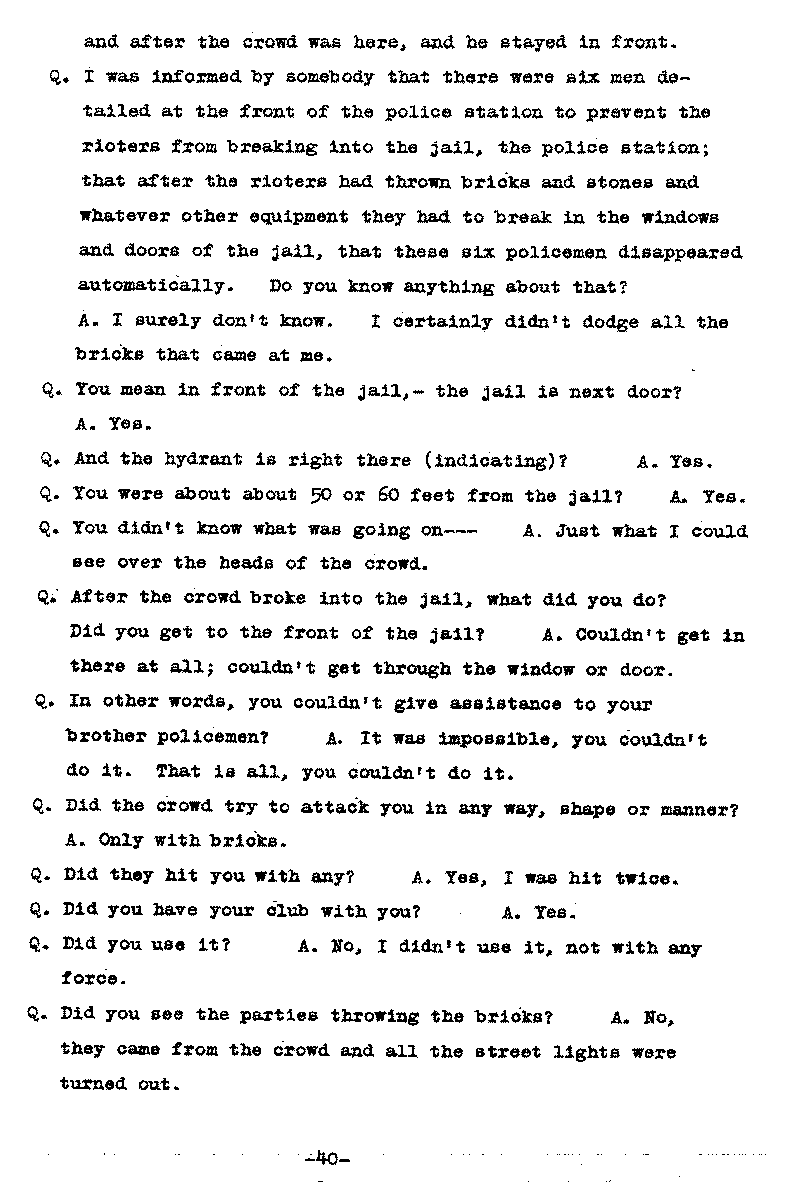
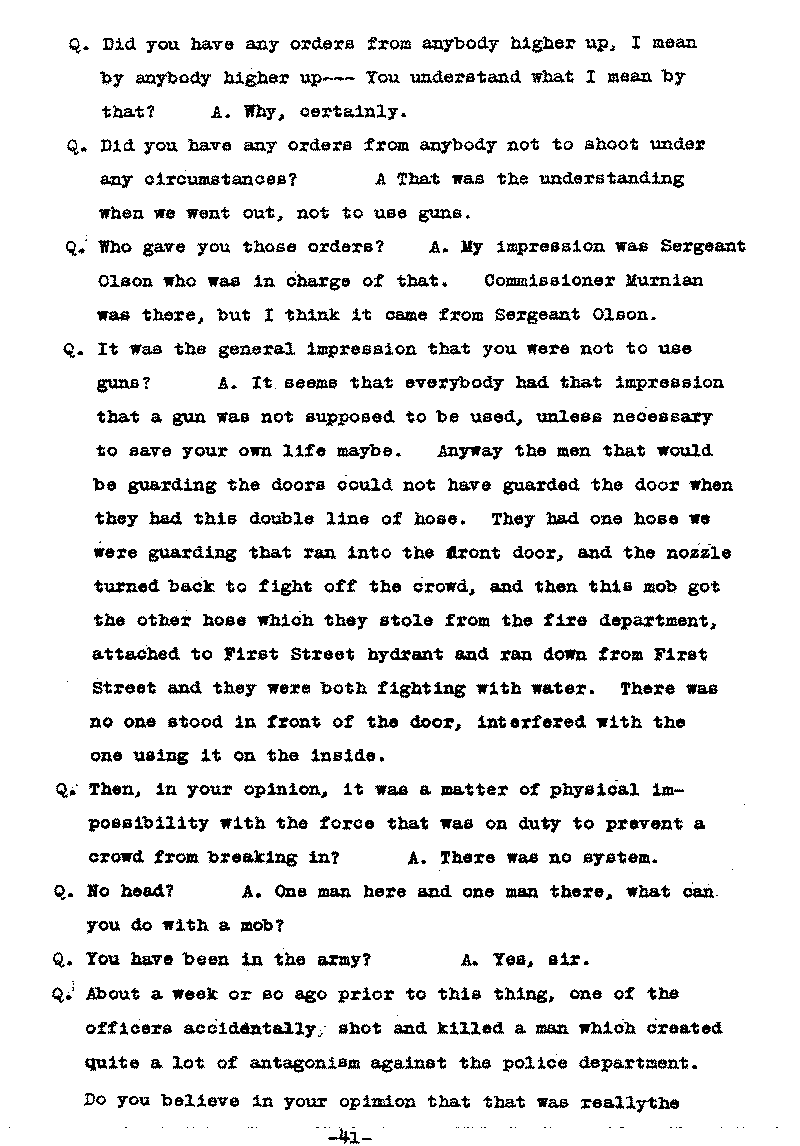
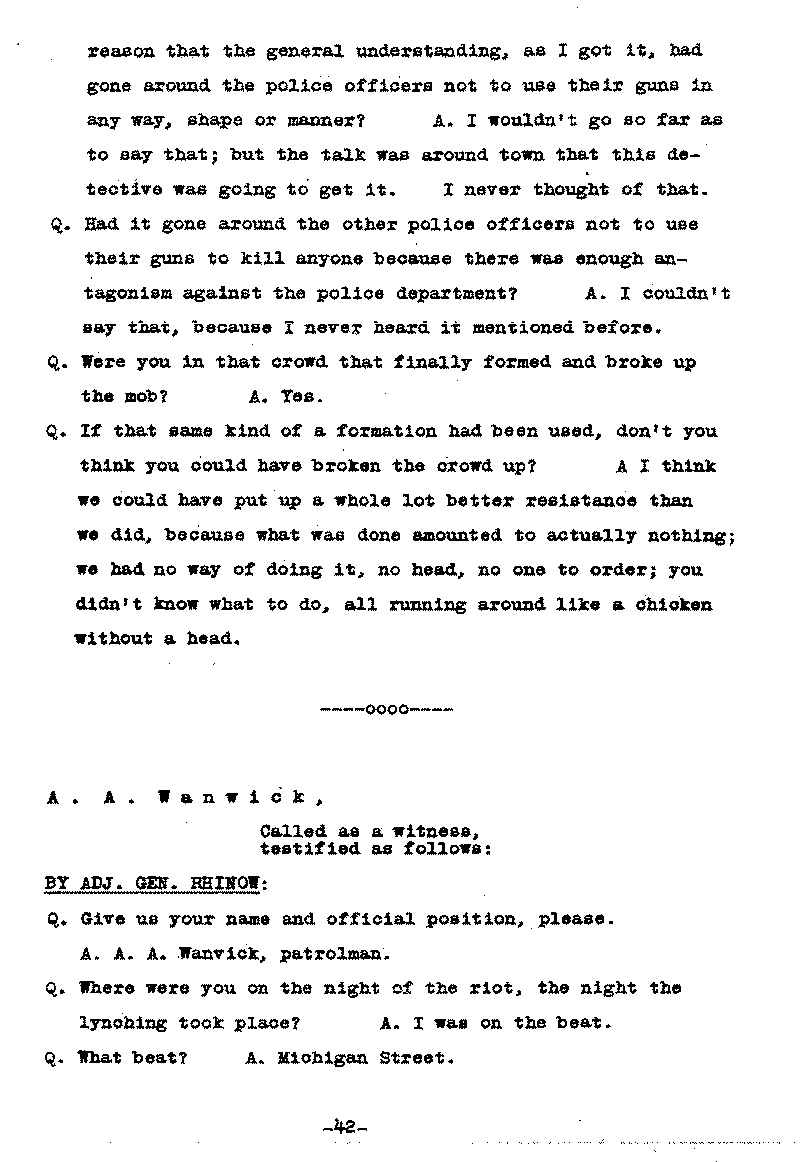
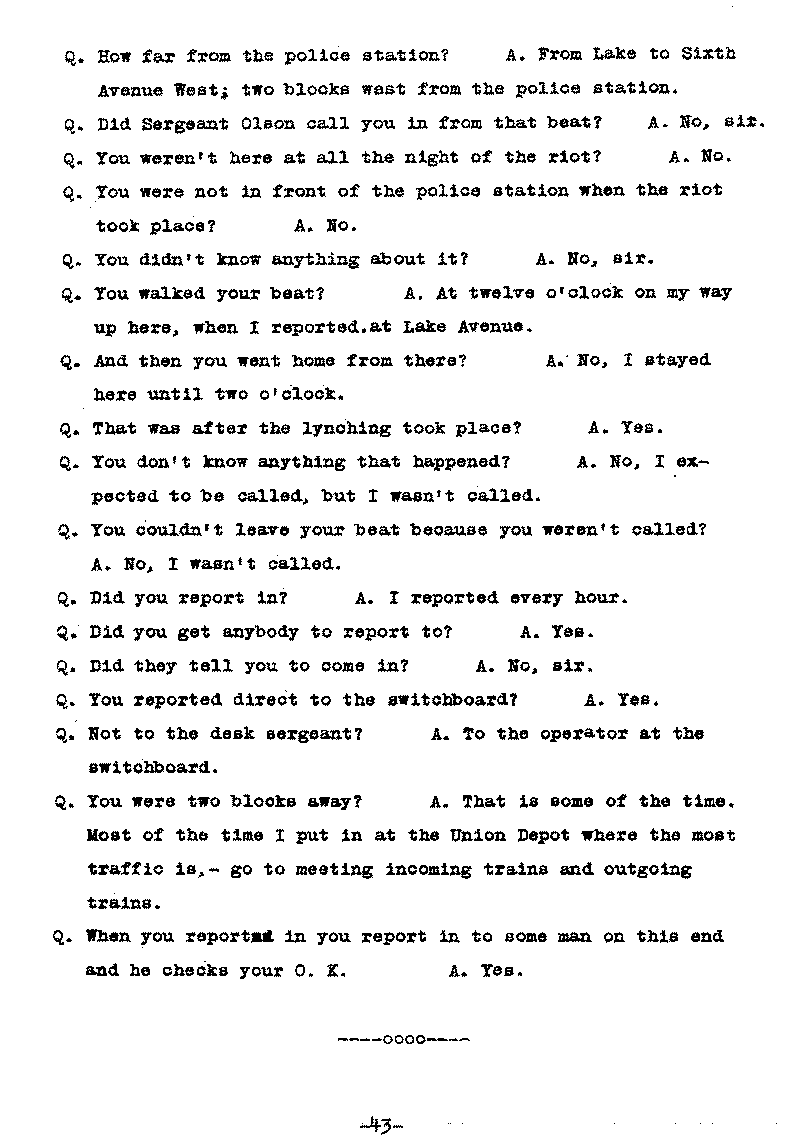
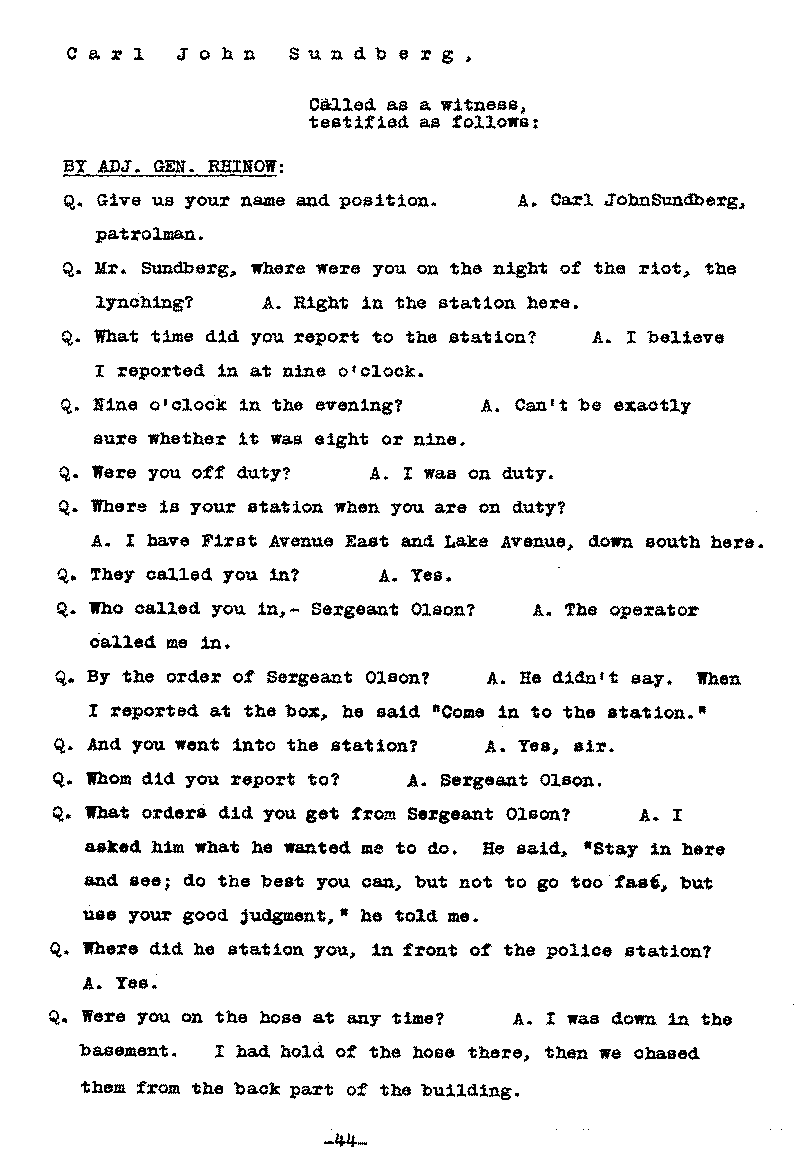
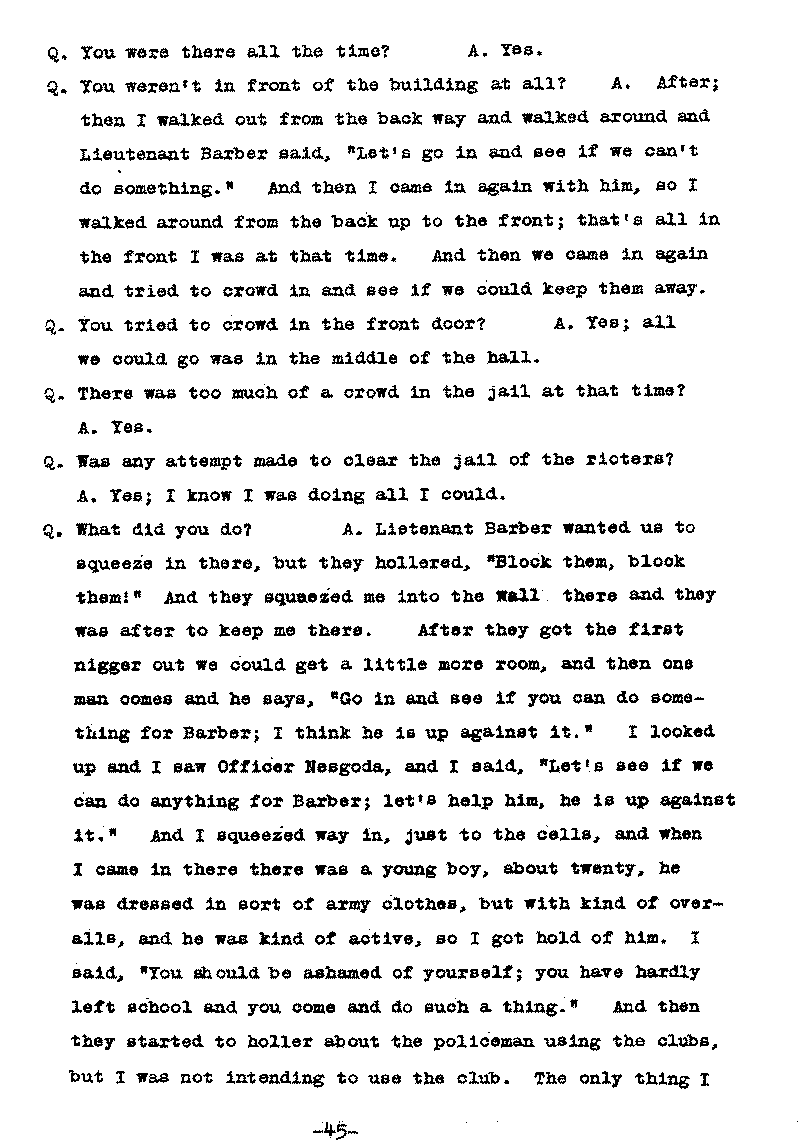
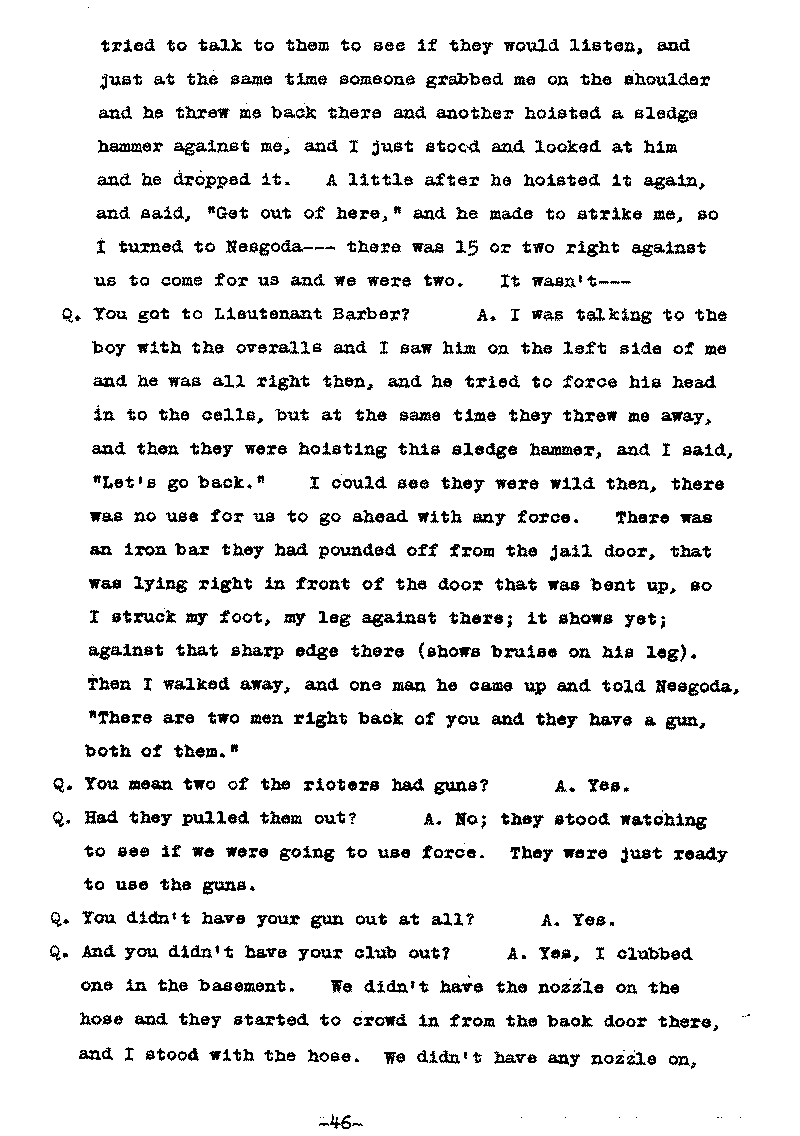
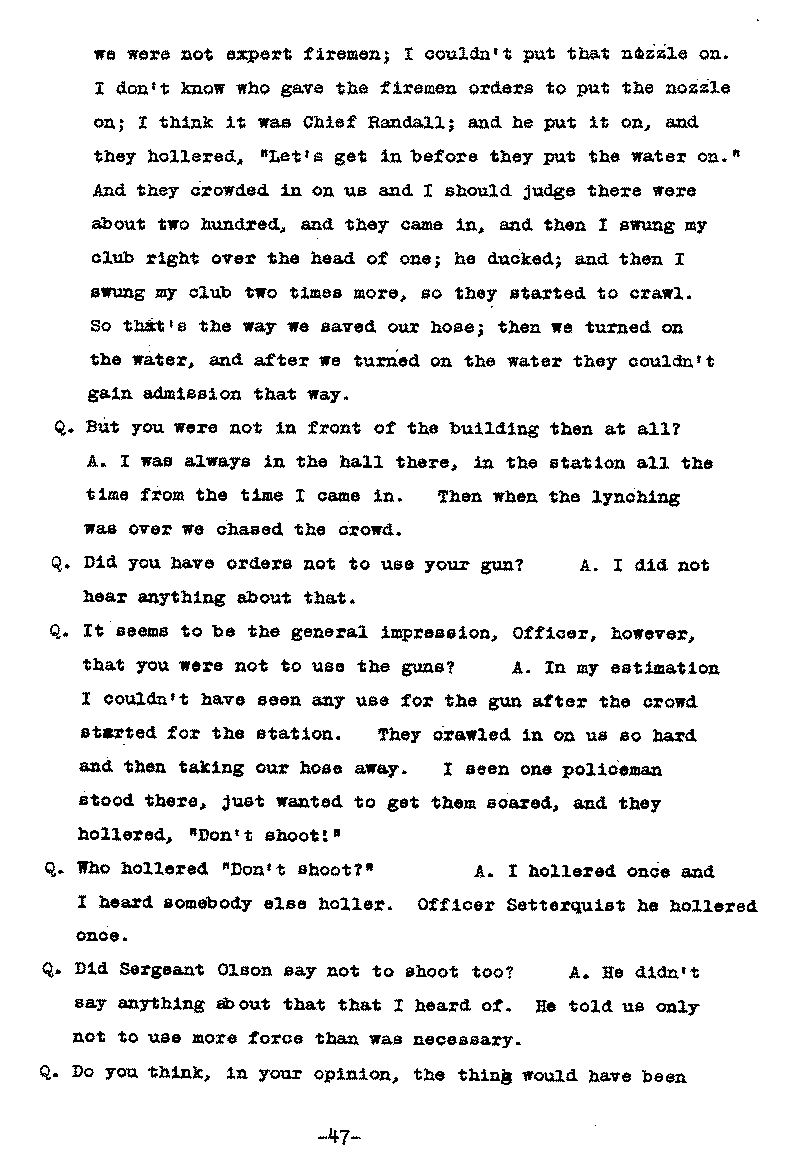
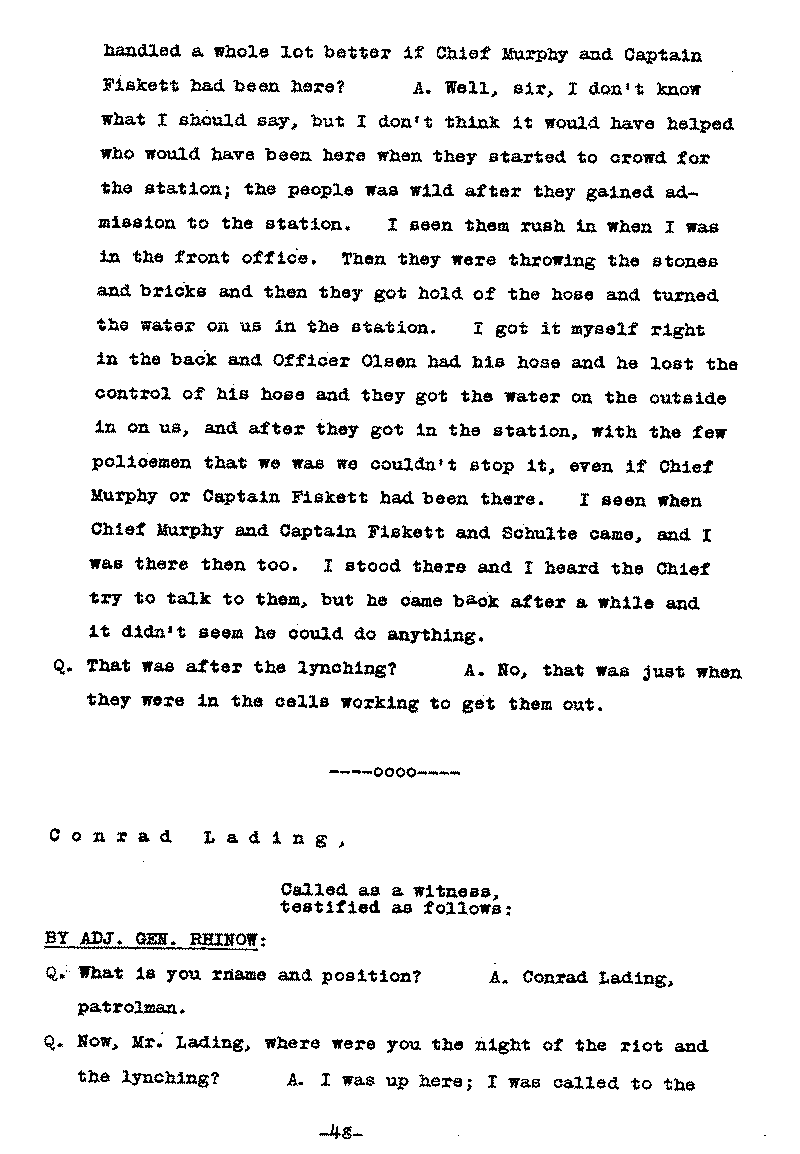
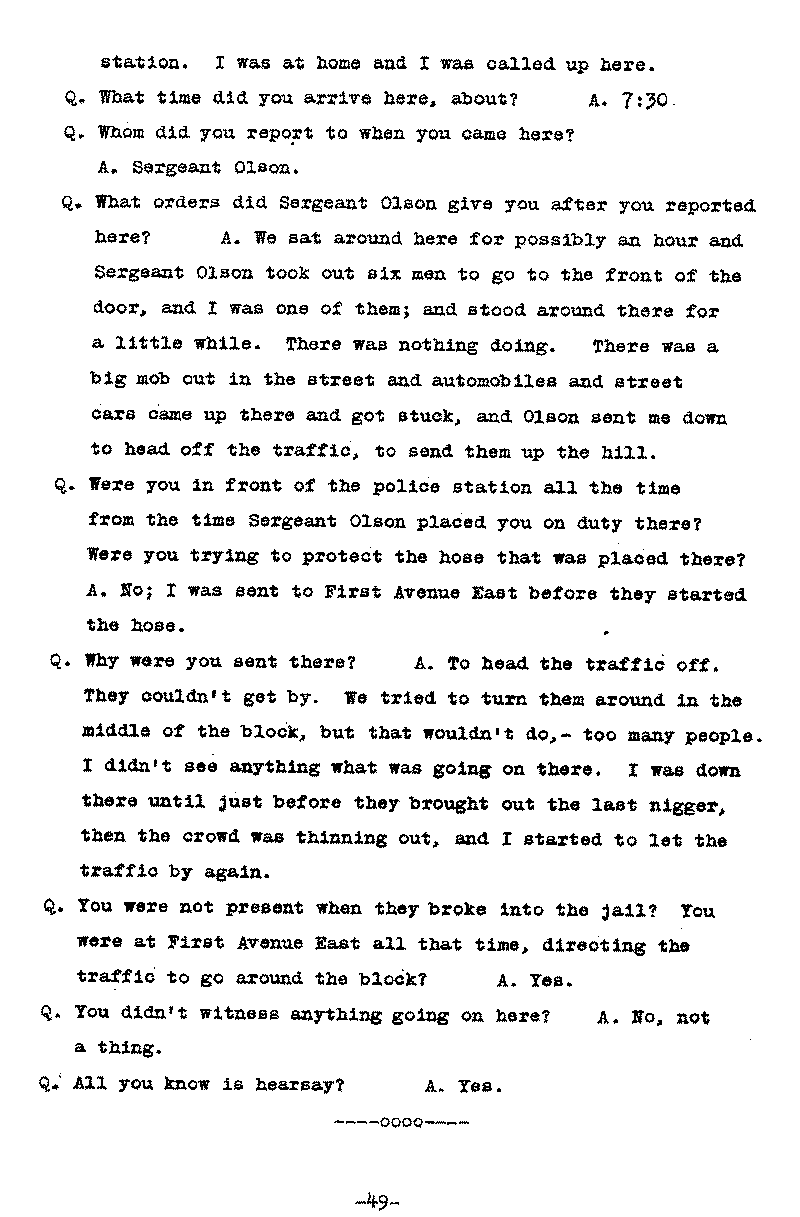
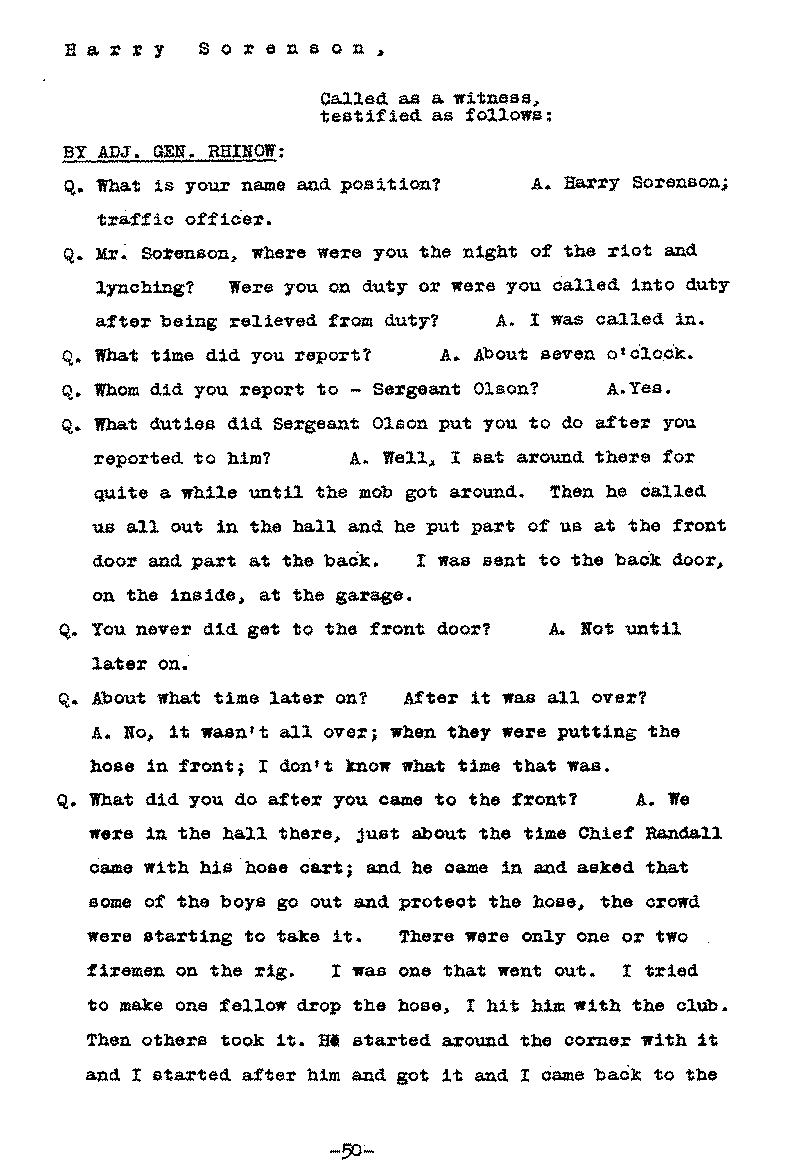
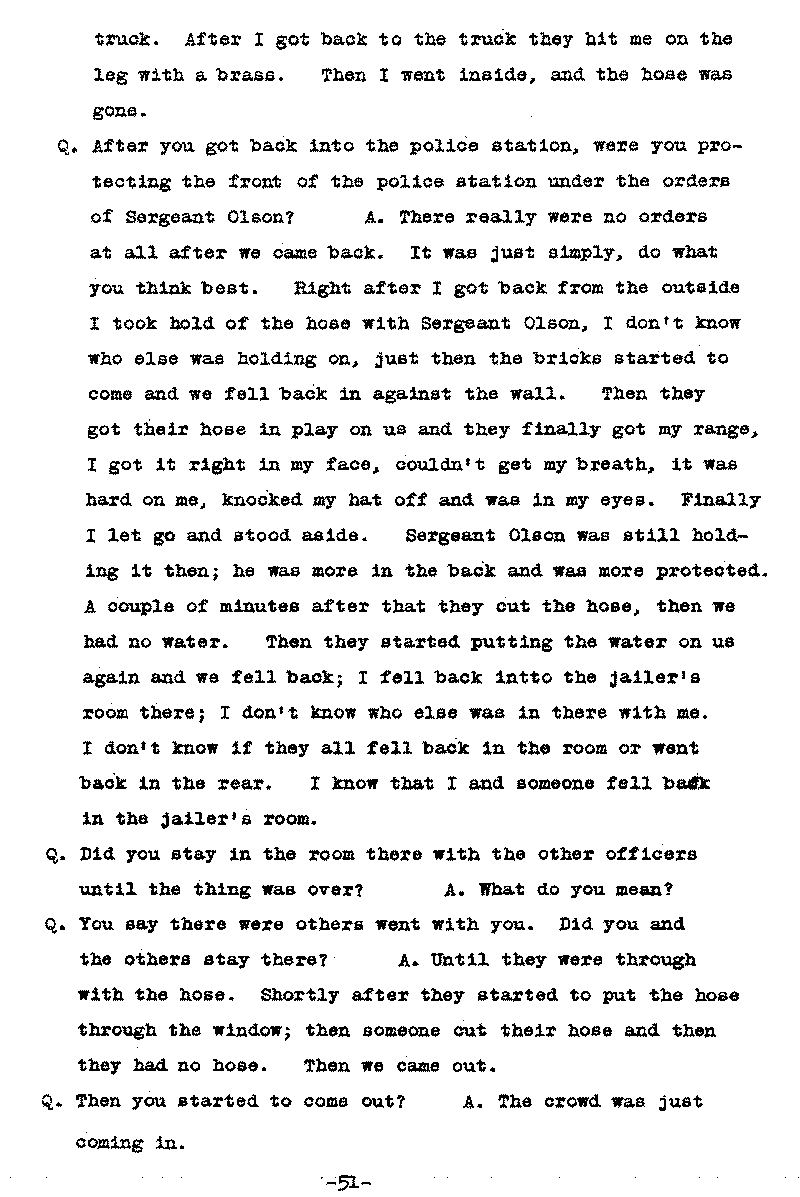
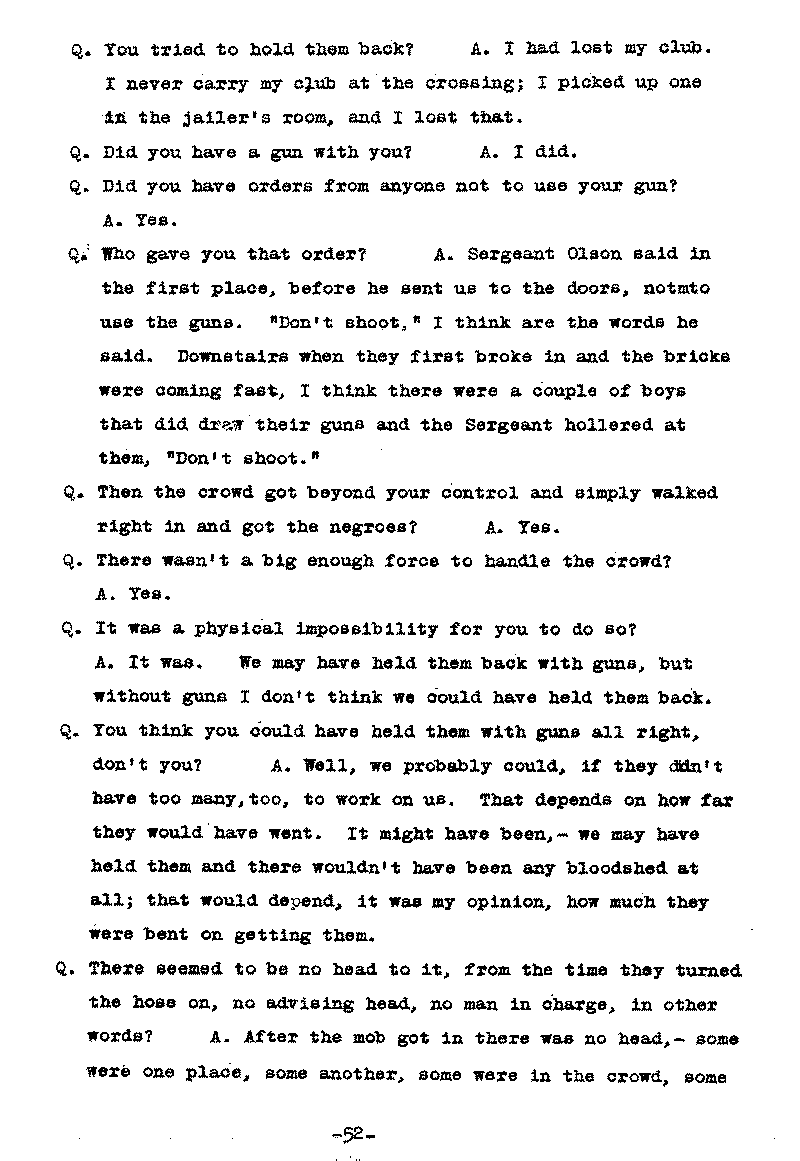
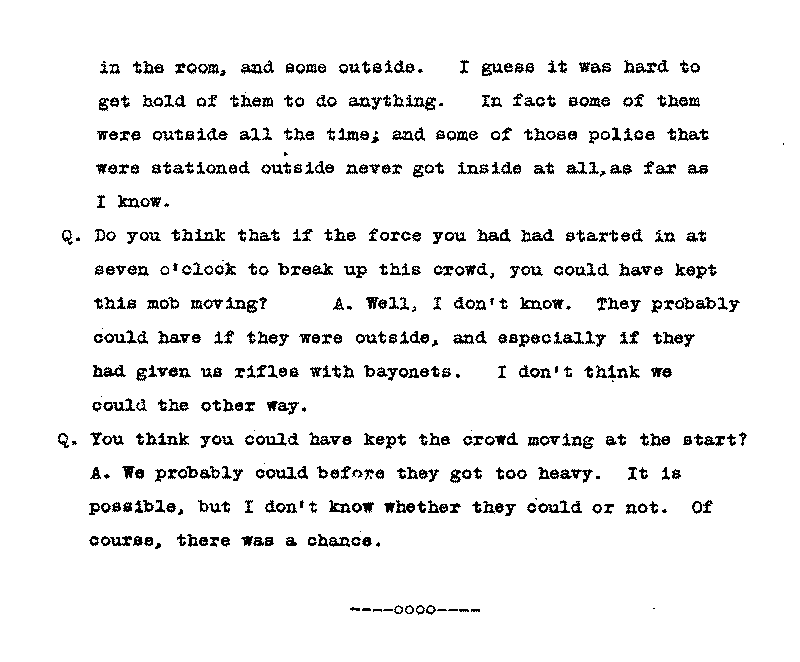
Image text
St. Paul Minn.
August 5, 1'920.
The Honorable J. A. A. Burnquist
Governor of Minnesota
St. Paul Minn.
Sir:
In conformity
with your instructions, I have the honor to submit the following report of my
investigation of the facts surrounding the lynching of three negroes by rioters
in Duluth on the evening of June 15, 1920:
1. Duluth Minnesota is
governed by a commission form of government. The legislative and executive
authority is vested in a mayor and four commissioners, the duties of the mayor
and commissioners classified as:
Division of Public Affairs
Division of Finance
Division of Public Works
Division of Public Safety
Division of Public Utilities
There is under consideration in this
report only the Division of Public Safety. The mayor and commissioners are
elected by vote of the people, and commissioners are assigned to specific duties
in charge of a division of the city's administration by a vote of the
commissioners including the mayor, a total of five votes. Three votes of the
five are necessary to elect to assignment.
Commissioner W. F. Murnian was
duly elected by the people and assigned to the Division of Public Safety, and it
is presumed that upon entering his duties as a Commissioner, he took the oath
usually administered to city officials,--to uphold the Constitution of the
United States and the State of Minnesota; to enforce the laws of the State of
Minnesota and the ordinances and regulations of the City of Duluth. He is
charged with the organization, discipline and, efficiency of the police force;
is privileged to select a Chief of Police, but all other members of the police
force are selected by civil service examination.
2. Evidence submitted
during the investigation disclosed that on June 14th "The John Robinson Circus"
was exhibiting in Duluth at a place known as the "Circus Grounds" and that among
those who witnessed the evening performance was a Miss Irene Tusken, aged
eighteen, residing at 4836 West 6th Street, Duluth Minn. It is alleged that
about 9:30 p.m. several negroes assaulted and ravished the young woman named.
Six negroes were accused and subsequently arrested at Virginia during the day of
June 15th.
The story of the assault upon the young woman spread rapidly
and indignation ran high. Rumors were afloat in West Duluth as early as 3 p.m.
that the negroes would be lynched that night, and a policeman on duty overheard
plans for the lynching at Police Headquarters as early as 5 p.m., and according
to his statement, did not report the facts until 7 or 8 p.m. About 5:30 p.m.
several young men on a green truck travelled [sic] down West Superior Street,
the principal street in the city of Duluth, waving a rope and shouting to the
bystanders to join a "neck tie party” at Police Headquarters.#2.
Commissioner Murnian does not admit that he had knowledge of the lynching
prior to his official notification by a police sergeant at about 7:30
p.m.
At about 8 p.m. a mob formed before the City Jail where the negroes
were incarcerated, and in unmistakable language declared their intentions of
over-powering the police, forcing the jail and lynching the negroes. Meeting
with no resistance from the Police Department, the mob grew rapidly, bricks were
being thrown freely, and it was reported to the police that there were fire arms
in evidence. Finally between the hours of 11 and 12 p.m., the mob overpowered
the inconsequential resistance then offered by the police, surged its way into
the jail, broke down the cell bars and took possession of the negroes. It
delayed for a sufficient period in the jail to hold a mock trial, the negroes
being permitted to testify as to their guilt or innocence, then hurried a block
from the jail, where they were hanged from a telegraph pole.
3. Since
Commissioner Murnian has served as head of the Division of Public Safety, he has
taken no active steps toward inaugurating the proper discipline in the
functioning of the police force. Of all the ranking officers on duty during the
period of the lynching, there seemed only one, Sergeant Olson, cognizant of the
significance of his oath of office,--and he should be commended for having
exercised an honest endeavor to perform his duty. Sergeant Olson made a valiant
effort to disperse the mob in its early formation, and prevent the lynching. Had
his fellow officers been imbued with the proper instinct of discipline, the
orders issued by Sergeant Olson would have unquestionably been carried out, and
the lynching would doubtless have been avoided, notwithstanding the insufficient
police force in Duluth. The attempt to now pass the responsibility of the riot,
and its outcome, to the Sergeant Olson in question, is quite apparent and
regrettable.
4. I request also to call your attention in this connection
to the handicap above mentioned, under which the safety department of Duluth is
operating; namely, the insufficient number of police. The very small force is
not large enough to properly police the extended area which it is called upon to
cover, most especially in an emergency of this character.
5. It is the
opinion of the undersigned that Commissioner Murnian erred appallingly in not
requesting the assistance of the sheriff, or the state, at a much earlier time
than he did. Prior action, it is believed, would have thwarted the rioters and
prevented the lynching. He having been present in the police station during the
assembling of the mob, and the ultimate lynching, and not having exercised the
duties required of him by his oath of office, is guilty of malfeasance in
office, and has shown a woeful lack of courage, decision and
competency.
The above resume of facts is respectfully submitted.
W. F. Rhinow.
The Adjutant General.
INDEX
JOHNSON, LOUIS 35
LADING, CONRAD 49
LAKE,
FRANK 39
MURNIAN, W. F. 29
MURPHY, JOHN
1
OLSON, OSCAR G. 10
PAYER, JOSEPH
33
SORENSON, HARRY 50
SUNDBERG, CARL JOHN
44
WANVICK, A . A . 42
----oooo---
TESTIMONY OF WITNESSES.
Investigation in the matter of the lynching of three negroes in the City
of Duluth, Minnesota, on June 15th, 1920, conducted by Adjutant General W. F.
Rhinow, in the office of the Commissioner of Public Safety, at the City Hall, in
the City of Duluth, on Wednesday, the 23rd day of June, 1920, at two o'clock in
the afternoon.
Present:
Adjutant General W. F. Rhinow,
Major Grady,
Major Beecher,
J. E. Samuelson, City Attorney,
Duluth.
----oooo---
John Murphy,
Called as a witness, testified as follows:
BY
ADJ. GEN. RHINOW:
Q. Please state your name and the position you hold
in the City of Duluth.
A. John Murphy; Chief of Police of the City of
Duluth.
Q. Will you tell me, Chief Murphy, in your own way, just what
happened
during this lynching?
A. I had a phone call at 2 A. M., that
was Tuesday, June 15th, from a man
by the name of Sullivan, working at the Duluth & Missabe ore docks. He asked me if I could come down to the docks immediately, as he had something
-1
of importance to tell me. I asked him if I needed any men with men, and he said I could figure that out after I had got there. I got a machine from the station and drove to the ore docks, and Mr. Sullivan informed me that a boy had told him that a girl from West Duluth had been raped by some niggers who were working for the Robinson shows. I then phoned to the N. P. dispatcher's office and asked if the show train had left their tracks. They said yes, they had gone to the D. W. P. I then got into connection with the yard master of the D. W. P., and instructed him to hold the train at West Duluth until such time as myself and the officers could get out there. I then phoned to the police station and told the sergeant in charge to round up at least ten or fifteen men. I then drove back to the station and sent for Captain Fiskett and Chief of Detectives, Schulte. We picked up what men we had gathered together and went out to West Duluth. We started down along the train on both sides, rounding up every nigger that was on the cars, put them into wagons, until we had got back to the coach that the niggers were sleeping in, what they call their colored sleeping car. We got all the niggers out and lined them up. We then got the different foremen of the show troupe to pick out their niggers that were working under their charge. We then got the timekeeper to check back and see that every man under them was there for the roll call, as we had figured that the niggers that committed this deed were ones that must have been idle between nine and ten p. m. of the 14th. Detective Schulte and Captain Fiskett questioned each one of those crews that were idle and picked
-2
thirteen niggers out of that bunch as ones that were in some way implicated.
We then allowed the train to proceed to Virginia. We marched the thirteen
niggers down to the street car tracks at about 60th Avenue West, and we came in
with the machine. After we got the niggers in here we investigated from them as
to what part they took in the doing, and we had come to the conclusion that four
of them were guilty, one was doubtful and one we held as a witness, that was
this nigger Isaac McGie. During this investigation we had we discovered that
there were several other niggers, of which we had got their names, that had
gotten away from us and had went with the show to Virginia. Myself, Schulte and
Fiskett then got in a machine and drove to Virginia, leaving Duluth at 12:02; we
arrived at Virginia somewheres around 3:30. At about the time we arrived at
Virginia this circus train had arrived there and one or two wagons were driving
up the street. We thought it was best for us not to be seen, as some of these
niggers that we wanted might try to get away, so we turned the matter over to
the Virginia police and they called on some of the deputy sheriffs there. With
the assistance we got from some of the foremen of the show troupe we picked out,
I think it was, nine more niggers that we thought were implicated in it. We left
Virginia at 8:10 with four of the niggers to come to Duluth, figuring that we
would have the deputy sheriffs take the other five to Duluth on the morning
train. We lost about 30 minutes getting out of Virginia, on account of getting
turned around on the streets, and then came direct through on the Vermillion
Road. At about 10:30 or 11 o'clock we met Commissioner Farrell, driving north,
about 17 miles, 16 or
-3
17 miles out of Duluth, and he told us that the mob had gone down to the police station to take the niggers and that it wouldn't be safe to take the niggers we had with us in. I then asked Farrell to take the niggers over to his place, which is about a mile or so further on, and keep them there and we would drive in and come out later. He also told us not to drive into the station with our machine, as the machines that were there were broken up by the mob. So we drove into the fire station at Sixth Avenue West and First Street and asked the men at that department what was going on at the police station. They told us the mob were down here after the niggers, and we left our machine there and Schulte, myself and Fiskett walked east on First Street to First Avenue West and down First Avenue and then to the police station. From information that I have received, one of the niggers was hanged before we arrived at the station. When we went in there was quite a mob of people in the station, the big jail was jammed full. I tried to talk to the people outside and asked them to disperse and go away from there, that if they would leave us alone we would get every nigger that was implicated in that crime. We then tried to get in through the door of the big jail, but the mob was such that it was impossible for us three men to break our way through. There was one man standing inside the door – I have since found his name was Mr. Luzon - reached out through the door when Captain Fiskett was trying to shove in and said "Get the hell out of here or we will get you." I saw the mob was such that we couldn't do anything with it, so I said to Schulte and Fiskett, "Let's get out of here where we can get the militia." We then came over to the City Hall.
-4
First I tried to use the telephones at the station here, but they were both out of order. I tried to raise the sheriff, tried to raise Major Weaver, but I couldn't raise them, so Schulte sad Fiskett and I sat down and talked the matter over, and I said, "I think the best thing to do now is to get every officer we can get together and if we can get enough men we will throw cordon around the jail and start throwing those fellows out." By the time we got our men together we had somewhere around thirty. We then went back into the jail. I don't believe it was over ten or fifteen minutes at the most from the time that we arrived here until we had rounded up this bunch of officers, until we got back to the jail. I didn't see any part of the hanging or see the niggers at any time. I might also say that in driving up I spoke to Fiskett and Schulte that there might be something happen in Duluth, that is as to taking those niggers out there.
Q. You mean when you were driving--- A. When we were going to Virginia. One
of them said he didn't think anything would happen in. this part of the country,
that if it were down South it might. After we got to Virginia, Captain Fiskett
said, "You better telephone in, as there might be something doing down there."
So I telephoned to the station. I believe it was Sergeant Olson here that
answered. I asked him if there was anything doing down there and he said, "No.
everything is quiet." I told him to get every available man, day and night,
where he could get him on short notice if needed, and if any crowds assembled to
disperse them and see that the niggers were protected, and if anything happened
to call me back
at Virginia.
-5
Q. That was about two o'clock? A. 4:15, it must have been aground that
time.
Q. That was in the afternoon? A. Yes.
Q. When you left here, if I am not mistaken, you stated that you left here about 12:02? A. It was just 12 ; 02, because Schulte wanted to see what time we would make up there.
Q. There was no mob congregated, or that you had the least idea that there was going to be a lynching affair, or that the ,jail was going to be stormed, or anything else?
A. Everything was quiet, didn't hear a word, not a word that anything was going to happen, or talking of it.
Q. Whom did you leave in charge here, Chief Murphy, when you went to Virginia? A. I didn't designate anybody when I left. The sergeant or lieutenant who was at the desk, is always in charge.
Q. If I understand you correctly, during your absence at any time outside of the city, the sergeant or lieutenant is the one who automatically takes charge? A. Yes.
Q. Who was that? A. Sergeant Olson,-- Sergeant Olson says that Lieutenant Holstrum was called in after I left.
Q. Then Lieutenant Holstrum should have been in charge during your entire
absence? A. No, until he shift was over and the next man comes on.
Q. You
had no Assistant Chief then? A. No.
Q. After you came back, Chief, and you found the crowd was so great that it got beyond control of the police department, what effort did you make to ask for assistance from anyone? A. I called for assistance from those around there, if there were any citizens to come and help us, and
there wasn't even one solitary man, that made an attempt to come inside and
outside the police station.
-6
Q. Did you ask the fire department, the men of the fire de partment to help
you? A. I did not.
Q. Did you ask the Chief for assistance? A. I did not.
For the reason that I
could not raise the sheriff.
Q. You tried to get
the sheriff? A. Yes.
Q. But couldn't get him on account of the phones being
put out of commission
by the mob? A. I did afterwards get the sheriff's
wife and was told
he had gone to the court house, gone earlier in the
evening.
Q. Who followed the lieutenant in command at the station?
A. The
sergeant.
Q. What sergeant was it? A. I couldn't say as to that offhand.
(Witness
confers with Sergeant Olson.) Sergeant Olson said that he followed
the
Lieutenant.
Q. Who is the man you talked to from Virginia? A. I
wouldn't say for sure.
When I called the station I got the operator and I
said, "Get me the
sergeant in charge." The phone was buzzing some; I don't
think I asked
who it was talking, but I think it was Sergeant Olson. I
wouldn't say for
sure.
Q. How many sergeants have you who take charge of
the desk?
A. Either a sergeant or lieutenant takes charge of the
desk.
Q. How many have you? A. One in charge.
Q. During the entire
twenty-four hours? A. Three. It's either a sergeant or
lieutenant,- their
capacity is just about the same, only the title is different.
Q. You have
talked over the telephone to these offices before at various
times? A.
Yes.
Q. Don't you think you would recognize the voice? A. I could if the
phone was clear, but the phone was somewhat buzzing. But I could understand
what he said.
-7
Q. It is easy to tell from the desk record who the officer was in charge?
A. Yes.
Q. I wish that that information be secured. A. Sergeant Olson
says that it
was he who answered the phone.
Q. You directed Sergeant
Olson to take the necessary precautions? A. Yes.
Q. What time did you
arrive here? A. It was somewheres around midnight, it was between eleven and
twelve o'clock. I didn't look at my watch from
the time we left Virginia; it was 8:10 When we left. We lost maybe twenty or thirty minutes getting out of Virginia, but I know I drove at a good rate of speed.
Q. Are you in a position to know whether they lynched anybody after you reached here? A. No. But from what I heard since I know one was lynched before we arrived.
Q. When you entered the jail they were still attempting to get in? A. I
couldn't see, we couldn't get into the jail
Q. You have a jailer, I suppose,
here? A. Yes.
Q. What is his name? A. Fred Harling.
Q. He was on duty at
that hour? A. Yes.
Q. He had the keys for the different cells? A. I believe Jailer Johnson had
the keys, because he told me he wouldn't give up the keys to the
cells.
SERGEANT OLSON: I had the keys.
Q. As I understand it, one man has
the keys to the cells and another man the
keys to the corridor? A. The
jailer generally has the keys.
Q. But at this particular time when the mob
came in, at that particular time,
Sergeant Olson had the keys, did he? A. I
couldn't say as to that
because I wasn't here at that time.
-8
ADJ. GEN. RHINOW: Sergeant Olson, you had them?
SERGEANT OLSON: Yes, the
keys to the cells.
Q. What fire-arms have you? A. Club and 32 revolvers; we
also have 45
rifles.
Q. That equipment then consists of a club and 32
revolvers and you have a
supply of 45 caliber rifles. A. I wouldn't say as
to the caliber of them.
Q. How many of those rifles are there in the
station? A. I believe there
are 45.
Q. Have you any rules or regulations
covering the use of either offensive or
defensive equipment? A. Well,
nothing more than the law.
Q. Do you have any practice in using any of that
equipment? A. The only
thing we practice with is the revolver.
Q. You
have a pistol range? A. We have pistol practice; that has been
spasmodic.
Q. Not a regular procedure? A. We aim to mate it regular, but
it is irregular.
Q. At what time were those 45 rifles brought into use in
defense of this
building? A. After we had the conference here in the city
hall.
Q. Which was after the colored men had been removed? A. I believe
they were removed then; I couldn't say as to when they were removed,
before we got in or after we got in, as I didn't see any part of
it
Q. You took the other three men out? A. Yes. Not myself, personally.
Q. At about what time after you had secured these rifles and had put them to
use, did you remove these other three? A. Just as soon as we got the rifles and
threw the men out
-9
in front of the station--- Fiskett was inside, Schulte was inside, and I don't know what man it was took these three niggers downstairs and out the back way, and put them in the machine. Before they were taken everybody was cleared from behind the building, and the mob was up on Superior and Second Avenue East.
Q. At any time during the riot was a shot fired either by the patrolmen or by
any members of the mob? A. Not to my knowledge. I understand that there was one
shot,- I have heard that there was one shot fired by the mob, but I don't know
if there is any truth to it.
---ooo---
Oscar G. Olson ,
Called as a witness, beatified as
follows:
BY ADJ. GEN. RHINOW:
Q. Will you give your full name,
your title and what your official duties are? A. Sergeant Oscar G. Olson.
Q. If you will, tell me in your own way, what you know of this lynching in Duluth here? A. Why, on the morning of the 15th, at three o'clock I received a phone call at home, I was in bed sleeping, and I answered the phone and the operator at headquarter station asked me to report at
headquarters at once. I dressed and went down here as soon as I could. Got
down here about 23 minutes after three, and while in the station here I heard
that there had been some negroes had assaulted a young girl at
the
-10
circus grounds, and together with other members of the police force we
went out to the West Duluth police station, and from there we went out to the Canadian Northern yards where the circus train was to leave town, and we rounded up possibly about 200 negroes there and lined them up. Each one was talked to separately by Chief of Detectives Schulte and the Captain of Police, and after we got through talking to all of them we left there with twelve or thirteen negroes; took them to the street car and brought them here to headquarters about 7:30 that morning. I went home and went to bed. My wife called me at 2:30 in the afternoon; had a little lunch end went down to work and reported for duty at 3:35. I took charge of the station at four o'clock. Shortly after four I received a phone call from Chief Murphy at Virginia. He asked me how things were down here and I
said everything was all right; I hadn't heard anything yet; and he instructed
me to---if I heard of any mob gathering, to see that I could get all the police
that were off duty, so that I could get them on short notice, and also, if I
needed to, to get the sheriffs. So a little later I received a phone call asking
me if I had heard of the mob going to lynch the negroes that were in jail. I
told this party I hadn't heard any such thing.
Q. Who was that party? A. I
don't know!
Q. What time was that, about? A. Possibly 4:30. And I called in a motorcycle
officer, instructed him to go down the street to see if he could see mobs of any
sort, out of the ordinary, down the street. If he did, to find
out what they
were talking about. Instructed him to go to different pool
halls or places
where there might be
-11
young men gathering. He came back about forty-five minutes later and
told me that he didn't see any mobs, didn't hear anything in particular about mobs coming here to the station to lynch the negroes. Sometime
later there was a business man from West Duluth came in and told me that he thought there might be some trouble here to-night.
Q. What time was that? A. I think that was between 6 and 7 o'clock. So I then
instructed the operator to call all the men off duty and to report at police
headquarters at once, and also call in the men on the outlying districts, and
also call the sheriff.
Q. What time did you call the sheriff? A. I believe
that was a little after
seven.
Q. Did you talk to the sheriff
personally? A. No, sir; one of his jailers.
Q. What did you tell the jailer
at the county jail? A. I told him that I had
heard that there may be a mob trying to lynch the negroes that we have here
in jail and that I would like to have the sheriff notify and have him get all of
his deputies, as many as he could spare, and get down here and give us
assistance if we needed it. I also called the chief of the fire department, told
him what I had heard, and asked him for assistance, hose and men; and he said
that he would instruct his men so that if they got a call from the police that
they would know what to come with. And I also called up the Commissioner of
Public Safety, told him what I had heard, told him what I had done, and he said
that he would be down.
Q. What time did the Commissioner of Public Safety
come down, about? A. Shortly after 7:30, 1 believe. And when
-12
he came down he and I went into the Chief's office. I told him the number of men that I had, that had already reported, which was eleven uniformed men; also told him what my plans were, and we talked the matter over in general, and were under the impression that the mob would probably try to run a bluff and that we would call their hand, and that would be about all there was to it.
Q. By stating there what your plans were, you mean that you had notified the
outlying policemen to come in and you had also notified the Chief of Fire
Department to assist you, and also the sheriff; that's what you mean by your
plan? A. Yes. And a short time later---it was sometime before this; I got a
little ahead of my story--I instructed the jailer who was on duty at the time,
Fred Harling, that we better try and see if we can get the negroes out of here.
I said, "It is better to play safe and be sorry." So we attempted to get three
negroes out at one time, and we only got one out---couldn't get him out of here
or back into the jail without being seen by some people at the back and also at
the front of the building, which we thought might be some of the mob.
Q. At
what time was that? A. That was,- Oh, from five o’clock on.
Q. Had the
crowd collected at that time? A. There was no crowd, but an
unusual number
passing by and stopping, that had passed by on both
sides of the street.
Q. What fear had you of running those prisoners through a few passersby?
A. My idea. of not taking them out was, I was afraid if they were taken away
from the police, in taking them to some place of safety, the general
public might think the police turned them over. About eight
o'clock
-13
there was quite a number had gathered. I was receiving a number of calls about shooting at different places, different parts of the city, and I took it for granted that they were false alarms, and I didn't send anyone on them, because I wanted to keep as many men as I had. And a few minutes after eight o'clock there was a mob gathered that packed this block here, in a very short time, and I called the men out, stationed six out in front and
four or five in the rear of the building; and we beat them off the front, then they went around to the back of the building and we beat them off there.
Q. You mean you had. to use physical force? A. Some of the policemen used their clubs.
Q. On the crowd, and beat them back? A. Yes. And the fire department came down here and made a connection with this hydrant on the corner, and they were already starting to out the hose when I took what men I had stationed in front to guard the hose between the entrance of the police station and the hydrant. They used the hose on them, and they had broken in the outside door and gotten into the garage and they were starting to come up the stairway, the back way, when we got the hose connected, and we fought them back with the water. We fought there for sometime and we beat them off there and then came around to the front and then turned the hose on them at the front. There were a few policemen in the crowd; and when they were in the back I ran out on to the street, I covered almost half of this block, and appealed to the citizens for help and no one responded to my appeals, so I went back to the station, and then the mob came around to the front and I myself took hold of the hose and ran out as far into the
-14
street with it as I could, to drive the crowd back. There were one or two
officers with me at the hose and the mob was firing bricks, stones and anything
they could got hold of at us. And I had, gotten in touch with the Chief of the
Fire Department, asked him if we couldn't get some more hose and a wagon was
sent up after some more hose, and when they came down here the mob took the hose
away from the firemen, attached it to the hydrant and turned the water on the
police. Finally the mob cut our hose and had broken all the windows in front of
the building, broken down one of the front doors. Our hose was cut and we had no
water. They finally got as far as the front door and I attempted to get out to
talk to them. I couldn't get out. I stepped back into the front office and they
turned the hose on me and also started throwing bricks through the
windows.
Q. How many men did you have on duty at the front door when the
water was
thrown and after the bricks were thrown? A. Just before the mob came in?
Q. When the mob was attempting to break in, just when they were throwing bricks and stones, how many men did you have on duty there?
A. Myself and two or three others.
Q. What had become of the rest of
them? A. I don't know.
Q. Anything that was thrown through the windows and doors, did it hit any of
the policemen? A. Yes.
Q. Hurt them? A. Yes.
Q. Did it disable them so they were put out of business, knocked out unconscious, or anything like that? A. No.
Q. Did they all have the usual weapons with them that are required by the
police department? A. Yes.
Q. Why didn't they use revolvers, why didn't they
shoot?
-15
A. I took the eleven policemen, before I stationed them out in the front and back, and cautioned them about chewing the rag, getting into arguments and not to talk to anybody, "and if you have to shoot,” I says, "shoot." "But," I says, "we have no ammunition; all 'I've got in my charge is 31 cartridges, and I don't feel like starting to shoot and lose out on top of it all. I says, "Keep away from shooting as long as you can."
Q. Each officer, while he is on duty, doesn't he carry a gun loaded all the
time? A. Yes.
Q. What kind of a gun does the regulation prescribe that an
officer should
carry? A. It's a .32 Police Colt's.
Q. A .32 caliber,
six barrel Colt Police Revolver? A. Yes.
Q. They all have those, and
loaded, all the time? A. Yes.
Q. You had six men there? A. Yes.
Q. Did
you yourself order them not to shoot? A. I cautioned them about
the
shooting; they were not ordered not to shoot.
Q. Isn't it the custom of a police officer of any city or municipality, when
he is attacked by anyone or by any number of people, and isn't he acting under
the law, if the person or persons who attack him get the best of him, isn't it
the custom of that officer to draw his revolver and shoot, if necessary to
defend his own life? A. Yes.
Q. Why didn't they do it in this case? A. Why
didn't the police do it?
Q. Yes. A. I don’t know.
Q. Your orders
to the policemen, then, was that they could shoot if they
wanted to protect
themselves? A. Yes, sir.
Q. But you did not want them to shoot until they
actually had to protect their
own lives, was that the idea? A. Until they
really had to.
Q. Those were your orders? A. Yes.
-16
Q. How many police officers were on duty in and around the police station
about the time that the crowd started to break into the jail, including the
jailer and yourself? A. Twelve with myself.
Q. Do you believe, if your
own opinion, that if the police officers would have
used their revolvers,
they could have kept that crowd back? A. No, sir.
Q. Why? A. Because if they had---I believe that if there had been one shot fired by anybody, either the mob or police, that there would have been at least between a hundred and fifty or two hundred people either injured or killed.
Q. But isn't it the sworn duty of a police officer of the City of Duluth to protect life and property at all cost? A. Yes.
Q. And it was your duty at that time to protect the lives of the negroes
whom you had in jail? A. Yes.
Q. You receive your instructions from the Chief
of Police, do you not?
A. Either from the Chief or the Captain.
Q. Who is
the Captain? A. Capt. A. G. Fiskett.
Q. He was in charge----He was not here
at that time? A. No, sir.
Q. That left you automatically in charge? A.
Yes.
Q. Is there anybody else whom you took orders from? A. No,--The Commissioner
of Public Safety.
Q. Did you receive any orders from the Commissioner of
Public Safety? A No.
Q. None whatsoever, during this riot? A. None that I
remember.
Q. What was the condition of the jail and the people in general
outside as
they forced themselves through there, when you couldn't handle
them any
longer, when they got beyond your
-17
control; can you explain me a little something about that? A. The condition
of the mob and the condition of the jail where the negroes were kept?
Q. Yes. The mob had broken through, the mob had gotten beyond you, they had
broken through, they had gotten beyond your control. What was the condition of
the mob, what were they composed of? In your opinion, do you think that they
carried arms or weapons, or clubs or stones or anything to use force to get to
the negroes, used force to overpower
the police? A. My opinion of the mob
was that they would stop at
nothing. While we were holding them back – I couldn't see who was talking, but I could make out from the actions of the crowd, when someone was talking on law and order, and you could also tell when there was someone talking in favor of the mob. You could tell that by the actions of the crowd. They would hiss and hoot and threaten to lynch and hang a man or person who was talking on law and order and they would cheer and clap their hands when someone was talking in favor of the mob. The people out in that crowd were everything from a baby carried in the arms of women to old men and women.
Q. That's the crowd right in front of the door, that was composed of that class? A. Not right in front of the door; throughout the crowd.
Q. Some place in the block you mean? A. You would see several women--- After I had gone out the front entrance, I stepped into the front office and looked through the window. I had one little look before they turned the hose on me, and I noticed right at the front entrance in the crowd was a large bunch of half-grown men, and in the crowd behind them and every place you looked there were women. I did notice
-18
some women in the crowd with children on their arms, and I also noticed cross the street on top of a building that there were several men on top of the buildings.
Q. Did you recognize any of the men in that crowd who broke into the jail
into the police station and into the jail? A Yes.
Q. Do you know any of their
names? A. I have heard the names since.
Q. Then, in your opinion, Sergeant
Olson, you did the best you possibly
could and in accordance with your ability to pro tect the life and property
in and around the jail, until the crowd got beyond your control, is that the
idea, with the force you had on duty? A. Yes.
Q. You say you had 31
cartridges? A. Yes.
Q. By that you mean the complete supply for the entire
force was 31? A. Yes, that I could get at.
Q. Besides the six you held in
your revolvers? A. Yes.
Q. That was the total amount of ammunition on
hand? A. Yes.
Q. At the time you were arranging for hose and other means of
defense, did
you make any attempt to secure further ammunition? A.
Yes,sir.
Q. Where did you send for that? A. I instructed the operator to call the
Secretary of Police. He is the only one I know of who had a key for
the---
Q. Did he get the Secretary of Police? A. Yes.
Q. Did the
Secretary of Police bring further ammunition to you? A. No.
Q. Did he give
any reason why he did not, or has he since given reason why? A. I asked him
about it later.
Q. Did he admit having had a call for ammunition? A. I think
he did.
Q. Don't you known? A. No.
-19
Q. Who Is the Secretary of Police? A. Fred Johnson.
Q. Is that his entire vocation, Secretary of Police, or has he another
business? A. That's his only position.
Q. Did you know of the other
equipment, such as rifles, being in the building? A. Yes.
Q. Was there any ammunition for the rifles in the building? A. That I didn't know until later, until after.
Q. In other words, the only preparation you made was the call for assistance
from the Fire Department with hose and the Sheriff's office with deputies, is
that correct? A. Yes, and I called all the men I could get hold of on
the
Department.
Q. Do you have any training in riot duty? A. No, sir.
Q. Were any commands given for formations to hold these crowds? A. Not
outside of the six men I stationed out in front.
Q. And the only instructions
they had was prior to the mix-up? A. Yes.
Q. And no orders were given from
that time on? A No, sir.
Q. Admitting what you say regarding the presence of
women and children in
the crowd, do you not, in your own opinion, believe
that had you drawn
your revolvers, had stationed a prohibitive line for this
crowd to cross,
such as the curb stone or some other line, do you not
believe, in your own
opinion, that the women that might have been in the crowd would have gotten
out of the way, and only such men as were not afraid to face these pistols would
have been re mained in front of it? A. They could not get out.
Q. Why? A.
The crowd was ,jammed so they couldn't possibly get out.
Q. At the time the
Secretary of Police failed to supply you
-20
with further ammunition, did you make any further attempt other than through
that channel, to secure ammunition? A. No. I did not.
Q. You telephoned to
the jailer, over at the sheriff's office? A. Yes.
Q. What was the name of
the jailer you talked to? A. I don't know.
Q. There was a crowd started to gather about 6:30, was there, in front of the station? A. There was no crowd, but there was an unusual number of persons passing by, people passing by that were not accustomed to passing by daily.
Q. When did you first notice the congestion of traffic so you couldn't drive
up and down, the street easily? A. Shortly after eight.
Q. The walk was
blocked in front of the station? A. Yes.
Q. Did you make any attempt to
disperse the crowd? A. Yes.
Q. That was with the six officers you speak of? A. I don"t know whether the
six were there at the time or whether there were only two or three besides
myself.
Q. And you couldn't disperse the crowd at eight? A. It was a little
after
eight?
Q. You couldn't do that? A. No. sir.
Q. Did you use your clubs in an attempt to do that? A. I didn't have no
club.
Q. Did the rest of the officers? A. I think they did.
Q. Did they
use their clubs? A. I don't know.
Q. You were with them? A. I was very busy; I didn't watch the other officers, what they were doing.
Q. In other words, Sergeant, you allowed a crowd to gather beyond your control before you took steps to disperse them, is that true?
A. The crowd gathered so quick that the force of men that I had, it was
impossible to
-21
disperse them.
Q. You had been forewarned, Sergeant, about this? A. I had
been not
exactly warned; they questioned me whether I had heard that there
was to
be a mob.
Q. You had telephoned the fire department before that
time? A. Yes.
Q. You kind of felt there was possibility of trouble arising? A. I didn't
feel like taking any chances; I wanted to be prepared the best I
could.
Q. Isn't the easiest way of avoiding a mob, to disperse crowds as they
gather? A. Yes.
Q. You didn't do that? A. No, sir.
Q. At 7:30, or
approximately 7:30, did the Commissioner of Police come in? A. 7:30, or shortly
after.
Q. And you and he had a conference in the Chief’s office
downstairs? A. A very short one.
Q. If I understand the statement you made a
moment ago, during this
conference the crowd was outside? A. There was not much of a crowd.
Q. But
there was some crowd? A. Yes.
Q. It was a little irregular in its numbers? A.
Yes.
Q. And during this time you and he were together, he gave you no
instructions or made no suggestions as to what you should do in case of
trouble? A. He and I were talking there about trying to steal the negroes out of
here and take them to some other jail or hiding, and we came to the conclusion
that we thought they were safer here than they would be in any jail in town. One
reason we didn't take them to the county jail was for the protection of the
other prisoners that are there, and the reason for not taking them out of here,
I was afraid that the police might
-22
be accused of turning them over to the. mob, that didn't know the condition
out on the street.
Q. As a matter of fact you were somewhat alarmed at the time, you were uneasy? A. Not so much. I was thinking of different things which I thought might be the best to do.
Q. You were sufficiently alarmed that you thought it was unsafe to take the men out of the jail? A. Yes.
Q. During all of this commotion and the commotion that followed you and the
Commissioner of Public Safety were together a good deal in the building? A. Not
much after the conference we had in the Chief's office.
Q. Then the only
result of the conference, I understand, is that you merely
talked over whether it was advisable to take the prisoners out of the
building? A. Yes, and the number of men we had here.
Q. You had made an
urgent call before that to get more officers present? A. Yes.
Q. You expected them soon after you sent in the call? A. When the mob
gathered we had eleven men.
Q. You expected officers after you sent in the
call? A. Yes.
Q. What time did you make the call? A. Before seven. Some of them didn't get here until eleven o'clock.
Q. Does it usually take from 7:30 to eleven o'clock for the officers to
report at headquarters? A. No, sir.
Q. What caused them to refrain from
reporting at headquarters that night? A. I don't know.
Q. Did you notice a truck going up and down the street here with a crowd
trying to instigate a mob by cheers and talks? A. The sergeant at the West End
station called me and asked me if I had seen the truck, and I told him that I
had not.
-23
He said it just had. passed there.
Q. In the West End? A. Yes. And I asked him why he didn't stop it, and he said he didn't see it until after it was by, and so I told him that he had better come up here with all the men he could spare down, there.
Q. As I remember, in the statements made by the Chief, you were the officer who had the keys to the jail? A. I took the keys from the jailer.
Q. What happened to the jailer? A. We had one jailer here that is well known by everybody, and this is what I learned after. He was held up by the mob, searched for the key and didn't have none; and the man who was on duty at the time had one key for the outside jail doors and I had the keys for the cells, and also one key for the outside ,jail doors.
Q. You took the keys away from the jailer? A. The keys for the cells, yes, sir.
Q. What became of the jailer after you took the keys away? A. I don't
know.
Q. He remained in the building? A. That I don't know.
Q. Why did
you take the keys away from him? A. I thought that they might
get in and
overpower him and demand the keys from him; he would be
known as the
jailer.
Q. The crowd attacked you, Sergeant, but you didn't draw a pistol or anything to protect yourself? A. No, sir.
Q. You were quite willing to be overpowered? A. No, sir, I was the last one to give up.
Q. Why didn't you draw your pistol, Sergeant? A. The reasons why I didn't
draw my pistol, I didn't know how many men would help me to do battle, and I
didn't know whom I would kill, and I knew the feeling towards an officer if he
kills an innocent party.
-24
Q. You were in charge of the police station, the jail, at that time, during
the
entire riot, weren't you? A. Yes.
Q. You knew how many men were
around you at that time? A. No, sir.
Q. Why not? A. Because when the bricks
and stones and other things,
and the water, was coming pretty thick and the
crowd was getting closer I
couldn't see them.
Q. They started to scatter,
got beyond your control, in other words, they didn't
obey your orders to
stay by you? A. They didn't stay with me.
Q. Left you there alone? A. Yes,
sir.
Q. Did you call to any of them to come back to help you? A. When I gave up
at the front door, I ran to the basement and made the remark, "Come on, boys, we
will run out the back way and up the avenue and run into the crowd and take the
hose away from them." They didn't come, so I went back upstairs.
Q. They
didn't obey your orders? A. No, sir.
Q. Were you struck by anyone? A. I didn't know that night, I don't know how
I got struck, but I had several black and blue marks a day or two
after.
Q. You didn't see anybody strike you? A. No, sir.
Q. Did you see
anybody make any attempts to strike you? A. I saw one.
Q. What did he do? A. He didn't make an attempt to strike; he threw a
brick.
Q. Did you see him do it? A. Yes.
Q. Did you protect yourself? A.
Got out of the way of the brick.
Q. You didn't make any attempt to get
him? A. I couldn't.
Q. What was your reason for not taking a club with
you?
-25
A. I never carry a club. There was a jam between the fellow that threw the brick and me; he was in the center of the street.
Q. Those six men. I would like to get the names of those six officers who were on duty with you, and I would like to have them report to me here.
A. Surely, I will get them.
Q. Sergeant Olson, when your officers attempted to take the police patrol or
police machine or automobile, tried to take that out, for some reason that you
probably know, I understand there were three shots fired at that machine. Was
that report made to you? A. The driver of the car reported that to
me.
Q. Did he desert the car then after the three shots were fired? A.
No.
Q. He kept right on going? A. Yes.
Q. Do you remember where you
ordered him to go with that car?
A. Yes.
Q. Where? A. The car was out
in front; I ordered him to take it away. It
was driven up here by someone
that was not an officer, and it wasn't an
officer that drove it away
either.
Q. When you were going up and down the walk here and asking for help,
nobody responded, did they? A. No, sir.
Q. Did you see anyone out there who was an official of either the police department or the sheriffs department in the crowd at that time?
A. Yes.
Q. Who were they,- do you know? A. I saw Sheriff Dunbar, Deputy
Sheriff
Dunbar.
Q. Who else? A. He was the only one that I saw.
Q.
Is he the chief deputy of the sheriff or simply a deputy
-26
sheriff? A. only a deputy sheriff.
Q. And he failed to come to your assistance after you asked help, or do you
suppose he heard you? Was there much noise and hollering going on outside? A.
Yes.
Q. Probably he didn't hear you? A. Yes.
Q. Was he there, at the jail, at the time you asked for help? A. That I
don't know.
Q. What instructions have you relative to local defense, if any,
barring the
organizations which you may call upon, in case of as emergency
of that
kind? A. We have none.
Q. Did you call the sheriffs office then, never having had instructions to do so in case of emergency? A. Never had instructions of any kind to call anyone.
Q. You ,just called the sheriff's office on your own initiative? A. Yes, and together with the conversation I had with the Chief over the telephone.
Q. The Chief told you to do that, then? A. No, he did not. He told me, “If you have to," he says, "if you have to or if you think it is necessary you better try and have the men so that you can get them on short notice, and if you have to, call the Sheriff." And instead of getting them on short notice I called them in before.
Q. Did you attempt to get hold of the Chief at Virginia or wherever you
thought he might be after this trouble started? A. Yes.
Q. Where did you
try to get him? A. At Virginia Police Headquarters.
Q. Was he there? A.
No.
Q. Had he left? A. Yes.
Q. To whom do your men look for instructions
and orders during a riot? A. I don't know.
Q. Do they have instructions arc
all as to whom to take orders
-27
from, or does every man work independently, on his own hook?
A. Usually
they have a certain officer to report to; receive orders from
some certain
officer.
Q. In this case, if something happened, and the Chief and the Captain, who
are usually the men they receive orders from, happen to be away, out of the
city--- A. Yes.
Q. ---the men didn't know whom to report to or whom to take
orders from, is
that about the size of it? A. I imagine so. We have a good
many men on
the police force that are only classed as temporary policemen,
may say
special policemen.
----ooo----
W. F. Murnian,
Called as a witness, testified as follows
BY
ADJ. GEN. RHINOW
Q. Your name is W. F. Murnian? A. Yes, sir.
Q. I
understand you are the Commissioner of Public Safety of the City of
Duluth? A. Yes.
Q. When was this trouble first reported to you? A. As near as I can recall
about 7:30 on Tuesday evening.
Q. Who notified you about it? A. Sergeant
Olson.
Q. And you came right down and had that conference with him?
A.
It was six o'clock when I left here, and I walked home, had my supper,
and
the telephone rang and I found that it was Sergeant Olson on the
telephone;
and he told me that he had information that there was going to
be trouble
and
-28
stated to me what he had in mind to do. He said he had in mind that
he
would call in all the men available and that he would notify the Sheriff's
office, also the Chief of the Fire Department, for what assistance he might
receive. I told him to go ahead. He asked me if I would be down. I said,
yes, I would be down as soon as I could get there. I arrived, I should
judge, at quarter to eight. When I arrived here there hadn't yet been more
than five officers, I don't think, if I remember correctly, and Sergeant
Olson. The Sergeant and I went into the Chief's office and I asked him just
what he had. He told me what he had done; that he had notified the
Sheriff's office, the Chief of the Fire Department and had the operator call
in what men he could assemble. I told Officer Olson then to go ahead with
the plans he had laid and keep his head, and that I considered everything
would be all right. He then spoke to me in regard to removing the
prisoners. We both came out in the main office and there was a large
gathering on the sidewalk, both sidewalks, on the upper and lower side. I
asked him how many man he had here and he said he thought he had seven.
"Well," I says, "hadn't you better keep the sidewalks clear as much as
possible?" He said, "I will do that." He took those men, which he has explained
here, making a place at the front door, and the balance at the rear, and I asked
him then what the chance of getting the prisoners out would be. He said "it
looks very slim." I said, "It looks slim to me also. I believe our chance to
fight is best here." So I told the Sergeant to do the beet he could, and he
took entire command of the situation.
Q. Did you issue any orders, Mr.
Murnian, at any time after that?
-29
A. No, sir.
Q. To any individual, to any police officer or any group of
police officers,
between the time you had your conference with Sergeant
Olson and
turned over the situation to him until after the lynching had
taken place?
A. I had not.
Q. Had given no orders whatsoever? A. No,
sir.
Q. In other words, you left the entire matter to Sergeant Olson, as you
had
conferred on with him? A. Yes, sir.
Q. Commissioner, the Associated
Press has circulated a statement to the
effect that you instructed your police officers that they were not to do any
firing. Is there any truth in that statement? A. No truth.
Q. You gave no
statement to the Press to that effect? A. No, sir.
Q. The man responsible
for the whole matter, in your opinion, then, is
Sergeant Olson,- for the
management of the affair? A. That was the
understanding, that everything
was left to his charge in regard to the men
and what to do; he was the
officer in charge
Q. Now, in a commission form of government of this kind, do you not
understand, that it is the Commissioner of Public Safety who has charge of the
matter as soon as he arrives? In other words, did you automatically have charge
of the offices when you come? A. I didn't ,assume--
Q. Whether you did or
not, are you supposed to be the commanding officer? A. I am supposed to be at
the head of the police force, the same as I am
the Commissioner of Public Safety, as I understand it. The Police Department
is under my charge.
Q. Is it true in your case, the same as it is in the
army, that if something goes
wrong in your department that
you
-30
are the one that is to blame? A. I am not up on military tactics.
Q. But
is that true of the police department? A. I don't know.
Q. You are responsible for the police tactic's of your police department?
A. I Wouldn't consider that if a man on the police force goes out and shoots
a man that it would be my fault.
Q. He is under your jurisdiction? A.
Yes
Q. Where were you during the riot? A. I was in the police
station.
Q. Just what part of the building were you in? A. I was in all
parts of the
building; I was in the front, in the rear, on the second
floor.
Q. Do you believe, Mr. Murnian, that if the Chief of Police and
Captain of
Police had been present they would have been able to cope with the situation
a whole lot better than Sergeant Olson did? A. They might have if they could
have held the crowd off, but I don't know as
the results would have been any
different.
Q. Do you carry equipment, such as a pistol, yourself? A . No, I
don't.
Q. Did you have any knowledge of the rifles in the-- A. I did not have up to
that time.
Q. What time? A. Up to the time of the riot. I knew there was
such a thing in the building.
Q. Did you make any attempt to secure that information, where they were?
A. That information was asked at one time from Sergeant Olson, and he said
they were in a certain room, if I understand it correctly.
Q. And no attempt
was made to get them? A. I think not.
-31
Q. Is it true that at the time the rifles were secured, some ammunition was
brought out and you requested the officer that had the ammunition not to
issue it? A. That I did?
Q. Is it true that you did? A. No.
Q. You
made a statement a few moments ago about a fighting chance, you
told
Sergeant Olson that this place was the best to keep the prisoners in,
that you would have a fighting chance. What did you mean by a fight, when men don’t use any equipment for a fight? A. Well, I used
that expression with this understanding, that there were two iron gates to go through before they could reach them, and also an iron cell on the inside, and I considered that a better fighting chance than taking the men in an open automobile out in front of the crowd.
Q. You stated in answer to a question regarding a statement that the Press had made, that you did not make any such statement. Is that true?
A. No, I made no such statement.
Q. There was a further statement, in corroboration of that, as I remember it, wherein you justified your action. Was that given by you to the papers?
A. I have never contradicted anything they put in the papers up to this
time.
Q. If it was not true, was any attempt made to contradict it? Did you
do
anything to show the falsehood of that report? A. Did I or would
I?
Q. Did you? A. No.
Q. What was your reason? A. Simply, everybody
around the street was
condemning the Police Department, this thing and that
thing and the other
thing,- this has got to be done and the other has got to be done - and I
thought it would be very unwise for me to throw that little advertising, so I
let it go at its face value.
-32
Q. You made no statements to the Press? A. No. They might have
picked up
something to suit the occasions that I don't know.
Q. Did you make say statement at any time which might have been overheard by a reporter? A. I don’t know as to that, whether I did or not.
Q. In your own opinion, regardless of the press reports, do you feel the men were justified in not using their arms? A. It would be my opinion that they were.
Q. You feel that the Department--- A. If it were put squarely up to me as a
protection for life, I would say that they acted wisely.
Q. Have you ever had
any experience in any riot prior to this time? A. No. I never was in a riot in
my life.
Q. You never have had any experience in handling a crowd of this
kind? A. No, sir.
----ooo----
Joseph Payer ,
Called as a witness, testified as
follows:
BY ADJ. GEN. RHINOW:
Q. Give us your name and
official title. A. Joseph Payer;
patrolman.
Q. You were on duty at the
police station here the night of the riot and the
night the lynching took
place? A. Yes; it happened to be my night off, I
heard there was going to be
some excitement, and I came down this way
and saw the mob out in front, and thought it was my duty to report, so I
reported to the Sergeant, in plain clothes.
-33
Q. You had no uniform on? A. No, sir. It was my night off that night.
Q.
What duty did the Sergeant---- You say you reported to Sergeant Olson? A.
Yes.
Q. What duty did Sergeant Olson put you on? A. Why, he said there was a line
of hose strung along the hallway. The main thing was to see that no one would
cut this hose; that was the only orders that I got that night.
Q. You say you
were in civilian clothes? A. Yes.
Q. You didn't carry around the usual
weapons? A. I had my gun with me.
Q. Was it loaded? A. Yes.
Q. Was it the
usual Police Colt, six barrel kind? A. Yes; the one I always
carry.
Q. Was that the only order you received from Sergeant Olson at any time during that evening? A. Yes, sir.
Q. Were you hit by any of the missiles that were thrown into the police
station? A. I was not. At the time that was going on I got hold of a
fireman’s ax, put it under my coat, to cut their line of hose, which I
did.
Q. You mean you cut their line of hose. A. Yes, they had a line of hose
coming in on us. I don't know where they got it.
Q. You mean the rioters
had a line of hose? A. Yes, I cut their line
opposite the Orpheum
Theatre.
Q. When the mob started to break into the jail did you assist Sergeant Olson
in any way, shape or manner in trying to keep the crowd out of the jail or
police station? A. Why, I wasn't here when they first started to break in the
back way.
Q. I am talking about the front. A. Yes. He had hold of the nozzle
with
two or three other patrolmen, and I got hold
-34
on the rear of him. That was the time I let go and took an as and went around the other way.
Q. While you were out there, Sergeant Olson had lost control of the hose and the crowd got it? A. I understand they cut their line of hose and came in with theirs.
Q. That all happened while you were out there cutting this hose?
A. Yes.
Q. Who was the officer that instructed them not to use the
pistols, not to do any shooting, or something to that effect? A. We didn't get
any
orders to that effect.
Q. Were you instructed by anyone to that
effect? A. No, sir.
Q. Were you struck by the stream of water? A. No,
sir.
Q. Were you struck by anybody, did anybody make a pass at you? A. They
shoved me around a lot.
Q. Nobody hit you at all? A. No, sir.
Q. Did you
hit anybody? A. No, sir.
Q. Did you have a club? A. No, sir; I was in
civilian clothes.
----oooo----
Louis Johnson,
Called as a witness, testified as
follows:
BY ADJ. GEN. RHINOW:
Q. What is your name and
official title? A. Louis Johnson; jailer.
Q. You were on duty the night the mob got the three negroes out of the jail
and dragged them over to a certain pole over here and lynched them, were you
not? A. Yes.
-35
Q. What attempt, if any, did you try to make to keep the crowd from doing
that? A. We were trying to keep them out by blockading the doors,
also
we had a fire hose, used the water on them.
Q. What orders did you receive from Sergeant Olson, the sergeant of police?
A. The orders we received was to do the best we could to try to keep them out.
Q. Did you try to use physical force to keep the rioters from getting into
the jail? A. Physical force on the rioters?
Q. Did you use your club? You
carry a club? A. No, sir.
Q. Did you use your gun? A. No, sir.
Q. Did you
have any orders not to use your gun? A. I was not told
directly by anybody, but from the understanding among the men that we were
not to shoot. The health officer, Dr. Fahey, told me not to kill
anyone.
Q. You received that order from Dr. Fahey, the health officer? A.
Yes.
Q. What is he, a city health officer? A. Yes.
Q. What authority has
he got over the policemen? Is he connected in any
way, shape or manner with
the Public Safety Department?
A. I don’t think so, but that's the
only man that made the remark to me not
to shoot. It was generally
understood.
Q. You say it was generally understood among all the officers not to use
their revolvers in any way, shape or manner. A. Not to shoot anybody.
Q. Not
to use them? A. Yes.
Q. Did they come from any higher authority? A. I
couldn't say.
Q. But simply went from mouth to mouth? A. It was not given to
me
by any higher official.
Q. But told you by Dr. Fahey? A. Only thing,
as we went
-36
out, Dr. Fahey said, "Don't shoot; don't kill anyone."
Q. You didn't use your club or your gun to keep the rioters from getting into your jail at all? A. No, sir.
Q. In other words, you did nothing to prevent the destruction of life and property which was under your custody? A. Not any more than we told them to keep out and tried to hold the doors shut.
Q. You have two doors into the jail, one is solid sheet, and then you have
another door within about six or eight inches, on the inside, which has nothing
but bars on it? A. Yes.
Q. Which door was you trying to hold? A. Wasn't
trying to hold any of
those doors; that was at the entrance. I was not acting jailer that night; I
was extra.
Q. That was your night off or your day off? A. Yes.
Q. Were
you in uniform? A. Yes.
Q. What doors do you mean you were holding? A. The garage door, that was the
first attack from Michigan Street, on the back.
Q. They don't have iron doors
there? A. No.
Q. Just plain, wooden doors? A. No.
Q. Didn't take them no
time to break that in? A. No.
Q. Do you know who the jailer was that
night? A. Harling.
Q. Do you know where he went after the crowd came in? A.
I couldn't
say. They held me up there.
Q. Did you receive orders from Sergeant Olson to go down there and hold those doors shut, or did you do it automatically as being one of the jailers? In your own opinion, you thought that was the best thing to do?
A. They whistled for help downstairs and I ran down to help out.
Q. Were
you struck at all? A. No.
Q. Were you hit by the hose or anything? A. I was
by the
-37
hose upstairs, after they broke the door down.
Q. Did this hose, that the rioters had, strike you? A. No. They had two hose,
one from the front and from the back.
Q. The one the rioters brought in
didn't strike you at all? A. No.
----oooo----
Frank Lake,
Called as a witness, testified as follows:
BY
ADJ. GEN. RHINOW:
Q. Your name is what? A. Frank Lake.
Q. You are a
police officer of the City of Duluth? A. Yes.
Q. Were you on duty the night
of this trouble here, the lynching?
A. Yes.
Q. What time did you go on
duty? A. I came down here about 7:30,
but they didn't do anything at that
time; there was nothing here; the trouble
didn't start,- wasn't called out
to do anything until after eight. I didn't look at
the time, but I know it
was 7:30 when I got here.
Q. Did you receive any specific orders from
Sergeant Olson at that time to
come here? A. Why, when I came in I was
told to stay around, wait
for further orders.
Q. There was a crowd
outside? A. Not at that time.
Q. At 7:30? A. Outside of possibly a little
more than there is right now,
but not enough--
Q. What time did the crowd
gather? A. I was inside, I was looking out
of the window; there were four
or five or six of us upstairs.
Q. When did you first notice any
troubles?
-38
A. Just when we got the call to come downstairs-and there were six of us
detailed to stand in front of the door, not letting anybody in. Then there
was a good-sized crowd out there, both sides of the street, shortly after
that the fire department came down.. The strung two hose, which were cut
before there was any water turned into them. Then the fire chief, came in
to give some help to guard the hose, so I was stationed near the water
hydrant at the corner near the city hall, to keep the crowd from cutting the
hose; and we did keep them,- 3 or 4 of us.
Q. Ax a matter of fact, there
were six of you on guard at the front steps? A. Not all the time. When there was
a rush for the doors--
Q. To begin with there were six of you? A.
Yes.
Q. When the hose was put on you were sent to guard the hose and that
left
only one or two at the door? A. Yes.
Q. So when the crowd came in
you officers were guarding the hose and the
door? A. Yes, there were two or three others guarding the hose with me.
Q. You were in uniform? A. I was called special for this. It was extra
duty.
Q. You made a statement a minute ago that there were four men on this
line
of hose, which left only two men to guard the jail, the door?
A. I
wouldn't day how many, unless there were some more sent from the
inside.
Q. There were six at first? A. Yes.
Q. And until Sergeant Olson detailed you to go out here and guard the hose,
as far as you know he detailed four men and only left two men in front of the
door, as far as you know? A. Yes, unless some more extra men came that was
ordered to come and didn't get here as soon as I did. I know, one fellow in
particular that came after I did
-39
and after the crowd was here, and he stayed in front.
Q. I was informed
by somebody that there were six men detailed at the front
of the police
station to prevent the rioters from breaking into the jail, the
police
station; that after the rioters had thrown bricks and stones and
whatever
other equipment they had to break in the windows and doors of
the jail, that
these six policemen disappeared automatically. Do you know
anything about
that? A. I surely don't know. I certainly didn't dodge
all the bricks that
came at me.
Q. You mean in front of the jail,- the jail is next door? A.
Yes.
Q. And the hydrant is right there (indicating)? A. Yes.
Q. You were
about 50 or 60 feet from the jail? A. Yes.
Q. You didn't know what was going
on--- A. Just What I could see over the
heads of the crowd.
Q. After the crowd broke into the jail, what did you do? Did you get to the
front of the jail? A. Couldn't get in there at all; couldn't get through the
window or door.
Q. In other words, you couldn't give assistance to your
brother policemen? A. It was impossible, you couldn't do it. That is all, you
couldn't do it.
Q. Did the crowd try to attack you in any way, shape or
manner?
A. Only with bricks.
Q. Did they hit you with any? A. Yes, I
was hit twice.
Q. Did you have your club with you? A. Yes.
Q. Did you
use it? A. No, I didn't use it, not with any force.
Q. Did you see the parties throwing the bricks? A. No, they came from the
crowd and all the street lights were turned out.
-40
Q. Did you have any orders from anybody higher up, I mean by anybody
higher up--- You understand what I mean by that? A. Why, certainly.
Q. Did you have any orders from anybody not to shoot under any
circumstances? A That was the understanding when we went out, not to use
guns.
Q. Who gave you those orders? A. My impression was Sergeant Olson
who was in charge of that. Commissioner Murnian was there, but I think it
came from Sergeant Olson.
Q. It was the general impression that you were
not to use guns?
A. It seems that everybody had that impression that a gun was not supposed to b e used, unless necessary to save your own life maybe. Anyway the men that would be guarding the doors could not have guarded the door when they had this double line of hose. They had one hose we were guarding that ran into the front door, and the nozzle turned back to fight off the crowd, and then this mob got the other hose which they stole from the fire department, attached to First Street hydrant and ran down from First Street and they were both fighting with water. There was no one stood in front of the door, interfered with the one using it on the inside.
Q. Then, in your opinion, it was a matter of physical impossibility with the force that was on duty to prevent a crowd from breaking in?
A. There was no system.
Q. No head? A . One man here and one man there,
what can you do
with a mob?
Q. You have been in the army? A. Yes,
sir.
Q. About a week or so ago prior to this thing, one of the officers accidentally shot and killed a man which created quite a lot of antagonism against the police department. Do you believe in pour opinion that that was really the
-41
reason that the general understanding, as I got it, had gone around the police officers not to use their guns in any way, shape or manner?
A. I wouldn't go so far as to say that; but the talk was around town that this detective was going to get it. I never thought of that.
Q. Had it gone around the other police officers not to use their guns to
kill anyone because there was enough antagonism against the police
department? A. I couldn't say that, because I never heard it mentioned
before.
Q. Were you in that crowd that finally formed and broke up the
mob?
A. Yes.
Q. If that same kind of a formation had been used, don't you think you could
have broken the crowd up? A. I think we could have put up a whole lot better
resistance than we did, because what was done amounted to actually nothing; we
had no way of doing it, no head, no one to order; you
didn't know what to
do, all running around like a chicken without a head.
----oooo----
A. A. Wanwick,
Called as a witness, testified as follows;
BY
ADJ. GEN. RHINOW:
Q. Give us your name and official position, please. A.
A. A. .Warwick,
patrolman.
Q. Where were you on the night of the riot,
the night the lynching took place? A. I was on the beat.
Q. What beat? A.
Michigan Street.
-42
Q. How far from the police station? A. From Lake to Sixth Avenue
West;
two blocks west from the police station.
Q. Did Sergeant Olson call you in
from that beat? A. No, sir.
Q. You weren't here at all the night of the
riot? A. No.
Q. You were not in front of the police station when the riot
took place?
A. No.
Q. You didn't know anything about it? A. No,
sir.
Q. You walked your beat? A. At twelve o'clock on my way up here,
when I reported at Lake Avenue.
Q. And then you went home from there? A.
No, I stayed here until two
o'clock.
Q. That was after the lynching took
place? A. Yes.
Q. You don't know anything that happened? A. No. I expected
to be
called, but I wasn't called.
Q. You couldn't leave your beat
because you weren't called? A. No, I
wasn't called.
Q. Did you report
in? A. I reported every hour.
Q. Did you get anybody to report to? A.
Yes.
Q. Did they tell you to come in? A. No, sir.
Q. You reported direct
to the switchboard? A. Yes.
Q. Not to the desk sergeant? A. To the operator
at the switchboard.
Q. You were two blocks away? A. That is some of the time. Most of the time I put in at the Union Depot where the most traffic is,- go to meeting incoming trains and outgoing trains.
Q. When you report in you report in to some man on this end and he checks
your 0.K. A. Yes.
----oooo----
-43
Carl John Sundberg,
Called as a witness, testified as follows
BY
ADJ. GEN. RHINOW:
Q. Give us your name and position. A. Carl John Sundberg,
patrolman.
Q. Mr. Sundberg, where were you on the night of the riot, the
lynching? A. Right in the station here.
Q. What time did you report to the
station? A. I believe I reported in at
nine o'clock.
Q. Nine o'clock in the evening? A. Can’t be exactly sure whether it was
eight or nine.
Q. Were you off duty? A. I was on duty.
Q. Where is your
station when you are on duty? A. I have First
Avenue East and Lake Avenue,
down south here.
Q. They called you in? A. Yes.
Q. Who called you in,-
Sergeant Olson? A. The operator called me in.
Q. By the order of Sergeant
Olson? A. He didn't say. When I reported
at the box, he said "Come in to
the station."
Q. And you went into the station? A. Yes, sir.
Q. Whom
did you report to? A. Sergeant Olson.
Q. What orders did you get from
Sergeant Olson? A. I asked him what
he wanted me to do. He said, "Stay in here and see; do the best you can, but
not to go too fast, but use your good judgment," he told me.
Q. Where did he
station you, in front of the police station? A. Yes.
Q. Were you on the hose
at any time? A. I was down in the basement. I had hold of the hose there, then
we chased them from the
back part of the building.
-44
Q. You were there all the time? A. Yes.
Q. You weren't in front of the
building at all? A. After; then I walked out
from the back way and walked
around and Lieutenant Barber said, "Let's
go in and see if we can't do something." And then I came in again with him,
so I walked around from the back up to the front; that's all in the front I was
at that time. And then we came in again and tried to crowd in and see if we
could keep them away.
Q. You tried to crowd in the front door? A. Yes; all we
could go was in the
middle of the hall.
Q. There was too much of a crowd
in the jail at that time? A. Yes.
Q. Was any attempt made to clear the jail
of the rioters? A. Yes; I
know I was doing all I could.
Q. What did you
do? A. Lieutenant Barber wanted us to squeeze in
there, but they hollered,
"Block them, block them!" And they squeezed me
into the wall there and they was after to keep me there. After they got the first nigger out we could get a little more room, and then one man comes and he says, "Go in and see if you can do something for Barber; I think he is up against it." I looked up and I saw Officer Nesgoda, and I said, "Let's see if we can do anything for Barber; let's help him, he is up against it." And I squeezed way in, just to the cells, and when I came in there there was a young boy, about twenty, he was dressed in sort of army clothes, but with kind of overalls, and he was kind of active, so I got hold of him. I
said, "You should be ashamed of yourself; you have hardly left school and you
come and do such a thing." And then they started to holler about the policeman
using the clubs, but I was not intending to use the club. The only thing
I
-45
tried to talk to them to see if they would listen, and just at the same time someone grabbed me on the shoulder and he threw me back there and another hoisted a sledge hammer against me, and I just stood and looked at him and he dropped it. A little after he hoisted it again, and said, "Get out of here," and he made to strike me, so I turned to Nesgoda--- there was 15 or two right against us to come for us and we were two. It wasn't--
Q. You got to Lieutenant Barber? A. I was talking to the boy with the
overalls and I saw him on the left side of me and he was all right then, and he
tried to force his head in to the cells, but at the same time they threw me
away, and then they were hoisting this sledge hammer, and I said, "Lets go
back." I could see they were wild then, there was no use for us to go ahead with
any force. There was an iron bar they had pounded off from the jail door, that
was lying right in front of the door that was bent up, so I struck my foot, my
leg against there; it shows yet; against that sharp edge there (shows bruise on
his leg). Then I walked away, and one man he came up and told Nesgoda, "There
are two men right back of you and they have a gun, both of them."
Q. You mean
two of the rioters had guns? A. Yes.
Q. Had they pulled them out? A. No;
they stood watching to see if we
were going to use force. They were just
ready to use the guns.
Q. You didn't have your gun out at all? A.
Yes.
Q. And you didn't have your club out? A. Yes, I clubbed one in the
basement. We didn't have the nozzle on the hose and they started to
crowd in from the back door there, and I stood with the hose. We didn't
have any nozzle on,
-46
we were not expert firemen; I couldn't put that nozzle on. I don't know
who
gave the firemen orders to put the nozzle on; I think it was Chief
Randall;
and he put it on, and they hollered, "Let's get in before they put
the water
on." And they crowded in on us and I should judge there were about
two
hundred, and they came in, and then I swung my club right over the head
of one? he ducked; and then I swung my club two times more, so they
started to crawl. So that's the way we saved our hose; then we turned on
the water, and after we turned on the water they couldn't gain admission
that way.
Q. But you were not in front of the building then at all? A.
I was
always in the hall there, in the station all the time from the time I
came in.
Then when the lynching was over we chased the crowd.
Q. Did you
have orders not to use your gun? A. I did not hear anything
about
that.
Q. It seems to be the general impression, Officer, however, that you
were not
to use the guns? A. In my estimation I couldn't have seen any
use for the gun after the crowd started for the station. They crawled in on
us so hard and then taking our hose away. I seen one policeman stood
there, just wanted to get them scared, and they hollered, "Don't shoot:"
Q. Who hollered "Don't shoot?" A. I hollered once and I heard somebody else
holler. Officer Setterquist he hollered once.
Q. Did Sergeant Olson say not
to shoot too? A. He didn't say anything
about that that I heard of. He told
us only not to use more force than was
necessary.
Q. Do You think, in
your opinion, the thing would have been
-47
handled a whole lot better if Chief Murphy and Captain Fiskett had been
here? A. Well sir, I don't know what I should say, but I don't think it would
have helped who would have been here when they started to crowd for the station;
the people was wild after they gained admission to the station. I seen them rush
in when I was in the front office. Then they were throwing the stones and bricks
and then they got hold of the hose and turned the water on us in the station. I
got it myself right in the back and Officer Olsen had his hose and he lost the
control of his hose and they got the water on the outside in on us, and after
they got in the station, with the few policemen that we was we couldn't stop it,
even if Chief Murphy or Captain Fiskett had been there. I seen when Chief Murphy
and Captain Fiskett and Schulte came, and I was there then too. I stood there
and I heard the Chief try to talk to them, but he came back after a while
and
it didn't seem he could do anything.
Q. That was after the
lynching? A. No, that was just when they were in
the cells working to get
them out.
----oooo----
Conrad Lading,
Called as a witness, testified as follows:
BY
ADJ. GEN. RHINOW:
Q. What is your name and position? A. Conrad Lading,
patrolman.
Q. Now, Mr. Lading, where were you the night of the riot and the
lynching? A. I was up here; I was called to the
-48
station. I was at home and I was called up here.
Q. What time did you
arrive here, about? A. 7:30.
Q. Whom did you report to when you came here?
A. Sergeant Olson.
Q. What orders did Sergeant Olson give you after you
reported here?
A. We sat around here for possibly an hour and Sergeant Olson
took out
six men to go to the front of the door, and I was one of them; and
stood
around there for a little while. There was nothing doing. There was a
big
mob out in the street and automobiles and street cars came up there and
got stuck, and Olson sent me down, to head off the traffic, to send them
up the hill.
Q. Were you in front of the police station all the time from
the time Sergeant
Olson placed you on duty there? Were you trying to protect
the hose that
was placed there? A. No; I was sent to First Avenue East
before
they started the hose.
Q. Why were you sent there? A. To head the traffic off. They couldn't get by. We tried to turn them around in the middle of the block, but that wouldn't do,- too many people. I didn't see anything what was going on
there. I was down there until just before they brought out the last
nigger,
then the crowd was thinning out, and I started to let the traffic by
again.
Q. You were not present when they broke into the jail? You were at First Avenue East all that time, directing the traffic to go around the block?
A. Yes.
Q. You didn't witness anything going on here? A. No, not a
thing.
Q. All you know is hearsay? A. Yes.
----oooo----
-49
Harry Sorenson,
Called as a witness, testified as follows:
BY
ADJ. GEN. RHINOW:
Q. What is your name and position? A. Harry Sorenson;
traffic officer.
Q. Mr. Sorenson, where were you the night of the riot and
lynching? Were
you on duty or were you called into duty after being relieved
from duty? A. I was called in.
Q. What time did you report? A. About seven
o'clock.
Q. Whom did you report to - Sergeant Olson? A. Yes.
Q. What duties did Sergeant Olson put you to do after you reported to him?
A. Well, I sat around there for quite a while until the mob got around. Then
he called us all out in the hall and he put part of us at the front door and
part at the back. I was sent to the back door, on the inside, at the
garage.
Q. You never did get to the front door? A. Not until later on.
Q. About what time later on? After it was all over? A. No. it wasn't all over; When they were putting the hose in front; I don't know what time that was.
Q. What did you do after you came to the front? A. We were in the
hall there, just about the time Chief Randall came with his hose cart; and he came in and asked that some of the boys go out and protect the hose, the crowd were starting to take it. There were only one or two firemen on the rig. I was one that went out. I tried to make one fellow drop the hose, I hit him with the club. Then others took it. He started around the corner with it and I started after him and got it and I came back to the
-50
truck. After I got back to the truck they hit me on the leg with a brass.
Then I went inside, and the hose was gone.
Q. After you got back into the
police station, were you protecting the front of
the police station under
the orders of Sergeant Olson? A. There
really were no orders at all after we
came back. It was just simply, do what
you think best. Right after I got back
from the outside I took hold of the
hose with Sergeant Olson, I don't know
who else was holding on, just then
the bricks started to come and we fell
back in against the wall. Then they
got their hose in play on us and they
finally got my range, I got it right in
my face, couldn't get my breath, it
was hard on me, knocked my hat off
and was in my eyes. Finally I let go and
stood aside. Sergeant Olson was
still holding it then; he was more in the back and was more protected. A
couple of minutes after that they cut the hose, then we had no water. Then they started putting the water on us again and we fell back; I fell back into the jailer's room there; I don't know who else was in there with me. I don't know if they all fell back in the room or went back in the rear. I know that I and someone fell back in the jailer's room.
Q. Did you stay in the room there with the other officers until the thing was
over? A. What do you mean?
Q. You say there were others went with you. Did
you and the others stay
there? A. Until they were through with the hose.
Shortly after they
started to put the hose through the window; then someone
cut their hose
and then they had no hose. Then we came out.
Q. Then you
started to come out? A. The crowd was just coming in.
-51
Q. You tried to hold them back? A. I had lost my club. I never carry my
club at the crossing; I picked up one in the , jailer's room, and I lost
that.
Q. Did you have a gun with you? A. I did.
Q. Did you have orders
from anyone not to use your gun? A. Yes.
Q. Who gave you that order? A.
Sergeant Olson said in the first
place, before he sent us to the doors, not
to use the guns. "Don't shoot," I
think are the words he said. Downstairs
when they first broke in and the
bricks were coming fast, I think there were
a couple of boys that did draw
their guns and the Sergeant hollered at them,
"Don't shoot."
Q. Then the crowd got beyond your control and simply walked right in and got
the negroes? A. Yes.
Q. There wasn't a big enough force to handle the
crowd? A . Yes.
Q. It was a physical impossibility for you to do so? A. It
was. We may
have held them back with guns, but without guns I don't think we
could
have held them back.
Q. You think you could have held them with
guns all right, don't you? A. Well, we probably could, if they didn't have too
many, too, to work on
us. That depends on how far they would have went. It
might have been,-
we may have held them and there wouldn't have been any
bloodshed, at
all; that would depend, it was my opinion, how much they were
bent on
getting them.
Q. There seemed to be no head to it, from the time
they turned the hose on,
no advising head, no man in charge, in other
words? A. After the
mob got in there was no head,- some were one place,
some another,
some were in the crowd, some
-52
in the room, and some outside. I guess it was hard to get hold of them to
do anything. In fact some of them were outside all the time; and some of
those police that were stationed outside never got inside at all, as far
as
I know.
Q. Do you think that if the force you had had started in at
seven o'clock to
break up this crowd, you could have kept this mob
moving?
A. Well, I don't know. They probably could have if they were
outside, and
especially if they had given us rifles with bayonets. I don't think we could
the other way.
Q. You think you could have kept the crowd moving at the
start?
A. We probably could before they got too heavy. It is possible, but I
don't
know whether they could or not. Of course, there was a chance.
----oooo----
-53

